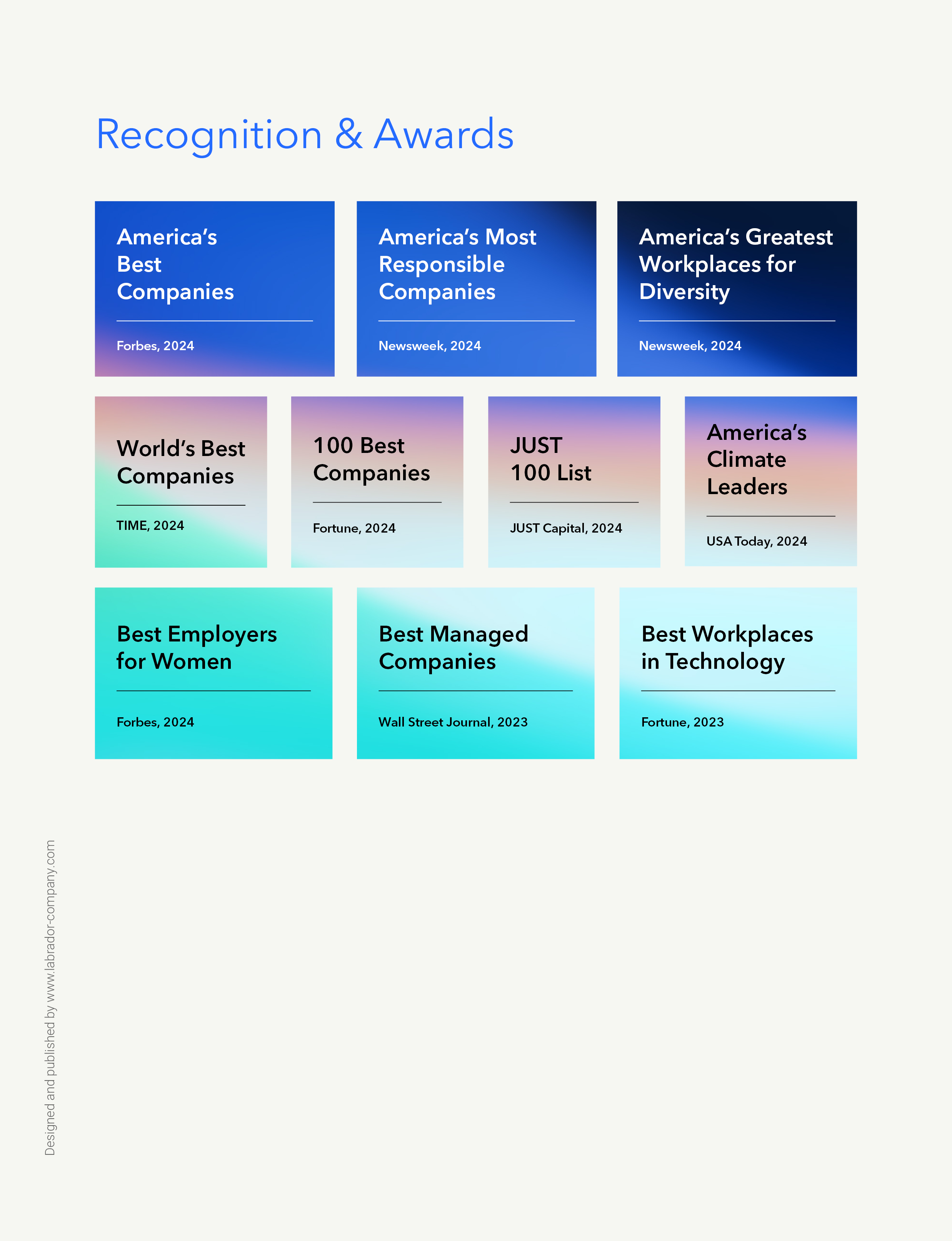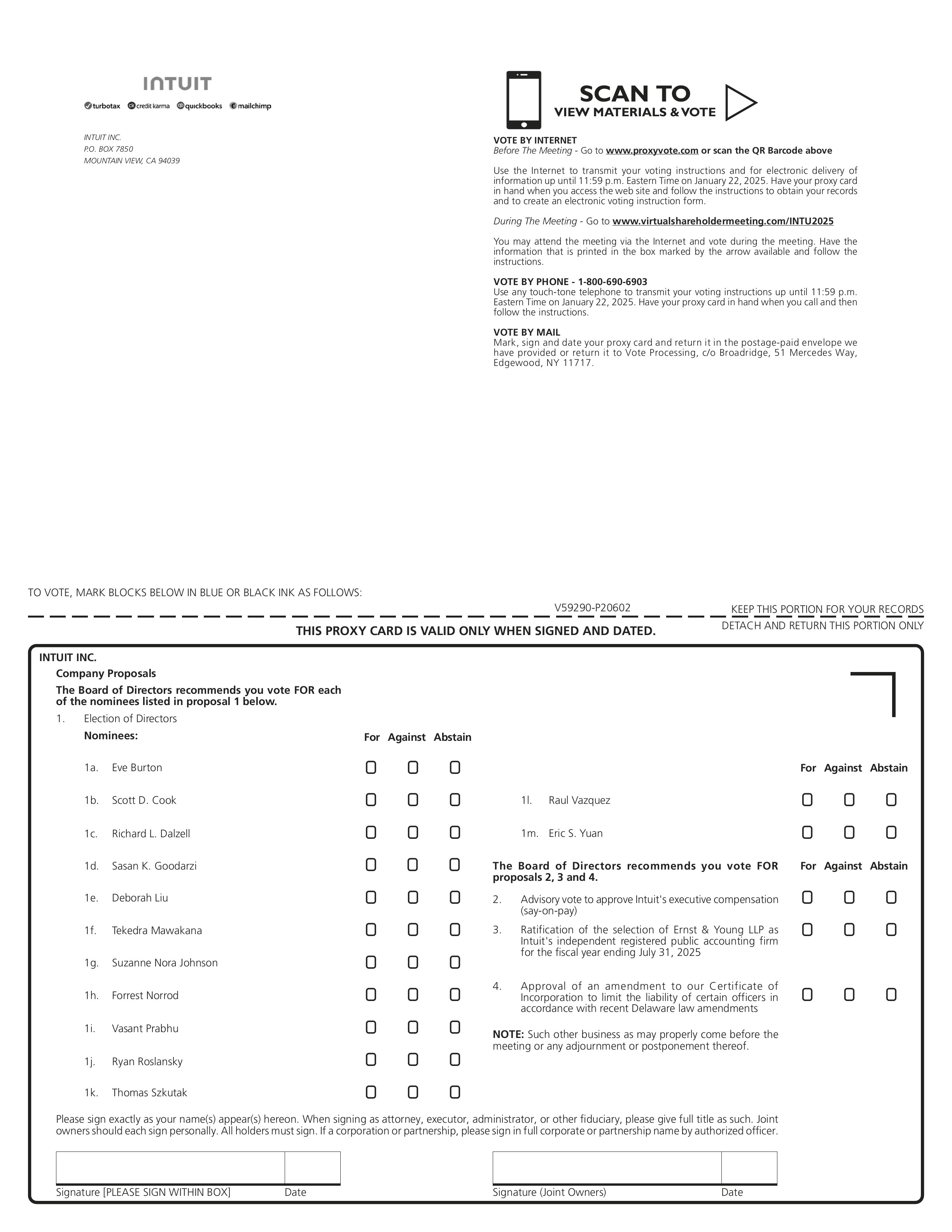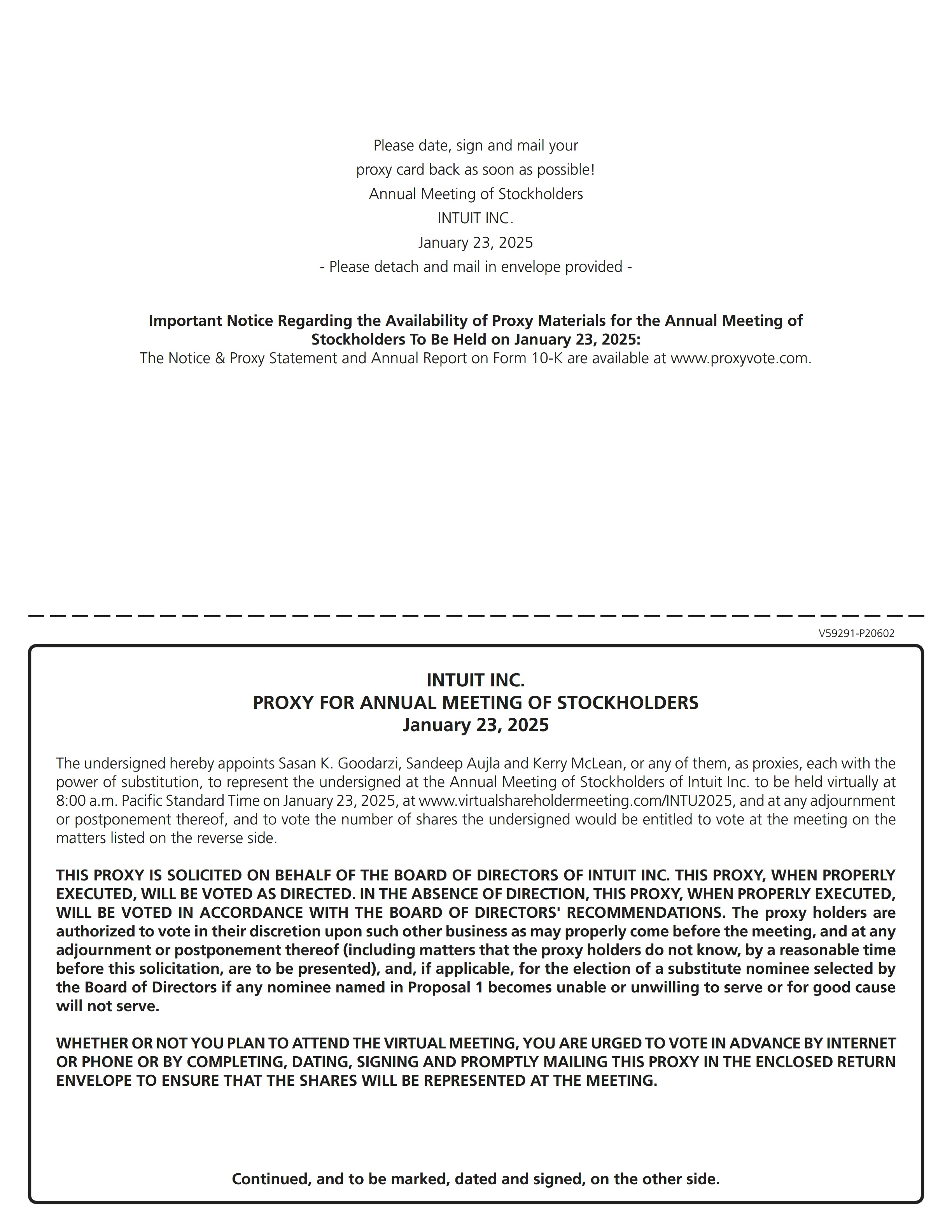DEF 14A: Definitive proxy statements
Published on November 27, 2024
UNITED STATES
SECURITIES AND EXCHANGE COMMISSION
Washington, D.C. 20549
SCHEDULE 14A INFORMATION
Proxy Statement Pursuant to Section 14(a) of the Securities Exchange Act of 1934
(Amendment No. )
Filed by the Registrant þ
Filed by a party other than the Registrant ¨
Check the appropriate box: | ||||||||
¨ |
Preliminary Proxy Statement |
|||||||
¨ |
Confidential, for Use of the Commission Only (as permitted by Rule 14a-6(e)(2)) |
|||||||
þ |
Definitive Proxy Statement |
|||||||
¨ |
Definitive Additional Materials |
|||||||
¨ |
Soliciting Material under § 240.14a-12 |
|||||||
(Name of Registrant as Specified In Its Charter)
(Name of Person(s) Filing Proxy Statement, if other than the Registrant)
Payment of Filing Fee (Check all boxes that apply):
þ |
No fee required. | |||||||||||||
¨ |
Fee paid previously with preliminary materials. | |||||||||||||
¨ |
Fee computed on table in exhibit required by Item 25(b) per Exchange Act Rules 14a-6(i)(1) and 0-11. | |||||||||||||
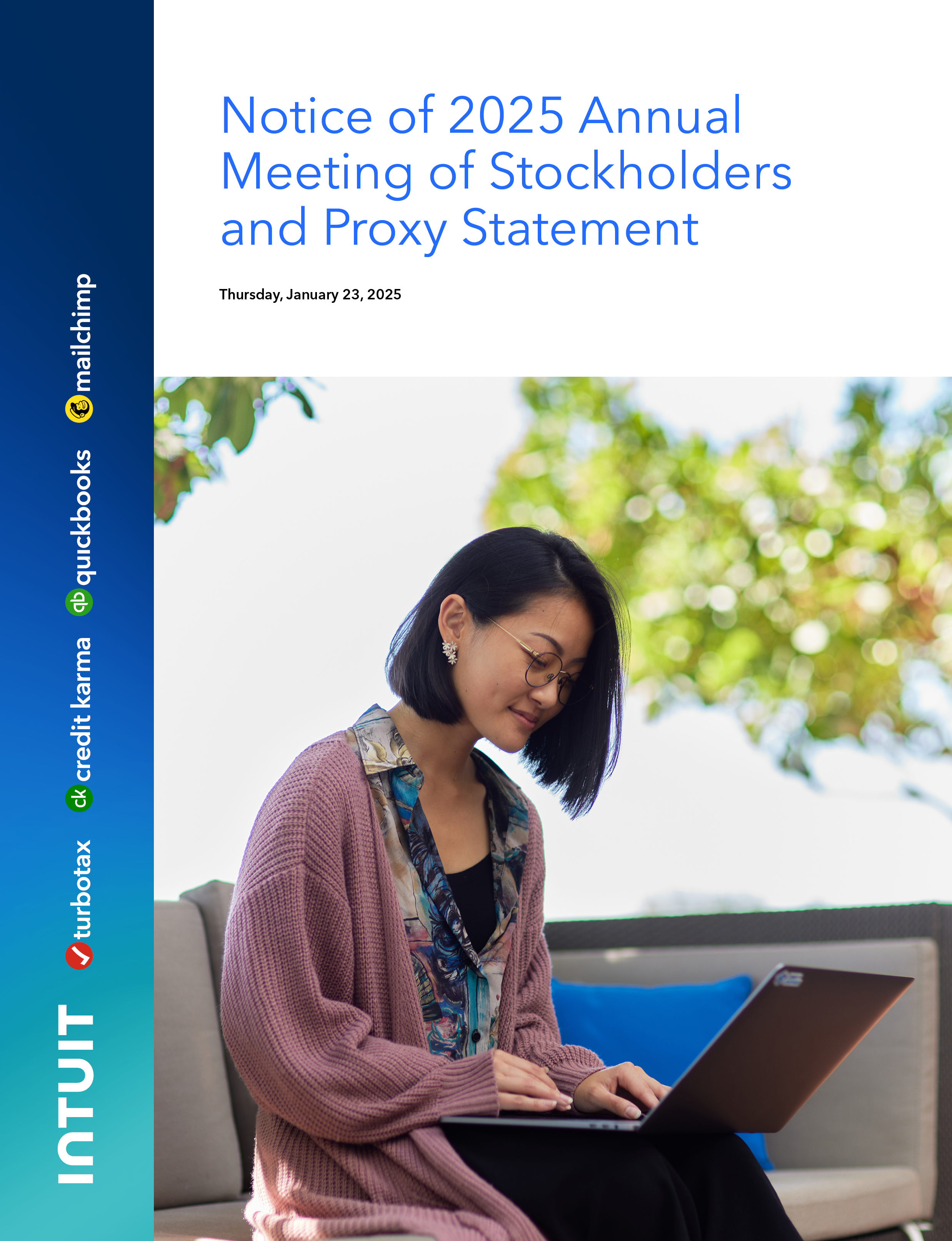
MISSION |
 Powering Prosperity Around the World
|
||||
VALUES |
Integrity Without Compromise |
Courage |
Customer Obsession |
Stronger Together |
We Care and Give Back |
||||||||||||
|
BOLD 2030
GOALS
|
Prosperity
Double household savings rate and improve business success rate >20 points versus industry
|
Reputation
Best-in-class Most Trusted Company
|
Growth
200M+ customers and accelerating revenue growth
|
||||||||
|
TRUE
NORTH
GOALS
|
Employees
Empower the world's top talent to do the best work of their lives
|
Customers
Delight customers by solving the problems that matter most
|
Communities
Make a difference in the communities we serve
|
Shareholders
Drive long-term growth, increasing shareholder value
|
||||||||||
STRATEGY |
Al-Driven Expert Platform
More Money. No Work. Complete Confidence.
|
||||
BIG BETS |
Revolutionize speed to benefit |
Connect people to experts |
Unlock smart money decisions |
Be the center of small business growth | Disrupt the mid-market |
||||||||||||
Notice of 2025 Annual Meeting of Stockholders
Agenda and Board Recommendations
0 
|
DATE AND TIME
Thursday, January 23, 2025
8:00 a.m. Pacific Standard Time
|
||||||||||||||||||||||
| 1 | Election of 13 directors |
FOR
(all nominees)
|
|||||||||||||||||||||

|
LOCATION
Live audio webcast
www.virtualshareholdermeeting.com/INTU2025
|
||||||||||||||||||||||
| 2 | Advisory vote to approve Intuit’s executive compensation (say on-pay) |
FOR
|
|||||||||||||||||||||
| 3 | Ratification of selection of Ernst & Young LLP as Intuit’s independent registered public accounting firm |
FOR
|
|||||||||||||||||||||

|
RECORD DATE
November 25, 2024
|
||||||||||||||||||||||
| 4 | Approval of an amendment to our Certificate of Incorporation to limit the liability of certain officers in accordance with recent Delaware law amendments |
FOR
|
|||||||||||||||||||||
|
How to Vote
Online at the Meeting: Attend the Meeting virtually at www.virtualshareholdermeeting.com/INTU2025 and follow the instructions on the website
Online Before the Meeting: Visit www.proxyvote.com

Mail: Sign, date, and return your proxy card in the enclosed envelope
Telephone: Call the telephone number on your proxy card
Note for Street-Name Holders: If you hold your shares through a broker, bank or other nominee, you must instruct your nominee how to vote the shares held in your account. The nominee will give you a Notice of Internet Availability or voting instruction form. If you do not provide voting instructions, your nominee will not be permitted to vote on certain proposals and may elect not to vote on any of the proposals. Voting your shares will help to ensure that your interests are represented at the Meeting.
|
|||||||||||||||||||||||
|
We also will consider any other matters that may properly be brought before the 2025 Annual Meeting of Stockholders (“Meeting”) (and any postponements or adjournments of the Meeting). As of the date of this proxy statement, we have not received notice of any such matters.
Annual Meeting of Stockholders
Thursday, January 23, 2025
8:00 a.m. Pacific Standard Time
We invite you to attend the Meeting of Intuit Inc. The Meeting will be conducted virtually via live audio webcast. There will not be a physical location for our Meeting. To attend, vote or submit questions, stockholders of record should go to www.virtualshareholdermeeting.com/INTU2025 and log in using the control number on their Notice of Internet Availability or proxy card. Beneficial owners of shares held by a broker, bank or other nominee (“street-name holders”) should review these proxy materials and their Notice of Internet Availability or voting instruction form for how to vote in advance of and participate in the Meeting. We encourage you to join the Meeting 15 minutes before the start time.
A recording of the webcast will be available on our investor relations website for at least 60 days following the Meeting.
Stockholders at the close of business on November 25, 2024, are entitled to receive notice of, and to vote at, the Meeting and any and all adjournments, continuations or postponements thereof. If we experience a technical malfunction or other situation that the Meeting chair determines may affect our ability to satisfy the requirements for a virtual meeting of stockholders under the Delaware General Corporation Law, or that otherwise makes it advisable to adjourn the Meeting, the Chair of the Meeting will convene the Meeting at 9:00 a.m. Pacific Standard Time on January 23, 2025, and at our principal executive offices, solely for the purpose of adjourning the Meeting to reconvene at a date, time and physical or virtual location to be announced. If we adjourn the Meeting, we will post information regarding the rescheduled Meeting on the investor relations section of our website at investors.intuit.com.
Your vote is important. Please vote as promptly as possible.
Important Notice Regarding the Availability of Proxy Materials for the Annual Meeting of Stockholders to Be Held on January 23, 2025: Both the proxy statement and Intuit’s Annual Report on Form 10-K for the fiscal year ended July 31, 2024, are available electronically at https://investors.intuit.com/sec-filings and www.proxyvote.com.
This Notice of Annual Meeting, the Internet Availability of Proxy Materials and the Proxy Statement and Annual Report on Form 10-K of Intuit are being distributed or made available, as the case may be, on or about November 27, 2024.
By order of the Board of Directors,
 Kerry J. McLean
Executive Vice President, General Counsel and Corporate Secretary
Mountain View, California
November 27, 2024
|
|||||||||||||||||||||||
A Letter to Our Stockholders | ||||||||
a 
|
November 27, 2024
Dear fellow Intuit stockholders:
Artificial Intelligence (AI) is changing the world at an incredible pace and igniting innovation across all sectors. Soon, everything we do will be powered by AI, from buying groceries and driving cars, to getting medical care and completing work tasks. The impact of AI on our financial lives will also be transformative—and it's already changing how Intuit serves customers, enabling them to make more money with less work and have complete confidence in every financial decision they make.
Intuit is at a critical moment in our history. We have consistently disrupted and reinvented ourselves, evolving Intuit’s strategy to be a global AI-driven expert platform. We bet early on AI, and today our scale of data and AI capabilities, network of experts, and robust ecosystem of products and services are Intuit’s unique advantage. With the introduction of generative AI (GenAI), we’re transforming how we serve our customers, delivering done-for-you experiences where we do the hard work for them and provide access to AI-powered expertise to fuel their success. Our strong performance in FY24 reflects Intuit’s transformation from a tax and accounting company to a global financial technology platform that’s driving durable growth at scale. We grew full-year revenue 13%, demonstrating that our strategy and five Big Bets are solving our customers’ biggest problems and delivering on our mission to power prosperity around the world.
Intuit is in a position of strength; we have the strategy and momentum we need to succeed. We’re accelerating innovation and investments in the areas that are most important to our future success. By bringing professional-grade experiences to small businesses and expanding our mid-market offerings to serve larger and more complex businesses, we are creating significant new growth opportunities for Intuit. We’re delivering a seamless, connected consumer financial platform that customers can benefit from year-round, not just at tax time. And we’re extending our relationships and engagement across product lines to better serve customers and scale our penetration of key growth segments.
At Intuit, we believe everyone deserves the opportunity to prosper and we hold ourselves accountable by setting measurable True North Goals. We provide economic opportunities to underserved communities through our job creation and job readiness initiatives. We continue to invest in opportunities to make a positive impact on climate for the communities we serve. And we’re proud of our commitment and progress over time to attract, retain, and develop a workforce that reflects the diversity of our customers.
Every day, our more than 18,000 global employees bring a passion for solving the problems that matter most to our customers. With a massive runway ahead, there’s no limit to how far we’ll go.
 Sasan K. Goodarzi
President and Chief Executive Officer
Intuit Inc. |
|||||||
Table of Contents
A-1 |
|||||||||||
All statements made in this document, other than statements of historical or current facts, are forward-looking statements within the meaning of the Private Securities Litigation Reform Act of 1995. Forward-looking statements in this document address our plans and goals, including those relating to our strategies, plans, and progress regarding our climate, workforce diversity, job creation, and job readiness initiatives. The fact that we included such information does not indicate that these contents are necessarily material to investors or required to be disclosed in our filings with the Securities and Exchange Commission. We use words such as “anticipates,” “believes,” “expects,” “future,” “potential,” “intends,” “design,” “will,” “may,” “can,” “should” and similar expressions to identify forward-looking statements. Forward-looking statements are based on management’s current expectations and assumptions that are subject to change in the future. In addition, forward-looking sustainability-related statements may be based on standards for measuring progress that are still developing and internal controls and processes that continue to evolve. Actual results could differ materially for a variety of reasons. Risks and uncertainties that could cause our actual results to differ significantly from management’s expectations are described in our Annual Report on Form 10-K for the fiscal year ended July 31, 2024. Except as may be required by law, we undertake no obligation to update any forward-looking statements, whether because of new information, future events, or otherwise.
Website references throughout this document are provided for convenience only, and the content on the referenced websites is not incorporated by reference into this document.
Proxy Summary
Intuit at a Glance
Intuit helps consumers and small and mid-market businesses prosper by delivering financial management, compliance, and marketing products and services. We also provide specialized tax products to accounting professionals, who are key partners that help us serve small and mid-market business customers. Across our platform, we use the power of data and artificial intelligence (“AI”) to deliver three core benefits to our customers: helping put more money in their pockets, saving them time by eliminating work, and ensuring that they have complete confidence in every financial decision they make. Our global financial technology platform includes TurboTax, Credit Karma, QuickBooks, and Mailchimp.
Fiscal 2024 Performance Highlights
We delivered strong results in fiscal 2024. Key highlights include the following.
|
Total
revenue
|
Combined platform revenue |
GAAP operating income |
GAAP diluted EPS
$10.43
up 24% from $8.42 in FY23
|
||||||||||||||||||||||||||||||||
|
$16.3 billion
up 13% from FY23
Global Business Solutions Group up 19% from FY23
with Online Ecosystem up 20% from FY23
Consumer Group up 7% from FY23
Credit Karma up 5% from FY23
|
$12.5 billion
up 14% from FY23 includes Global Business Solutions Group Online Ecosystem, TurboTax Online, and Credit Karma
|
$3.6 billion up 16% from FY23
|
|||||||||||||||||||||||||||||||||
|
Repurchased
$2.0 billion of shares and increased dividend 15% to $3.60 per share
|
Non-GAAP operating income
$6.4 billion
up 16% from FY23
|
Non-GAAP diluted EPS
$16.94 up 18% from $14.40 in FY23
|
|||||||||||||||||||||||||||||||||
See Appendix A to this proxy statement for information regarding non-GAAP financial measures, including a reconciliation of non-GAAP financial measures to the most directly comparable GAAP financial measures.
On August 1, 2024, we renamed our Small Business & Self-Employed segment as the Global Business Solutions segment. This segment continues to serve small and mid-market businesses.
INTUIT’S FINANCIAL PRINCIPLES |
||||||||||||||||||||||||||||||||||||||
Intuit has a track record of disciplined capital allocation and shareholder returns driven by the following financial principles. |
||||||||||||||||||||||||||||||||||||||
| Grow organic revenue double digits | Operating income dollars grow faster than revenue | Deploy cash to the highest-yield opportunities | Return excess cash to shareholders via dividend and share repurchase | Maintain a strong balance sheet | ||||||||||||||||||||||||||||||||||
Proxy Summary |
INTUIT 2025 Proxy Statement
|
1 |
||||||
Our Big Bets
Intuit is a global financial technology platform with a mission to power prosperity around the world. Our platform helps consumers and small and mid-market businesses prosper by delivering financial management, compliance, and marketing products and services. We also provide specialized tax products to accounting professionals.
Across our platform, we use the power of data and AI to deliver three core benefits to our customers: helping put more money in their pockets, saving them time by eliminating work, and ensuring that they have complete confidence in every financial decision they make. We help consumers do their taxes with ease and confidence, understand their financial picture, build credit, save more to make ends meet, get their largest tax refund, pay off debt, and receive personalized suggestions on how to grow their money. We help small and mid-market businesses grow and run their business all in one place, including bookkeeping, getting paid, accessing capital, paying employees, getting and retaining customers, and managing their customer relationships. We do this through our global AI-driven expert platform strategy and our offerings, including TurboTax, Credit Karma, QuickBooks, and Mailchimp. As we execute our global AI-driven expert platform strategy, we prioritize resources on our five Big Bets across the company. These priorities focus on solving the problems that matter most to customers.
| 1 | Revolutionizing speed to benefit |
||||||||||
When customers use our products and services, we use the power of AI to deliver value instantly and aim to make interactions with our offerings frictionless, without the need for customers to manually enter data. We are accelerating the application of AI to deliver breakthrough “done for you” innovations to customers. This priority is foundational across our business, and execution against it positions us to succeed with our other four strategic priorities. |
|||||||||||
| 2 | Connecting people to experts |
||||||||||
The largest problem our customers face is lack of confidence to file their own taxes or to manage their books. To build their confidence, we connect our customers to experts. We offer customers access to experts to help them make important decisions — and experts, such as accountants, gain access to new customers so they can grow their businesses. We are also expanding our virtual expert network and broadening the segments we serve beyond tax and accounting, to play a more meaningful role in our customers’ financial lives. |
|||||||||||
| 3 | Unlocking smart money decisions |
||||||||||
To address the challenges of high-cost debt and lack of savings, we are creating a comprehensive, self-driving financial platform with Credit Karma that propels our members forward wherever they are on their financial journey, so they can understand their financial picture, make smart financial decisions, and stick to their financial plan in the near and long term. |
|||||||||||
| 4 | Being the center of small business growth |
||||||||||
Globally, we are focused on helping customers grow their businesses by offering a broad, seamless set of tools that are designed to help them get and retain customers, get paid faster, manage and get access to capital, pay employees with confidence, and use third-party apps to help run their businesses. Our money solutions enable customers to manage their money end-to-end and improve cash flow. This is an important driver to improving the success rate of our small and mid-market business customers. |
|||||||||||
| 5 | Disrupting the mid-market |
||||||||||
We aim to disrupt the mid-market with a tailor-made platform for business, which includes our QuickBooks offerings, as well as our workforce solutions and money offerings. These solutions are designed to address the more complex needs of larger mid-market businesses. Mailchimp’s marketing offerings enable mid-market businesses to digitally promote their business across email, social media, landing pages, ads, websites, and more, all from one place. These offerings enable us to increase retention of these larger customers and accelerate mid-market demand. |
|||||||||||
We believe our Big Bets enable us to deliver a QuickBooks and Mailchimp platform that serves as the source of truth for small and mid-market business customers, providing end-to-end solutions to increase their revenue and profitability, fueling their business success. For consumers, we're creating seamless, end-to-end experiences that customers benefit from year-round with TurboTax and Credit Karma, helping them make ends meet, maximize their tax refund, save more, pay off debt, and take steps to improve their financial health year-round.
As the external environment evolves, we continue to innovate and adapt our strategy and anticipate our customers’ needs. For more than 40 years, we have been dedicated to developing innovative solutions that are designed to solve our customers' most important financial problems. At Intuit, we believe that everyone should have the opportunity to prosper, and we never stop working to find new, innovative ways to make that possible.
2 |
INTUIT 2025 Proxy Statement
|
Proxy Summary |
||||||
True North Goals Highlights
At Intuit, a way we hold ourselves accountable to our mission to power prosperity around the world is to set measurable True North Goals to deliver for our employees, customers, communities, and shareholders. We set ambitious True North Goals to deliver for the communities we serve through job creation, job readiness and sustainability initiatives. We also set True North Goals to help us attract, retain, and develop a workforce that reflects the diversity of our customers. A summary of our progress in fiscal 2024 is below.
 |
Job Creation and Readiness |  |
Positive Impact on Climate |  |
Diversity, Equity and Inclusion | |||||||||||||||||||||||||||||||||||||||||||||
|
• Over 4.7 million students better prepared for jobs and their financial futures since fiscal 2020, exceeding our fiscal 2024 goal
•Supported approximately 18,200 seasonal and year-round jobs in underserved communities, which generated $202 million of economic impact to underserved communities since 2016 through our Prosperity Hub Program
|
•Committed to reach net-zero greenhouse gas emissions across our operations and supply chain by fiscal 2040
•Helped reduce carbon emissions in communities, many of which are underserved, by 611,000 metric tonnes (since fiscal 2020), exceeding our fiscal 2024 Climate Positive program goal
|
•Maintained industry-leading representation of women in our global technology roles and steadily increased the percentage of our U.S. workers from underrepresented racial groups, but fell short of our ambitious fiscal 2024 goals
•Perform pay equity analyses twice a year using an independent third party to ensure our compensation is fair and equitable across gender, race and ethnicity
|
||||||||||||||||||||||||||||||||||||||||||||||||
Stockholder Engagement
We regularly assess our corporate governance and compensation practices. As part of this assessment, we proactively engage with our stockholders to ensure their perspectives are considered by the Board.
| We invited shareholders representing approximately | We met with shareholders representing approximately |
|||||||

|

|

|
||||||
Since our 2024 Annual Meeting, we invited the holders of approximately 53%* of our shares to meet with us to discuss, among other things, our corporate governance, executive compensation practices and environmental, social and governance progress. |
Investors holding approximately 31%* of our outstanding shares accepted the invitation to meet with our management team to discuss these important matters. |
|||||||
*As of September 30, 2024 |
||||||||
For more about our stockholder engagement and the topics discussed, see page 20 of this proxy statement.
Proxy Summary |
INTUIT 2025 Proxy Statement
|
3 |
||||||
Stockholder Value Delivered
The graph below compares the cumulative total stockholder return (“TSR”) on Intuit common stock for the last five full fiscal years with the cumulative total returns on the S&P 500 Index and the Morgan Stanley Technology Index for the same period.
The graph assumes that $100 was invested in Intuit common stock and in each of the other indices on July 31, 2019, and that all dividends were reinvested. The comparisons in the graph below are based on historical data – with Intuit common stock prices based on the closing price on the dates indicated – and are not intended to forecast the possible future performance of Intuit’s common stock.
Comparison of 5 Year Cumulative Total Return*
Among Intuit Inc., the S&P 500 Index, and Morgan Stanley Technology Index
Among Intuit Inc., the S&P 500 Index, and Morgan Stanley Technology Index

 |
Intuit Inc. |  |
S&P 500 |  |
Morgan Stanley Technology Index | ||||||||||||
* $100 invested on 7/31/19 in stock or index, including reinvestment of dividends. Fiscal year ending July 31.
Copyright © 2024 Standard and Poor’s, a division of S&P Global. All rights reserved.
4 |
INTUIT 2025 Proxy Statement
|
Proxy Summary |
||||||
Voting Roadmap
SUMMARY OF PROPOSAL 1 |
||||||||||||||||||||
|
Election of Directors
The Board currently consists of 13 directors, all of whom are standing for election to the Board at the Meeting. The nominees bring a wealth of diverse experience and proven leadership across a range of industries. The slate of nominees reflects a balance between Intuit’s commitment to thoughtful Board refreshment and the value of the experience that our longer-tenured directors bring.
|
||||||||||||||||||||

|
The Board recommends that you vote FOR the election of each of the director nominees.
|
|||||||||||||||||||
Board Highlights
Board Diversity
The following charts reflect the tenure, age, gender, and self-identified race/ethnicity of our director nominees.
Tenure
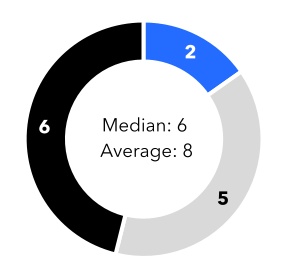

|
11+ Yrs |
||||

|
6-10 Yrs |
||||

|
0-5 Yrs |
||||
Age
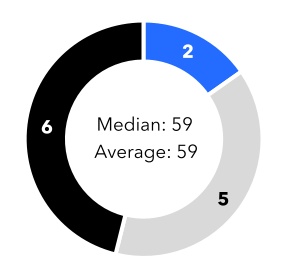

|
≤50 |
||||

|
51-60 |
||||

|
61+ |
||||
Gender


|
Women | ||||

|
Men | ||||
Race/Ethnicity


|
Diverse(1)
|
||||

|
Other | ||||
(1)As self-identified, Mr. Goodarzi is Middle Eastern, Ms. Liu is Asian, Ms. Mawakana is Black/African American, Mr. Prabhu is Asian, Mr. Vazquez is Latino/Hispanic, and Mr. Yuan is Asian.
Proxy Summary |
INTUIT 2025 Proxy Statement
|
5 |
||||||
Director Nominees | ||||||||||||||||||||||||||
The following table provides summary information about each director nominee. |

|
Independent Director Nominee |
||||||||||||||||||||||||

|
Eve Burton, 66
Executive Vice President and Chief Legal Officer, The Hearst Corporation
|

|
Scott D. Cook, 72
Founder, Intuit Inc.
|

|
Richard L. Dalzell, 67
Former Senior Vice President and Chief Information Officer, Amazon.com, Inc.
|
|||||||||||||||||||||
|
Director Since: 2016
Other Public Company Boards: 0
Committees: ARC, NGC (Chair)
|
Director Since: 1984
Other Public Company Boards: 0
Committees: None
|
Director Since: 2015
Other Public Company Boards: 0
Committees: AC (Chair), ARC
|
||||||||||||||||||||||||

|
Sasan K. Goodarzi, 56
President and Chief Executive Officer, Intuit Inc.
|

|
Deborah Liu, 48
President, Chief Executive Officer and Director, Ancestry.com LLC
|

|
Tekedra Mawakana, 53
Co-Chief Executive Officer and Director, Waymo LLC
|
|||||||||||||||||||||
|
Director Since: 2019
Other Public Company Boards: 1
Committees: None
|
Director Since: 2017
Other Public Company Boards: 0
Committees: AC, CODC
|
Director Since: 2020
Other Public Company Boards: 0
Committees: CODC, NGC
|
||||||||||||||||||||||||

|
Suzanne Nora Johnson, 67
Former Vice Chairman, The Goldman Sachs Group
|

|
NEW
Forrest Norrod, 59
Executive Vice President and General Manager of the Data Center Solutions Business Group, Advanced Micro Devices, Inc.
|

|
NEW
Vasant Prabhu, 64
Former Chief Financial Officer and Vice Chairman, Visa, Inc.
|
|||||||||||||||||||||
|
Independent Board Chair
Director Since: 2007
Other Public Company Boards: 1
Committees: CODC (Chair), NGC
|
||||||||||||||||||||||||||
|
Director Since: 2024
Other Public Company Boards: 0
Committees: AC, ARC
|
Director Since: 2024
Other Public Company Boards: 2
Committees: AC, ARC
|
|||||||||||||||||||||||||

|
Ryan Roslansky, 46
Chief Executive Officer, LinkedIn Corporation
|

|
Thomas Szkutak, 63
Former Senior Vice President and Chief Financial Officer, Amazon.com, Inc.
|

|
Raul Vazquez, 53
Chief Executive Officer and Director, Oportun Financial Corporation
|
|||||||||||||||||||||
|
Director Since: 2023
Other Public Company Boards: 0
Committees: AC, CODC
|
Director Since: 2018
Other Public Company Boards: 0
Committees: ARC (Chair), NGC
|
Director Since: 2016
Other Public Company Boards: 1
Committees: AC, ARC
|
||||||||||||||||||||||||

|
Eric S. Yuan, 54
Chief Executive Officer and Director, Zoom Video Communications, Inc.
|
Number of meetings in fiscal 2024 |
||||||||||||||||||||||||
| 4 | AC |
Acquisition Committee |
||||||||||||||||||||||||
| 9 | ARC |
Audit and Risk Committee |
||||||||||||||||||||||||
|
Director Since: 2023
Other Public Company Boards: 1
Committees: ARC, NGC
|
6 | CODC |
Compensation and Organizational Development Committee |
|||||||||||||||||||||||
| 4 | NGC |
Nominating and Governance Committee |
||||||||||||||||||||||||
6 |
INTUIT 2025 Proxy Statement
|
Proxy Summary |
||||||
Board Skills and Expertise
Our Board is committed to excellence in its governance practices, including with respect to the Board’s composition. The Board and its Nominating and Governance Committee believe that a diverse and experienced board is important for reaching sound decisions that drive stockholder value. Our Board has undergone significant refreshment in recent years to include a diversity of backgrounds, perspectives, and skill sets. In the past year, our Board has appointed two new directors, Vasant Prabhu and Forrest Norrod. Mr. Prabhu is the former CFO and Vice Chairman of Visa Inc., a global digital payments company, and is recognized for his strong financial acumen and deep expertise in financial services innovation, building a global technology and payments platform, and scaling businesses internationally, which the Board believes will be helpful in guiding Intuit's next chapter of growth. Mr. Norrod is the Executive Vice President and General Manager of the Data Center Solutions Business Group at Advanced Micro Devices, Inc., an adaptive computing company, where he has helped lead the company’s AI initiatives, driving the company’s data center growth and open AI ecosystem strategy. He brings to our Board deep experience in AI and data engineering, which are key skills to enhance the Board’s oversight of our strategy to be a global AI-driven expert platform. Our 13 director nominees represent a broad range of tenures, ages, genders, racial/ethnic backgrounds, expertise, and professional experience.
The following chart reflects the experience and expertise of the 13 director nominees for our Board. These are the skills and qualifications our Board considers important for our directors in light of our current business and structure.
 |
Customer domain expertise - consumer and small and mid-market
10 director nominees
|
 |
Go-to-market, digital marketing, partnerships and international expertise
13 director nominees
|
 |
Public company board experience (current and former)
12 director nominees
|
|||||||||||||||||||||||||||||||||
 |
Product domain expertise - SaaS, mobile, services and money innovation
11 director nominees
|
 |
Public policy/government relations
5 director nominees
|
 |
Financial acumen or expertise, including CEO/CFO or audit committee experience
13 director nominees
|
|||||||||||||||||||||||||||||||||
 |
Technology domain expertise - software development, cloud, data, AI, platform and cybersecurity
11 director nominees
|
 |
C-suite experience (current and former)
13 director nominees
|
 |
Proven business acumen, collaboration and industry engagement
13 director nominees
|
|||||||||||||||||||||||||||||||||
SUMMARY OF PROPOSAL 2 |
||||||||||||||||||||
|
Advisory Vote to Approve Executive Compensation (Say-on-Pay)
In accordance with Section 14A of the Securities Exchange Act of 1934 (the “Exchange Act”), we are asking stockholders to vote, on an advisory basis, to approve Intuit’s executive compensation for our Named Executive Officers (“NEOs”).
|
||||||||||||||||||||

|
The Board recommends that you vote FOR approval, on an advisory basis, of the compensation of our NEOs.
|
|||||||||||||||||||
Proxy Summary |
INTUIT 2025 Proxy Statement
|
7 |
||||||
Executive Compensation Highlights
Performance-based Payouts
Our executive compensation programs are designed to reward both short- and long-term growth in the revenue and profitability of our business, TSR that compares favorably to the TSR of certain peer companies, and progress on goals to deliver for our True North stakeholders, including environmental, social, and governance (“ESG”) goals. As shown below, the vast majority of fiscal 2024 compensation for our NEOs was performance-based.
CEO Total Direct Compensation(1)
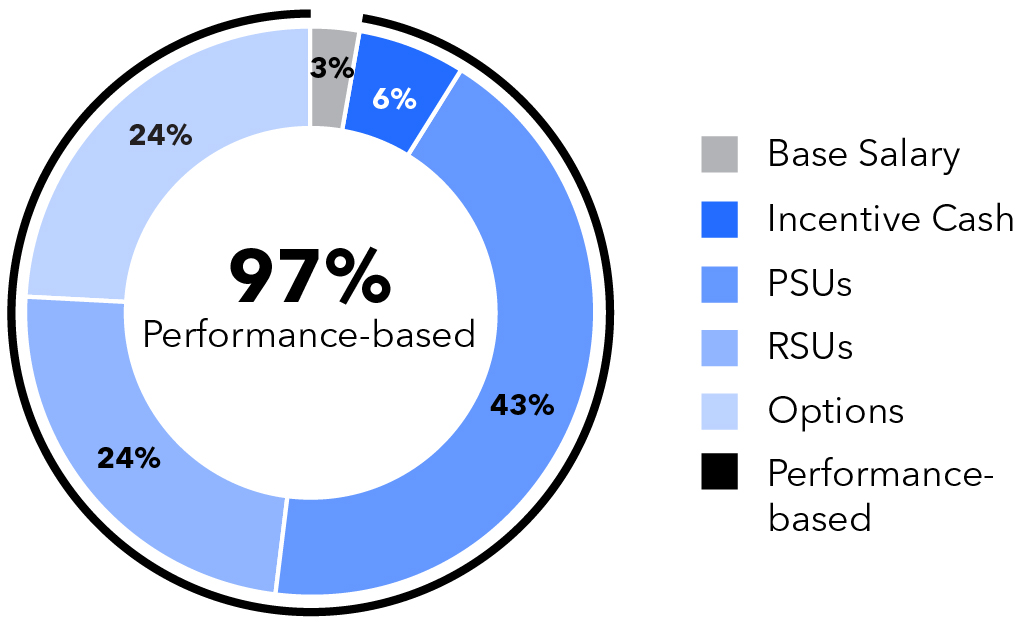
Other NEOs Total Direct Compensation(1)
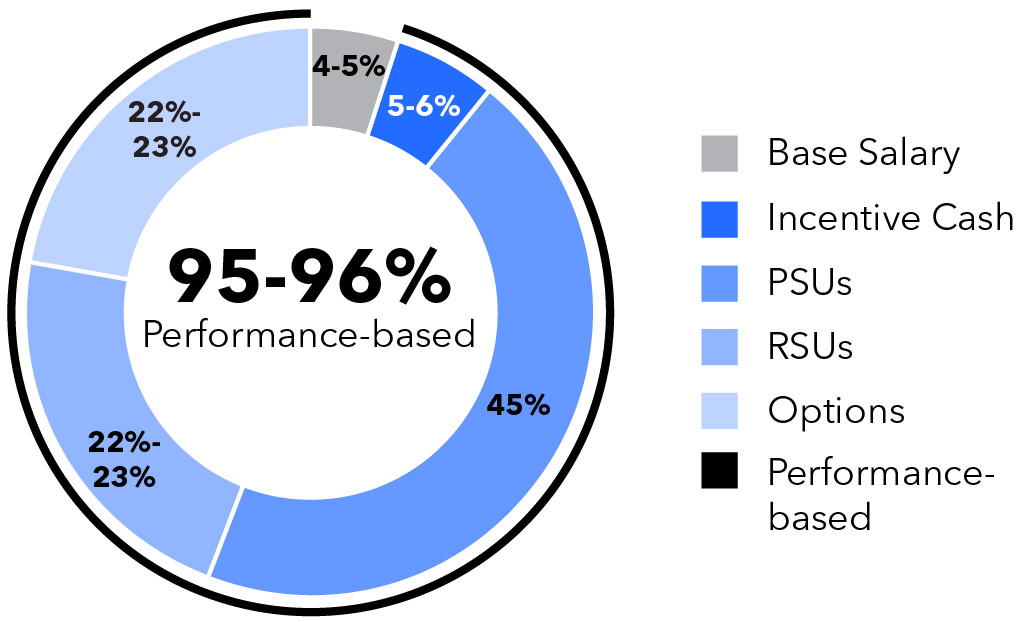
(1)Total direct compensation reflects base salary, actual bonus payout, and equity awards granted during fiscal 2024. Consistent with disclosure in the Fiscal Year 2024 Summary Compensation Table, equity awards are reported at grant date fair value (which, for the PSUs, is based on the probable outcome of achievement of the performance goals using a widely accepted probability model), and salary and incentive cash are reported based on the actual amounts earned with respect to fiscal 2024.
Consistent with our compensation objectives, our NEOs were provided the following base salaries, cash incentives, and equity incentives in fiscal 2024:
Long-Term Equity Incentives |
|||||||||||||||||||||||
| Name and Position | Salary ($) |
Cash Incentive ($) |
Option
Awards
($)
|
RSUs
($)
|
PSUs ($) |
Total ($) |
|||||||||||||||||
|
Sasan K. Goodarzi
President and Chief Executive Officer
|
1,200,000 | 2,280,000 | 8,650,027 | 8,650,106 | 15,597,283 | 36,377,416 | |||||||||||||||||
|
Sandeep S. Aujla
Executive Vice President and Chief Financial Officer
|
770,000 | 877,800 | 3,500,057 | 3,500,503 | 7,000,351 | 15,648,711 | |||||||||||||||||
|
Laura A. Fennell
Executive Vice President and Chief People & Places Officer
|
770,000 | 877,800 | 3,500,057 | 3,500,503 | 7,000,351 | 15,648,711 | |||||||||||||||||
|
Mark Notarainni
Executive Vice President and General Manager, Consumer Group
|
725,000 | 688,750 | 3,375,055 | 3,375,238 | 6,750,201 | 14,914,244 | |||||||||||||||||
|
Marianna Tessel
Executive Vice President and General Manager, Global Business Solutions Group
|
770,000 | 877,800 | 4,125,067 | 4,125,570 | 8,250,460 | 18,148,897 | |||||||||||||||||
The table above excludes the grant date fair value of matching restricted stock units (“RSUs”) granted to executive officers under the Management Stock Purchase Program. It also excludes certain items that are reflected as “All Other Compensation” in the Fiscal Year 2024 Summary Compensation Table. These items are not typically considered in the Compensation and Organizational Development Committee’s (“Compensation Committee”) deliberations regarding annual compensation for our senior executives because (i) the amounts are non-recurring, not material, or not considered to be core elements of compensation by the committee, or (ii) the benefits are available to a large group of employees. For a complete discussion of our executive compensation program, see Compensation Discussion and Analysis and the Executive Compensation Tables below.
8 |
INTUIT 2025 Proxy Statement
|
Proxy Summary |
||||||
SUMMARY OF PROPOSAL 3 |
||||||||||||||||||||
|
Ratification of Selection of Ernst & Young LLP as Intuit’s Independent Registered Public Accounting Firm
The Audit and Risk Committee has selected Ernst & Young LLP as the independent registered public accounting firm to perform the audit of Intuit’s consolidated financial statements and the effectiveness of our internal control over financial reporting for the fiscal year ending July 31, 2025.
The Audit and Risk Committee made this selection based on Ernst & Young LLP’s independence, performance, and extensive knowledge of our business, controls, and processes.
|
||||||||||||||||||||

|
The Board recommends that you vote FOR the ratification of the selection of Ernst & Young LLP as our independent registered public accounting firm for the fiscal year ending July 31, 2025.
|
|||||||||||||||||||
SUMMARY OF PROPOSAL 4 |
||||||||||||||||||||
|
Approval of an Amendment to Our Certificate of Incorporation to Limit the Liability of Certain Officers in Accordance with Recent Delaware Law Amendments
Delaware recently enacted legislation allowing Delaware corporations to amend their certificates of incorporation to eliminate the monetary liability of certain officers for a breach of fiduciary duty under certain circumstances. We are seeking stockholder approval to amend our Certificate of Incorporation to provide this protection to certain officers and align officer protections with those of our directors, promoting better decision-making and long-term stockholder value. It would also enhance Intuit's ability to attract and retain top talent.
|
||||||||||||||||||||

|
The Board recommends that you vote FOR the proposal to amend our Certificate of Incorporation to limit the liability of certain officers in accordance with recent Delaware law amendments.
|
|||||||||||||||||||
Proxy Summary |
INTUIT 2025 Proxy Statement
|
9 |
||||||
Corporate Governance
Corporate Governance Practices
Intuit is committed to excellence in corporate governance. We maintain numerous policies and practices that demonstrate this commitment, including those summarized below.

|
Independence | 
|
Stockholder Engagement | |||||||||||||||||
|
•Independent Board Chair
•All non-employee directors are independent
•Independent directors meet regularly in executive session
•All members of the Board’s four standing committees are independent
•Commitment to Board refreshment, with two new independent directors added in the last fiscal year
|
•Long-standing, proactive and robust stockholder engagement program, including director participation
•Our bylaws provide stockholders with a proxy access right
•Stockholders may act by written consent
|
|||||||||||||||||||

|
Accountability | 
|
Alignment with Stockholder Interests | |||||||||||||||||
|
•Annual election of all directors and majority voting in uncontested elections
•Annual stockholder advisory vote to approve Named Executive Officer compensation
•Annual Board evaluation of CEO performance
•Cash bonuses and equity awards are subject to clawback
|
•Pay-for-performance executive compensation program
•Robust stock ownership requirements for senior executive officers and non-employee directors, including 10x salary for the CEO and 10x annual cash retainer for non-employee directors
•Prohibition against director and employee (including officer) hedging and pledging of Intuit stock
•Single class of stock with equal voting rights
|
|||||||||||||||||||

|
Board Practices | 
|
Ethics Practices | |||||||||||||||||
|
•Board Chair and CEO roles held by two different people
•Corporate Governance Principles that are publicly available and reviewed annually
•Board composition reflects diversity of gender, race, ethnicity, skills, tenure, and experience
•Director recruitment process requires a pool of candidates with a diversity of gender, race, and ethnicity, among other backgrounds and experiences
•Rigorous annual Board and committee self-evaluation process
•Annual review of management succession planning
•Regular review of cybersecurity and other significant risks to Intuit
|
•Code of Conduct & Ethics for employees that is monitored by Intuit’s ethics office and overseen by the General Counsel
•Code of Ethics that applies to all Board members
•Ethics hotline that is available to all employees as well as third parties
•Non-retaliation policy for reporting ethics concerns
•Audit and Risk Committee reviews complaints regarding accounting, internal accounting controls, auditing, and federal securities law matters
|
|||||||||||||||||||

|
Transparency and Responsibility | |||||||||||||
|
•Nominating and Governance Committee oversees corporate responsibility and reviews ESG matters
•Compensation and Organizational Development Committee oversees diversity, equity, and inclusion (“DEI”) initiatives in support of organizational development
•Annual stakeholder impact report (reporting under Global Reporting Initiative, Sustainability Accounting and Standards Board frameworks) and dedicated website disclosing ESG practices, including with respect to job creation and job readiness, positive impact on climate, and pay and promotion equity (https://www.intuit.com/company/corporate-responsibility/)
•DEI website disclosing DEI matters (https://www.intuit.com/company/diversity/)
•Detailed financial reporting and proxy statement disclosure designed to be clear and understandable
|
•Dedicated website disclosing responsible AI principles that guide how we operate and scale our AI-driven expert platform responsibly (https://www.intuit.com/privacy/responsible-ai/)
•Public disclosure of Corporate Governance Principles, Board Code of Ethics, Bylaws, Board committee charters, Code of Conduct & Ethics, EEO-1 forms, CDP climate questionnaires, corporate tax policy, global human rights policy, and other documents (https://investors.intuit.com/corporate-governance/governance-documents)
•Voluntary website disclosure regarding Intuit’s political expenditures, political accountability policy and positions on public policy issues that impact the way we serve our customers (https://investors.intuit.com/corporate-governance/political-accountability)
|
|||||||||||||
10 |
INTUIT 2025 Proxy Statement
|
Corporate Governance |
Corporate Governance Practices |
||||||||
Board Responsibilities and Structure
The Board’s Role
The Board oversees management’s performance on behalf of Intuit’s stockholders. The Board’s primary responsibilities include the following.
Monitor management’s performance to assess whether Intuit is operating in an effective, efficient, and ethical manner in order to create value for Intuit’s stockholders |
Periodically review Intuit’s long-range strategic plan, business initiatives, enterprise risk management, capital projects, and budget matters |
Oversee long-term succession planning, select the CEO, and determine CEO compensation |
||||||
Board’s Role in Strategy
Our Board recognizes the importance of designing our overall business strategy to create long-term, sustainable value for Intuit stockholders. As a result, the Board maintains an active oversight role in helping management formulate, plan, and implement Intuit’s strategy. Specifically, the Board has a robust annual strategic planning process that includes reviewing our business and financial plans, strategies, and near- and long-term initiatives. This annual process includes a full-day Board session to review Intuit’s overall strategy with our senior leadership team and quarterly meetings to review progress against that strategy. In addition, every year, the Board reviews Intuit’s three-year financial plan, which serves as the basis for the annual operating plan for the upcoming year.
The Board considers the progress of and challenges to Intuit’s strategy, as well as related risks, throughout the year. At each regularly scheduled Board meeting, the CEO has an executive session with the Board to discuss strategic and other significant business developments since the last meeting.
Board’s Oversight of Risk
The full Board regularly reviews Intuit’s significant risks, oversees our risk management program and delegates certain risk oversight responsibilities to Board committees. Management is responsible for balancing risk and opportunity in support of Intuit’s objectives, and carries out the daily processes, controls, and practices of our risk management program - many of which are embedded in our operations, including our disclosure controls and procedures.
Our Enterprise Risk Management (“ERM”) program is intended to review and address Intuit’s critical enterprise risks, including strategic, technology, financial, compliance and operational risks. Intuit’s Chief Compliance Officer, who reports to our General Counsel, facilitates the ERM program. As part of our ERM process, management annually identifies, assesses, prioritizes, and develops mitigation plans for Intuit’s top risks over short- and longer-term time horizons. These plans are reviewed annually with the full Board and the Audit and Risk Committee and, throughout the year, the standing committees of the Board review the risk management activities under their purview and report to the full Board as appropriate. From time to time, the Board, its committees or management consult with third-party advisors on particular risks.
Board Responsibilities and Structure |
Corporate Governance |
INTUIT 2025 Proxy Statement
|
11 |
||||||||
The Board and its Committees |
|||||||||||||||||||||||||||||||||||||||||
|
•The Board maintains direct oversight of our strategic risk exposure as part of its responsibility to oversee corporate strategy. The Board believes it currently benefits from review and discussion of this risk exposure among all directors and that this oversight role is appropriate given the collective breadth and depth of experience of our Board members.
•The Board regularly reviews and discusses significant risks with management, including through the annual strategic planning process and reviews of annual operating plans, financial performance, merger and acquisition opportunities, market environment updates, legal and regulatory developments, and presentations on specific risks.
•The Board also reviews reports from each committee regarding risk matters under its purview.
|
|||||||||||||||||||||||||||||||||||||||||
| Acquisition Committee | Audit and Risk Committee |
Compensation and Organizational Development Committee |
Nominating and Governance Committee |
||||||||||||||||||||||||||||||||||||||
|
Meetings in Fiscal 2024
4
|
Meetings in Fiscal 2024
9
|
Meetings in Fiscal 2024
6
|
Meetings in Fiscal 2024
4
|
||||||||||||||||||||||||||||||||||||||
|
Areas of Risk Oversight
•Reviews risks associated with Intuit’s acquisition, divestiture and strategic investment activities, and the strategy and business models of acquisition candidates
•Oversees the performance of Intuit’s completed acquisitions, divestitures and strategic investment transactions
|
Areas of Risk Oversight
•Has primary responsibility for overseeing our ERM program
•Receives a quarterly report from the Chief Compliance Officer on Intuit’s top risk areas and the progress of the ERM program
•Oversees particular risks, such as financial management, privacy, cybersecurity and fraud
•Annually reviews our ERM policies and processes, and from time to time separately reviews the Board’s approach to risk oversight
•Oversees our ethics and compliance programs, including our Code of Conduct & Ethics, the Board Code of Ethics, and responsible AI
•Oversees litigation risks
|
Areas of Risk Oversight
•Reviews risks associated with our compensation programs, policies and practices, both for executives in particular and for employees generally
•Assists the Board in its oversight of stockholder engagement on executive compensation matters
•Oversees succession planning and senior leadership development
•Oversees organizational development activities and human capital management, including management depth and strength assessment; leadership development; company-wide organization and talent assessment; employee recruitment, engagement and retention; workplace environment and culture; employee health and safety; DEI initiatives; and pay equity
|
Areas of Risk Oversight
•Reviews risks associated with corporate governance
•Oversees overall board effectiveness, including identifying and recruiting diverse members with appropriate skills, experience and characteristics
•Annually reviews and approves our Political Accountability Policy
•Oversees our corporate responsibility risks and practices and discusses with management periodic reports on the company’s (i) progress on ESG matters and (ii) communications with stockholders and other stakeholders regarding these matters
•Assists the Board in its oversight of our engagement with stockholders
|
||||||||||||||||||||||||||||||||||||||
|
Regular Reports From
•Chief Corporate Strategy & Development Officer
•General Counsel
•Other Senior Business Leaders
|
Regular Reports From
•Chief Financial Officer
•Chief Accounting Officer
•Chief Audit Executive
•Chief Information Security & Fraud Prevention Officer
•General Counsel
•Chief Compliance Officer
•Chief Data Officer
•Head of Investor Relations
•Other Senior Business Leaders
|
Regular Reports From
•Chief People & Places Officer
•Head of Total Rewards
•Chief Diversity, Equity & Inclusion Officer
•Head of Investor Relations
•General Counsel or Deputy General Counsel
•Other Senior Business Leaders
|
Regular Reports From
•Chief Corporate Affairs Officer
•Head of Corporate Responsibility
•Head of Investor Relations
•General Counsel or Deputy General Counsel
•Other Senior Business Leaders
|
||||||||||||||||||||||||||||||||||||||
12 |
INTUIT 2025 Proxy Statement
|
Corporate Governance |
Board Responsibilities and Structure |
||||||||
Oversight of Cybersecurity Risks |
|||||
Our full Board of Directors (“Board”) provides ultimate oversight for the cybersecurity program and has delegated to the Audit and Risk Committee primary oversight of cybersecurity risks. The Audit and Risk Committee receives regular, quarterly reports from our Chief Information Security and Fraud Prevention Officer (“CISO”) and a cross-functional cybersecurity, compliance, risk, and fraud team. These reports include cybersecurity and anti-fraud efforts, including updates, metrics, and trends, such as the status of prior security events, existing and emerging threat landscapes, the results of audits or assessments, fraud prevention efforts, vulnerability detection and disclosure changes, and the status of projects to strengthen our security systems and improve incident readiness, and how these may affect broader enterprise risk management. Under our incident response processes, the CISO, or other management, reports certain incidents to the Audit and Risk Committee or the full Board, as appropriate.
Oversight of Environmental, Social, and Governance Risks |
|||||
The Board has been highly engaged with management on the evolution of Intuit’s ESG practices and reporting. The Board oversees the assessment of ESG risks as part of the development of our overall long-term strategy. Given our cross-functional approach to ESG, ESG oversight responsibility is allocated across the Board’s committees based on their areas of expertise.
|
Compensation and Organizational Development Committee
Oversees our DEI initiatives in support of organizational development, including pay equity, and considers our True North Goals relating to workforce diversity in making executive compensation decisions
|
Nominating and Governance Committee
Oversees our corporate responsibility strategy and goals, including environmental, sustainability and social matters
|
Audit and Risk Committee
Oversees our cybersecurity and anti-fraud practices, as well as our disclosure practices relating to ESG
|
||||||
Oversight of AI Risks |
|||||
The Audit and Risk Committee oversees our compliance programs, including our responsible AI governance framework that supports how we responsibly develop, operate, and scale our AI-driven expert platform. This framework helps us to proactively identify and mitigate potential negative unintended consequences that could result from our AI systems. As part of this responsibility, the committee receives regular reports from the company’s cross-functional AI Governance Committee, the executive level committee that oversees the company’s deployment of AI across its offerings.
Oversight of Management Succession Planning |
|||||
The Board’s oversight of management succession planning is key to ensure the company’s continuing ability to solve the most pressing problems of its customers in the future. Our thoughtful and orderly approach to long-term leadership development and succession planning of management is overseen by our Compensation Committee and discussed by the full Board on at least an annual basis. This process includes discussions about the succession process and timeline, assessments of successor candidates for the CEO and other senior leadership positions, the leadership pipeline and development plans for the next generation of senior leadership, and organizational development. The Compensation Committee also oversees crisis succession plans.
Board Responsibilities and Structure |
Corporate Governance |
INTUIT 2025 Proxy Statement
|
13 |
||||||||
Board Leadership Structure
Each year, the Board reviews its leadership structure and determines whether, at the time, it is in the best interests of Intuit and our stockholders for the roles of Board Chair and CEO to be held by the same person or by different people. When the same person serves as both Board Chair and CEO, our Corporate Governance Principles require the independent directors to appoint a Lead Independent Director. When the roles are separated and the Board Chair is not independent, the independent directors may appoint a Lead Independent Director.
Currently, the roles of Board Chair and CEO are separated, and the Board Chair is an independent director. While separation of the Board Chair and CEO roles is not required under our bylaws or Corporate Governance Principles, the Board believes that at this time this leadership structure is appropriate for us and in the best interests of Intuit and our stockholders. In particular, the Board believes this structure provides an effective balance between strong company leadership and oversight by independent directors with expertise from outside the company, and enables Mr. Goodarzi to focus his attention on executing our business strategy and leading our operations.
In October 2024, Ms. Nora Johnson was re-appointed as Board Chair. At this time, the Board has determined that it is not necessary to appoint a Lead Independent Director given that Ms. Nora Johnson is an independent director.
| Role of the Board Chair | ||||||||

|
As Board Chair, Ms. Nora Johnson’s responsibilities include the following.
•Presiding at meetings of the Board, including executive sessions of the independent directors, which occur at least quarterly
•Approving the agenda for Board meetings (in consultation with the CEO) and the schedule for Board meetings to provide sufficient time for discussion of all agenda items
•Ensuring the Board receives adequate and timely information
•Conducting the annual board evaluation with an independent third-party at the direction of the Nominating and Governance Committee
•Being available for consultations and communications with stockholders as appropriate
•Calling executive sessions of the independent directors
•Facilitating the critical flow of information between the Board and senior management
•Calling special meetings of the Board and stockholders
|
|||||||
Board, Committee, and Annual Stockholder Meetings
The Board and its committees hold regular meetings throughout the year on a set schedule, and also hold special meetings and act by written consent from time to time, as appropriate. The Board held four meetings during fiscal 2024.
The Board expects that all directors will prepare for, attend and participate in all Board and applicable committee meetings, and will see that other commitments do not materially interfere with their service on the Board. During fiscal 2024, all current directors attended at least 75% of the aggregate number of meetings of the Board and the committees on which they served.
Our Corporate Governance Principles encourage all directors to attend our Annual Meeting of Stockholders. Nine of the 11 directors who were serving at the time of the 2024 Annual Meeting of Stockholders attended that meeting.
The Board regularly convenes executive sessions among all Board members, and at every regular Board meeting, the independent directors meet separately. | ||
14 |
INTUIT 2025 Proxy Statement
|
Corporate Governance |
Board Responsibilities and Structure |
||||||||
Director Orientation and Continuing Education
New directors receive orientation that includes written materials, briefings, and educational opportunities designed to permit them to become familiar with the company and enable them to better perform their duties. In addition, the Board receives periodic updates on regulatory and other developments relevant to the Board from management and outside experts. Board members are also encouraged to attend outside director education programs and we reimburse them for the associated costs and expenses.
Board Composition
Director Independence
To be considered independent under the Nasdaq rules, a director must meet several bright-line tests, including that the director is not, and for the last three years has not been, employed by Intuit and that neither the director nor any of his or her family members has engaged in certain types of business dealings with Intuit. The Nominating and Governance Committee and the full Board annually review relevant transactions, relationships and arrangements that may affect the independence of our Board members. As required by Nasdaq rules, the Board also makes a determination that, in its opinion, no relationship exists that would interfere with any independent director’s exercise of independent judgment in carrying out the responsibilities of a director. In making these determinations, the Board reviews and discusses information provided by the directors and by Intuit with regard to each director’s business and personal activities as they relate to Intuit, Intuit’s management and the Board.
The Board also considers the tenure of a director and whether the duration of service could impact the director’s independence from management, including the director’s engagement with management and the effectiveness of the director’s participation in Board and committee deliberations. The Board believes that a balanced mix of board tenure is effective in providing oversight and that our longer-serving directors with extensive relevant experience and institutional knowledge of Intuit bring critical skills to the boardroom. In particular, the Board believes that given the size of our company, the breadth of our offerings, and the increasing regulatory complexity that we face (in critical areas like financial services), our longer-tenured directors bring a deeper understanding of the company and the risks that we face.
Upon review of these relationships and other information provided by our director nominees, the Board determined that there are no relationships that would interfere with the exercise of independent judgment by Intuit’s independent directors in carrying out their responsibilities as directors, and that the following director nominees are independent: Ms. Burton, Mr. Dalzell, Ms. Liu, Ms. Mawakana, Ms. Nora Johnson, Mr. Norrod, Mr. Prabhu, Mr. Roslansky, Mr. Szkutak, Mr. Vazquez, and Mr. Yuan.
At each regularly scheduled meeting of the Board and its committees, independent Board members meet in closed session without any company management present. The independent Board members also meet to review the CEO’s performance evaluation and compensation decisions, at the direction of the Compensation Committee.
Qualifications of Directors
The Nominating and Governance Committee believes that all nominees for Board membership should possess the following.
•The highest ethics, integrity, and values
•An inquisitive and objective perspective, practical wisdom, and mature judgment
•Broad, high-level experience in business, technology, government, education, or public policy
•A commitment to representing the long-term interests of Intuit’s stockholders
•Sufficient time to carry out the duties of an Intuit director
When evaluating candidates for director, the Nominating and Governance Committee considers the full range of skills it has determined should be represented on the Board, as shown in Proposal 1. The committee also considers other factors, such as independence, diversity, expertise, specific skills, and other qualities that may contribute to the Board’s overall effectiveness. The committee may engage third-party search firms to assist in identifying and evaluating director candidates.
The Board and the Nominating and Governance Committee seek nominees with a diverse set of skills and personal characteristics that will complement the skills, personal characteristics and experience of our existing directors and provide an overall balance of perspectives and backgrounds. The committee will include in the initial pool of candidates for nomination as a new director individuals with a diversity of gender, race, and ethnicity, among other backgrounds and experiences. In selecting nominees, the committee looks for individuals with varied professional experience, backgrounds, knowledge, skills, and viewpoints in order to build and maintain a board that, as a whole, provides effective oversight of management. As part of its annual evaluation process, the committee assesses its ability to build an effective and diverse board.
Board Composition |
Corporate Governance |
INTUIT 2025 Proxy Statement
|
15 |
||||||||
Stockholder Recommendations of Director Candidates
Our Nominating and Governance Committee will consider director candidates recommended by stockholders. You may find our Corporate Governance Principles, which outline our Board membership criteria, at https://investors.intuit.com/corporate-governance/conduct-and-guidelines/default.aspx. Any stockholder who wishes to recommend a candidate for the committee’s consideration should submit the candidate’s name and qualifications via our website at https://investors.intuit.com/corporate-governance/conduct-and-guidelines/contact-the-board/default.aspx or by mail to the Nominating and Governance Committee, c/o Corporate Secretary, Intuit Inc., P.O. Box 7850, Mail Stop 2700, Mountain View, California 94039-7850. For faster delivery, we suggest that any communications be made via our website. The committee’s policy is to evaluate candidates properly recommended by stockholders in the same manner it evaluates candidates recommended by management or current Board members. Recommendations for director nomination received by the Corporate Secretary that satisfy our bylaw requirements will be presented to the Nominating and Governance Committee for its consideration.
In addition, our bylaws permit stockholders (either individually or in a group of up to 20 stockholders) that have owned 3% or more of Intuit’s outstanding shares continuously for at least three years to submit director nominees (the greater of two directors or up to 20% of our Board) for inclusion in our proxy materials. For additional information, see Stockholder Proposals and Nominations for the 2026 Annual Meeting of Stockholders.
Service on Other Boards and Job Changes
Each director is expected to see that their other existing and planned future commitments do not materially interfere with their service on the Board. Directors generally may not serve on the boards of more than five public companies, including Intuit’s Board. In fiscal 2024, none of our directors served on more than two other public company boards at the same time that they served on our Board. We annually review each director’s compliance with the policy.
Any director who has a principal job change, including retirement, must offer to submit a letter of resignation to the Board Chair. The Board, in consultation with the Nominating and Governance Committee, will determine whether to accept or reject any such resignation offer after considering whether the composition of the Board remains appropriate under the new circumstances.
Board Committees and Charters
The Board has delegated certain responsibilities and authority to its four standing committees: Acquisition Committee, Audit and Risk Committee, Compensation Committee, and Nominating and Governance Committee. Committees report regularly to the full Board on their activities and actions.
Each committee has a charter that it reviews annually, making recommendations to the Board for any charter revisions that might be needed to reflect evolving best practices and stock exchange or other requirements. All four committee charters are available on our website at https://investors.intuit.com/corporate-governance/committee-composition/default.aspx. The members of each committee are independent and appointed by the Board based on recommendations of the Nominating and Governance Committee. Committee members have the opportunity to meet in closed session, without management present, during each committee meeting.
16 |
INTUIT 2025 Proxy Statement
|
Corporate Governance |
Board Committees and Charters |
||||||||
AC |
|||||||||||||||||
|
Acquisition Committee
Meetings in fiscal 2024: 4

Chair: Richard L. Dalzell
  
 
Other Members:
Deborah Liu
Forrest Norrod
Vasant Prabhu
Ryan Roslansky
Raul Vazquez
|
Key Responsibilities
•Reviewing and approving acquisition, divestiture and strategic investment transactions proposed by Intuit’s management if the total amount to be paid or received by Intuit meets certain Board-established requirements, which the Board periodically revisits.
•Regularly reporting to the Board the committee’s activities and actions relating to acquisitions, divestiture and strategic investment transactions, including ongoing assessments of completed transactions.
|
||||||||||||||||
ARC |
|||||||||||||||||
|
Audit and Risk Committee
Meetings in fiscal 2024: 9

Chair: Thomas Szkutak
  
  
Other Members:
Eve Burton
Richard L. Dalzell
Forrest Norrod
Vasant Prabhu
Raul Vazquez
Eric S. Yuan
|
Key Responsibilities
•Representing and assisting the Board in its oversight of Intuit’s financial reporting, internal controls and audit functions.
•Selecting, evaluating, retaining, compensating and overseeing Intuit’s independent registered public accounting firm.
•Overseeing cybersecurity and other risks relevant to our information technology environment, including by receiving regular cybersecurity updates from Intuit’s management team.
•Receiving and reviewing periodic reports from management regarding Intuit’s ethics and compliance programs.
|
||||||||||||||||
|
Our Board has determined that each member of the Audit and Risk Committee is both independent (as defined under applicable Nasdaq listing standards and SEC rules related to audit committee members) and financially literate (as required by Nasdaq listing standards). The Board also has determined that each of Mr. Prabhu, Mr. Szkutak, Mr. Vazquez, and Mr. Yuan qualifies as an “audit committee financial expert” as defined by SEC rules, and has “financial sophistication” in accordance with Nasdaq listing standards.
The Audit and Risk Committee held closed sessions with our independent registered public accounting firm, Ernst & Young LLP, during all of its regularly scheduled meetings in fiscal 2024.
|
|||||||||||||||||
Board Committees and Charters |
Corporate Governance |
INTUIT 2025 Proxy Statement
|
17 |
||||||||
|
CODC
|
|||||||||||||||||
|
Compensation and Organizational Development Committee
Meetings in fiscal 2024: 6

Chair: Suzanne Nora Johnson
  
Other Members:
Deborah Liu
Tekedra Mawakana
Ryan Roslansky
|
Key Responsibilities
•Assisting the Board in reviewing and approving executive compensation and in overseeing organizational and management development for executive officers and other Intuit employees.
•Together with the CEO and the Chief People & Places Officer, periodically reviewing Intuit’s key management personnel from the perspectives of leadership development, organizational development, and succession planning.
•Evaluating Intuit’s strategies for hiring, developing and retaining executives in an increasingly competitive environment, with the goal of creating and growing Intuit’s “bench strength” at senior executive levels.
•Annually reviewing our non-employee director compensation programs and making recommendations on the programs to the Board.
•Overseeing our stock compensation programs.
•Overseeing broader organizational development activities and human capital management, including management depth and strength assessment; company-wide organization and talent assessment; employee recruitment, engagement and retention; workplace environment and culture; employee health and safety; and pay equity.
•Overseeing our DEI initiatives in support of organizational development.
|
||||||||||||||||
|
For more information on the responsibilities and activities of the Compensation Committee, including its processes for determining executive compensation, see the Compensation and Organizational Development Committee Report and Compensation Discussion and Analysis below, particularly the discussion of the Role of Compensation Consultants, Executive Officers and the Board in Compensation Determinations. The Compensation Committee may delegate any of its responsibilities to subcommittees or to management as the committee may deem appropriate in its sole discretion.
Our Board has determined that each member of the Compensation Committee is independent under Nasdaq listing standards applicable to compensation committee members and a “Non-Employee Director,” as defined in Rule 16b-3 of the Exchange Act. During fiscal 2024, the Compensation Committee held closed sessions with the independent compensation consultant during all of its regularly scheduled meetings.
|
|||||||||||||||||
NGC |
|||||||||||||||||
|
Nominating and Governance Committee
Meetings in fiscal 2024: 4

Chair: Eve Burton
 
 
Other Members:
Tekedra Mawakana
Suzanne Nora Johnson
Thomas Szkutak
Eric S. Yuan
|
Key Responsibilities
•Reviewing and making recommendations to the Board regarding Board composition and our governance standards.
•Evaluating the skills, experience, diversity and other characteristics that are appropriate to promote the effectiveness of the Board.
•Identifying and evaluating candidates for director.
•Overseeing our Political Accountability Policy, Corporate Governance Principles, and Board Code of Ethics, and reviewing each of these documents on an annual basis.
•Overseeing Intuit’s practices relating to corporate responsibility, including environmental, sustainability, and social matters, and discussing with management periodic reports on the company’s (i) progress on ESG matters and (ii) communications with stockholders and other stakeholders regarding these matters.
•Overseeing orientation and continuing education for directors.
•Assisting the Board’s oversight of the company’s engagement with stockholders.
|
||||||||||||||||
|
From time to time, the committee retains a third-party search firm to help identify potential director candidates.
Our Board has determined that each member of the Nominating and Governance Committee is independent, as defined under applicable Nasdaq listing standards.
|
|||||||||||||||||
18 |
INTUIT 2025 Proxy Statement
|
Corporate Governance |
Board Committees and Charters |
||||||||
Annual Board Evaluation
The Nominating and Governance Committee oversees this process, which is led by the Board Chair and facilitated by an independent third party.
| The evaluation process | How results are used | |||||||||||||||||||||||||
| 1 | Each Board member assesses the performance of the Board as a whole and the other directors. |
by the Board, to identify skills, expertise, experience, or other characteristics that may be desirable in new Board candidates
|
||||||||||||||||||||||||
| 2 |
Each Board member assesses the performance of the committees, including how well each committee keeps the full Board informed.
|
by the Board, to identify each director’s strengths and areas of opportunity and to provide insight into how each Board member can be most valuable to Intuit
|
||||||||||||||||||||||||
| 3 |
Each committee member assesses the performance of each committee on which he or she sits, including by evaluating the specific areas over which the committee has oversight responsibility.
|
by the Board, to continually improve governance processes, including the flow of information from committees to the Board and the evaluation process itself
|
||||||||||||||||||||||||
| 4 |
Board members meet individually with the Board Chair and the independent third party to discuss their assessments and to provide further feedback.
|
by all Board committees, to evolve meeting agendas so the information they receive enables them to effectively address the issues they consider most critical
|
||||||||||||||||||||||||
| 5 |
The Board Chair and the independent third party share feedback received with individual directors, the Nominating and Governance Committee, and the full Board.
|
by the Nominating and Governance Committee, as part of its annual review of each director’s performance when considering whether to nominate the director for re-election to the Board
|
||||||||||||||||||||||||
| 6 | The full Board reviews and discusses the feedback. |
|||||||||||||||||||||||||

Each year, our Board members assess the performance of the Board and its committees, including evaluation of the following. | ||||||||||||||||||||||||||||||||||||||
|
Topics covered by the Board during the year
Board members evaluate the broad and evolving range of focus areas in order to assess the board’s effectiveness.
|
Board culture and structure
Board members evaluate the board’s ability to have candid discussions, the rigor of the decision making, and the board’s composition.
|
Board processes
The Board considers, among other things, the number of meetings, allocation of time for discussions, and Board performance.
|
Information and resources received by the Board
Board members assess, among other things, the quality of the materials the Board receives and the performance of advisors to the Board and its committees.
|
Effectiveness of each Board committee and fellow members
Board members assess the effectiveness of each committee and the quality of the reports that the Board receives from the committees.
|
||||||||||||||||||||||||||||||||||
Annual Board Evaluation |
Corporate Governance |
INTUIT 2025 Proxy Statement
|
19 |
||||||||
Transactions with Related Persons
The Audit and Risk Committee is responsible for reviewing, and approving or ratifying, as appropriate, transactions between Intuit (or one of our subsidiaries) and any “related person” of Intuit. Under Securities and Exchange Commission (“SEC”) rules, “related persons” include directors, officers, nominees for director, 5% stockholders, and any of their respective immediate family members. The Audit and Risk Committee has adopted a written policy, which is described below, to evaluate these transactions for approval or ratification.
Identifying related persons. We collect and update information about our directors, executive officers, individuals related to them and their respective affiliated entities through annual Director & Officer Questionnaires and quarterly director and executive officer affiliation summaries. Directors and executive officers provide the names of their immediate family members as well as the entities with which they and their immediate family members are affiliated, including board memberships, executive officer positions, and positions with charitable organizations.
Audit and Risk Committee annual pre-approval. On an annual basis, Intuit’s accounting, procurement and legal departments prepare requests for pre-approval of transactions or relationships involving related persons or parties with which Intuit is expected to do business during the upcoming fiscal year. During its regular fourth quarter meeting, the Audit and Risk Committee reviews these requests including the material terms of the transaction and the nature of the related person’s interests, and generally pre-approves annual spending and/or revenue levels for each transaction or relationship.
Periodic approvals. During the year, the list of known related persons is circulated to appropriate Intuit employees and is used to identify transactions with related persons. If we identify an actual or potential transaction with a related person that was not pre-approved by the Audit and Risk Committee, Intuit’s legal department collects information regarding the transaction, including the identity of the other party, the value of the transaction, and the size and significance of the transaction to both Intuit and the other party. This information is provided to the Audit and Risk Committee, which in its discretion may approve, ratify, rescind, place conditions upon, or take any other action with respect to the transaction.
Monitoring approved transactions and relationships. Following approval by the Audit and Risk Committee, Intuit employees review and monitor the “related person” transactions and relationships from time to time. If transaction levels approach the approved limits, a new approval request is submitted to the Audit and Risk Committee for review at its next meeting.
Since the beginning of fiscal 2024, there have been no transactions, and there currently are no proposed transactions, in excess of $120,000 between Intuit (or one of our subsidiaries) and a related person in which the related person had or will have a direct or indirect material interest.
Insider Trading Policy
Our Policy Prohibiting Insider Trading governs the trading of our securities by our directors, officers, employees and the company. It prohibits the purchase and sale of Intuit stock while an individual is in possession of material nonpublic information and provides for trading windows during which stock can be bought, sold or otherwise transferred. It also prohibits the placement of Intuit securities into a margin account, pledging any Intuit securities as a collateral for a loan, trading in put or call options or other derivatives of Intuit securities, engaging in short sales of Intuit securities, or purchasing any other financial instruments (including prepaid variable forward contracts, equity swaps, collars, and exchange funds) that are designed to hedge or offset any decrease in the market value of Intuit securities held directly or indirectly. We believe that the policy is reasonably designed to promote compliance with applicable insider trading laws, regulations, and rules.
Stockholder Engagement
Intuit regularly engages with stockholders to better understand their perspectives. During fiscal 2024, we held discussions with many of our largest stockholders during scheduled events, including our 2024 Annual Meeting of Stockholders and our annual investor day (“Investor Day”), as well as in regularly held private meetings throughout the year.
Investor Day
In September 2024, we hosted our annual Investor Day at our offices in Mountain View, California. This program gave stockholders the opportunity to hear directly from our management team about Intuit’s performance in fiscal 2024, as well as our short- and long-term growth strategies and financial principles. Stockholders that attended were able to ask questions of management. Intuit’s leadership team also presented product demonstrations aligned to several of our Big Bet strategic initiatives. The Investor Day materials can be viewed at https://investors.intuit.com/news-events/ir-calendar/detail/20240926-intuits-annual-investor-day.
20 |
INTUIT 2025 Proxy Statement
|
Corporate Governance |
Transactions With Related Persons |
||||||||
Investor Outreach
Members of the management team and, at times, the Board Chair regularly hold private meetings with stockholders to discuss their perspectives and solicit feedback on various topics.
| We invited shareholders representing approximately | We met with shareholders representing approximately |
|||||||

|

|

|
||||||
Since our 2024 Annual Meeting, we invited the holders of approximately 53%* of our shares to meet with us to discuss, among other things, our corporate governance, executive compensation practices and ESG progress. |
Investors holding approximately 31%* of our outstanding shares accepted the invitation to meet with our management team to discuss these important matters. |
|||||||
*As of September 30, 2024 |
||||||||
During the fall fiscal 2025 outreach, we discussed the following topics with stockholders:
•Our governance approach to the use of AI in our business, including our Responsible AI principles
•Risk management program overseen by the Board, including risks relating to cybersecurity, AI, and ESG matters
•Board oversight of organizational development, including succession planning
•Board oversight of human capital matters, such as employee engagement and attracting, engaging, and retaining our employees
•Board diversity, skills, refreshment, evaluation, structure, and composition
•Our climate initiatives, including our net-zero goals and strategies to achieve them, and related disclosures
•Our DEI efforts, including the diversity of our workforce and pay equity matters, our strategies to achieve our workforce representation goals, and related progress and disclosures
•Board oversight of acquisition and integration risks
•Our approach to executive compensation and alignment between our strategy and our executive compensation practices
Stockholder feedback informs meaningful Board action.
In general, feedback from our stockholders regarding our executive compensation, ESG, DEI, and corporate governance practices is positive. The Board carefully considers the feedback from stockholders and has incorporated it where appropriate. Some examples over the last several years include:
Stockholder Engagement |
Corporate Governance |
INTUIT 2025 Proxy Statement
|
21 |
||||||||
Enhanced Public Reporting
•Publicly disclosing responsible AI principles that guide how we operate and scale our AI-driven expert platform
•Beginning to report climate data against the lSSB framework
•Providing more robust disclosures about the key skills and expertise of our Board members
•Expanding our disclosures to include our ESG and DEI strategies and goals and our progress on them
•Making our EEO-1 reports publicly available on our investor relations website
•Disclosing the self-identified race and ethnicity data of our Board members and workforce
Meaningful Action to Drive Change
•Setting and disclosing science-based net-zero emissions targets
•Amending the Nominating and Governance Committee charter to affirm that it will include in the initial pool of candidates for nomination as a new director individuals with a diversity of gender, race, and ethnicity
Expanded Board Oversight Disclosures
•Expanding our proxy and other disclosures, including, for example, to provide more information about Board oversight of our responsible AI practices, cybersecurity, corporate responsibility, human capital, DEI and corporate culture
•Amending the charter of our Nominating and Governance Committee to explicitly provide for that committee’s oversight of corporate responsibility, including ESG matters
•Amending the charter of our Compensation Committee to explicitly provide for that committee’s oversight of DEI matters in support of organizational development
We will continue to engage with our stockholders on a regular basis in order to understand their perspectives and incorporate their feedback, as appropriate, on our performance, business strategies, executive compensation programs, and corporate governance practices.
Stockholder Communications with the Board
Any stockholder may communicate with the entire Board or individual directors through our Corporate Secretary via our website at https://investors.intuit.com/corporate-governance/conduct-and-guidelines/contact-the-board/default.aspx or by mail c/o Corporate Secretary, Intuit Inc., P.O. Box 7850, Mail Stop 2700, Mountain View, California 94039-7850. For faster delivery, we suggest that any communications be made via our website. The Board has instructed our Corporate Secretary to review this correspondence and determine whether matters submitted are appropriate for Board consideration. The stockholder communications determined to be appropriate for Board consideration are reviewed by the Nominating and Governance Committee on behalf of the Board. Our Corporate Secretary may forward certain communications elsewhere in the company for review and possible response. Communications such as product or commercial inquiries or complaints, job inquiries, surveys, business solicitations, advertisements, or patently offensive or otherwise inappropriate material are not forwarded to the Board.
22 |
INTUIT 2025 Proxy Statement
|
Corporate Governance |
Stockholder Engagement |
||||||||
True North Goals for Communities and Employees
At Intuit, a way we hold ourselves accountable to our mission to power prosperity around the world is to set measurable True North Goals to deliver for our employees, customers, communities, and shareholders. We set ambitious True North Goals to deliver for the communities we serve through job creation, job readiness, and sustainability initiatives. We also set True North Goals to help us attract, retain and develop a workforce that reflects the diversity of our customers. The Board's oversight of these True North Goals is described under Board’s Oversight of Risk in the Corporate Governance section.
Job Creation |
|||||
We believe that talent is dispersed equally, but the opportunity to prosper is not. Rapid technological, environmental, and societal shifts are driving rising inequality in communities across the globe, leading to a lack of job opportunities in many communities today. Our Prosperity Hub Program works to address these challenges by creating job opportunities in underserved communities, which are designed to spark economic prosperity through physical and virtual call centers and provide an economic boost for those living in these communities. Working with key customer success partner-employers, we hire, train, and retain talent to provide domain and product expertise supporting our offerings. We launched our first Prosperity Hub in 2016 and, in fiscal 2024, our Prosperity Hubs had supported approximately 18,200 seasonal and year-round jobs in these communities. While just shy of our goal of 18,900, the jobs generated $202 million of economic impact to underserved communities, exceeding our fiscal 2024 goal of $192 million. For fiscal 2024, increases in job efficiency reduced the number of jobs required to support our customers. |
In fiscal 2024, our Prosperity Hubs had supported approximately 18,200 seasonal and year-round jobs in underserved communities |
|||||||
Job Readiness |
|||||
We are committed to providing the education and training that prepares students for a prosperous tomorrow. Our programs are designed to spark economic prosperity by preparing students for jobs of the future, increasing education equity and teaching finance and durable skills. In fiscal 2024, we continued to partner on these programs with underserved school districts across the United States, and we introduced our Food Truck Program—a free work-based program to provide hands-on training in running a business in high schools—to five school districts. Since fiscal 2020, we have prepared over 4.7 million students for jobs, exceeding our fiscal 2024 cumulative goal of 3.6 million students. |
Better prepared over
4.7 million students
for jobs since fiscal 2020
|
|||||||
Positive Impact on Climate |
|||||
We have long been focused on making a positive impact on climate, a significant issue that we believe directly affects prosperity among communities, ecosystems, and businesses. We take a holistic approach to climate and sustainability, driving initiatives both internally within our operational footprint as well as externally in support of the communities we serve. We designed our Climate Positive program to drive climate action in the communities we serve, including many underserved communities. By the end of fiscal 2024, under this program, we reduced greenhouse gas emissions in communities, many of which are underserved, by 611,000 metric tonnes (since fiscal 2020), exceeding our fiscal 2024 goal of 600,000 metric tonnes. In addition, we are committed to reaching net-zero greenhouse gas (GHG) emissions across our value chain by fiscal 2040, including Scopes 1, 2, and 3. This target has been validated and approved by the Science Based Targets initiative (SBTi), a global body that enables businesses to set ambitious emissions reduction targets in line with the latest climate science and is also aligned with the Paris Climate Accords, an international treaty on climate change that calls for net-zero global emissions by 2050. |
Committed to reach
net-zero greenhouse gas emissions
by fiscal 2040, including Scopes 1, 2, and 3
|
||||
True North Goals for Communities and Employees |
Corporate Governance |
INTUIT 2025 Proxy Statement
|
23 |
||||||||
Diversity, Equity, and Inclusion |
|||||
Since our founding, we’ve put our people first. At the foundation of our culture is an enduring commitment to DEI, which fosters a workplace where employees can do the best work of their lives, and help us better serve our diverse customers and fulfill our mission of powering prosperity for all. Our Stronger Together value emphasizes that diverse perspectives fuel innovation. A core element of our employee True North Goal is representation, a measurement we believe monitors our efforts to attract and develop the broadest pool of top talent, ensuring that individuals from all backgrounds have an equal opportunity to be employed and succeed at Intuit. While these goals align with our long-term vision of a workforce that reflects the diversity of our customers, they’re aspirational and we don’t set quotas or make employment decisions based on an individual’s identity. Our Chief Diversity, Equity & Inclusion Officer leads a dedicated team and cross-functional partners in our DEI efforts. Our Compensation Committee oversees Intuit’s DEI initiatives in support of organizational development.
We strive to reward employees with compensation that is market-competitive, fair, and equitable across gender, race, and ethnicity. We invest in this commitment by performing pay equity analyses twice a year using an independent, third-party vendor. We are transparent about our pay equity results and have multiple avenues for employees to raise any questions about their pay.
To learn more about these initiatives, see our Corporate Responsibility website at https://www.intuit.com/company/corporate-responsibility/ and our DEI website at https://www.intuit.com/company/diversity/.
24 |
INTUIT 2025 Proxy Statement
|
Corporate Governance |
True North Goals for Communities and Employees |
||||||||
Proposal No. 1 – Election of Directors
Our Director Nominees
The Board currently consists of 13 directors, all of whom are standing for election or re-election to the Board at the Meeting. Based on the recommendations of the Nominating and Governance Committee, the Board has nominated Eve Burton, Scott D. Cook, Richard L. Dalzell, Sasan K. Goodarzi, Deborah Liu, Tekedra Mawakana, Suzanne Nora Johnson, Forrest Norrod, Vasant Prabhu, Ryan Roslansky, Thomas Szkutak, Raul Vazquez, and Eric S. Yuan for election at the Meeting. All of the nominees were elected to the Board by our stockholders at our 2024 annual meeting of stockholders, except for Mr. Prabhu who joined the Board in May 2024 and Mr. Norrod who joined the Board in July 2024. A special search committee of the Board identified and presented several candidates to the Board for consideration. After interviewing each of Mr. Prabhu and Mr. Norrod, the Board determined that each candidate’s backgrounds, skills, and experiences made him an excellent match to complement the existing skills on the Board.
Diversity of Skills and Expertise
Our Board is currently composed of a group of leaders with broad and diverse experience in many areas, as shown below. These are the skills and qualifications our Board considers important for our directors in light of our current business and structure. Our Board members have acquired these diverse skills through their accomplished careers and their service as executives and directors of a wide range of other public and private companies.
 |
Customer domain expertise - consumer and small and mid-market
10 director nominees
|
 |
Go-to-market, digital marketing, partnerships, and international expertise
13 director nominees
|
 |
Public company board experience (current and former)
12 director nominees
|
|||||||||||||||||||||||||||||||||
 |
Product domain expertise - SaaS, mobile, services, and money innovation
11 director nominees
|
 |
Public policy/government relations
5 director nominees
|
 |
Financial acumen or expertise, including CEO/CFO or audit committee experience
13 director nominees
|
|||||||||||||||||||||||||||||||||
 |
Technology domain expertise - software development, cloud, data, AI, platform, and cybersecurity
11 director nominees
|
 |
C-suite experience (current and former)
13 director nominees
|
 |
Proven business acumen, collaboration, and industry engagement
13 director nominees
|
|||||||||||||||||||||||||||||||||
The charts in the Proxy Summary on page 5 provides additional detail regarding the tenures, ages, genders, and diversity of our Board members.
Board Refreshment
Our directors have an extensive breadth of professional backgrounds, including as entrepreneurs, technologists, operational and financial experts, and global enterprise leaders. In addition, our slate of nominees reflects a balance between Intuit’s commitment to thoughtful Board refreshment and the value of the experience that our longer-tenured directors bring, as well as a diversity of backgrounds, experiences, and perspectives. In the past year, we’ve added two new independent directors to our Board. Five of our 11 continuing independent director nominees have served on our Board for five or fewer years. We describe the Nominating and Governance Committee’s processes for identifying director nominees and reviewing the Board’s composition in the Corporate Governance section.
Our Director Nominees |
Proposal No. 1 – Election of Directors |
INTUIT 2025 Proxy Statement
|
25 |
||||||||
Director Biographies
Eve Burton |
||||||||||||||

Executive Vice President and Chief Legal Officer, The Hearst Corporation
Independent
Director since: 2016
Committees:
Nominating and Governance (Chair), Audit and Risk
Age: 66
|
Professional Background
The Hearst Corporation, one of the nation’s largest global diversified communications and software companies
•Executive Vice President and Chief Legal Officer since December 2019
•Senior Vice President, General Counsel, 2012-2019
•Vice President and General Counsel, 2002-2012
•Member of Board of Directors, CEO’s strategic advisory group and the Hearst Venture Investment Committee
•Founder and Chairwoman of HearstLab, which invests in women-led startups
Ms. Burton manages a global legal team that provides services to all of Hearst’s more than 350 businesses around the world. In addition, she oversees compliance, government affairs and innovation programs. She is also one of Hearst’s leaders in M&A and in establishing worldwide strategic enterprise deals.
Prior to joining Hearst, Ms. Burton served as Vice President and Chief Legal Counsel at Cable News Network (CNN). She serves on the board of directors of A&E Television Networks LLC and previously served on the board of directors of AOL.
|
Other Affiliations
•The David and Helen Gurley Brown Institute for Media Innovation at Stanford and Columbia Universities
Education
•Bachelor of Arts, Hampshire College
•Juris Doctor, Columbia Law School
Key Skills and Experience
•Legal and business experience as an EVP and the chief legal officer of a global company engaged in a broad range of diversified communications and software businesses, including consumer and digital media, health, transportation, and financial services, as well as strategic partnerships and investments
•Insights into operational and security issues facing online consumer services companies and business-to-business software companies
•Expertise in the technology, go-to-market, and public policy domains
•“Financial sophistication” (in accordance with Nasdaq listing standards)
Other Public Company Boards
None
|
||||||||||||
Scott D. Cook |
||||||||||||||

Founder, Intuit Inc.
Director since: 1984
Committees:
None
Age: 72
|
Professional Background
Intuit
•Founder
•Chairman of the Board, 1993-1998
•President and Chief Executive Officer, 1984-1994
Mr. Cook served on the board of directors of The Procter & Gamble Company from 2000 to 2020, where he was a member of the Compensation and the Technology & Innovation Committees, and on the board of directors of eBay Inc. from 1998 to 2015, where he was a member of the Corporate Governance and Nominating Committee.
Education
•Bachelor of Arts, Economics and Mathematics, University of Southern California
•Master of Business Administration, Harvard Business School
|
Key Skills and Experience
•Experience as an entrepreneur and corporate executive with a background in guiding and fostering innovation at companies in technology and other sectors
•Extensive knowledge of Intuit’s operations, markets, customers, management and strategy
•Experience as a board member of other large, global, consumer-focused companies
•Expertise in the customer, technology, product and go-to-market domains
Other Public Company Boards
None
|
||||||||||||
26 |
INTUIT 2025 Proxy Statement
|
Proposal No. 1 – Election of Directors |
Our Director Nominees |
||||||||
Richard L. Dalzell |
|||||||||||||||||
 Former Senior Vice President and Chief Information Officer, Amazon.com, Inc.
Independent
Director since: 2015
Committees:
Acquisition (Chair),
Audit and Risk
Age: 67
|
Professional Background
Amazon
•Senior Vice President of Worldwide Architecture and Platform Software and Chief Information Officer, 2001-2007
•Senior Vice President and Chief Information Officer, 2000-2001
•Vice President and Chief Information Officer, 1997-2000
Before he joined Amazon, Mr. Dalzell was Vice President of the Information Systems Division at Walmart Inc. for three years. Mr. Dalzell was a director of AOL.com, Inc. from 2009 until it was acquired by Verizon Communications Inc. in 2015. He also served as a member of the board of directors of Twilio, Inc. from 2014 to 2023, where he was a member of the Nominating and Governance Committee.
|
Education
•Bachelor of Science, Engineering, the United States Military Academy at West Point
Key Skills and Experience
•Extensive experience, expertise and background in information technology, platform software, cloud computing, and cybersecurity, as well as a global perspective
•Corporate leadership experience gained from his service in various senior executive roles
•Expertise in the product, technology and go-to-market domains
Other Public Company Boards
None
|
|||||||||||||||
Sasan K. Goodarzi |
|||||||||||||||||
 President and Chief Executive Officer, Intuit Inc.
Director since: 2019
Committees:
None
Age: 56
|
Professional Background
Intuit
•President and CEO since 2019
•Executive Vice President and General Manager of the Small Business & Self-Employed Group, 2016-2018
•Executive Vice President and General Manager of the Consumer Tax Group, 2015-2016
•Senior Vice President and General Manager of the Consumer Tax Group, 2013-2015
•Senior Vice President and Chief Information Officer, 2011-2013
•Led several business units, including Intuit Financial Services and the professional tax division, 2004-2010
Mr. Goodarzi served as Chief Executive Officer of Nexant Inc., a privately held provider of intelligent grid software and clean energy solutions, for ten months beginning in November 2010. Prior to joining Intuit, Mr. Goodarzi worked for Invensys, a global provider of industrial automation, transportation and controls technology, serving as Global President of the Products group. He also held a number of senior leadership roles in the automation control division at Honeywell.
|
Education
•Bachelor of Science, Electrical Engineering, University of Central Florida
•Master of Business Administration, Kellogg School of Management at Northwestern University
Key Skills and Experience
•Deep understanding of Intuit’s business and culture
•Instrumental contributions to and experience in developing and executing our strategic priorities
•Expertise in the customer, product, technology, go-to-market, and public policy/government relations domains
Other Public Company Boards
Atlassian Corporation Plc since 2018 (chairs the Compensation and Leadership Development Committee)
|
|||||||||||||||
Our Director Nominees |
Proposal No. 1 – Election of Directors |
INTUIT 2025 Proxy Statement
|
27 |
||||||||
Deborah Liu |
||||||||||||||
 President, Chief Executive Officer and Director, Ancestry.com LLC
Independent
Director since: 2017
Committees:
Acquisition,
Compensation and Organizational Development
Age: 48
|
Professional Background
Ancestry.com, a family history and consumer genomics company
•President, Chief Executive Officer and member of the board of directors since March 2021
Facebook (now Meta Platforms, Inc.)
•Held several senior executive positions, including Vice President of FB App Commerce, Vice President, Platform Marketplace, and Director of Product Management, 2014 -2021
•Helped create Facebook’s commerce and payments businesses
•Led the development of Facebook’s first mobile ad product for apps and Audience Network
•Built Facebook's games business and payments platform
Ms. Liu has worked in the tech industry for over 20 years. Prior to Facebook, she spent several years in product roles at PayPal and eBay, including leading the integration between the two products. She holds several payments and commerce-related patents.
Other Affiliations
•Founder of Women in Product, a nonprofit to connect and support women in the product management field
|
Education
•Bachelor of Science, Civil Engineering, Duke University
•Master of Business Administration, Stanford Graduate School of Business
Key Skills and Experience
•Extensive executive management experience in large global technology companies
•Deep technical understanding of mobile platforms
•Strong background building personalized and rich experiences across apps, products, people, and third-party integrations
•Expertise in the customer, product, technology, and go-to-market domains
Other Public Company Boards
None
|
||||||||||||
Tekedra Mawakana |
|||||||||||||||||
 Co-Chief Executive Officer and Director, Waymo LLC
Independent
Director since: 2020
Committees:
Compensation and Organizational Development,
Nominating and Governance
Age: 53
|
Professional Background
Waymo, an autonomous driving technology company
•Co-Chief Executive Officer and member of board of directors since April 2021
•Chief Operating Officer, 2019-April 2021
•Chief External Officer, 2018-2019
•Global Head of Policy, 2017-2018
Prior to joining Waymo, Ms. Mawakana served as Vice President, Global Government Relations and Public Policy at eBay from 2016 to 2017 and Vice President and Deputy General Counsel, Global Public Policy at Yahoo from 2013 to 2016. She started her career at the DC-based law firm Steptoe & Johnson LLP.
Other Affiliations
•Member of the Advisory Council to Boom Technology Inc.
•Former Member of the Board of Industry Leaders of the Consumer Technology Association
|
Education
•Bachelor of Arts, Trinity College (now Trinity Washington University)
•Juris Doctor, Columbia Law School
Key Skills and Experience
•Extensive experience in advising publicly traded consumer technology companies on global regulatory policy
•Deep understanding of public policy related to commerce and advanced applications of artificial intelligence and machine learning
•Expertise in the customer, technology, go-to-market and public policy/government relations domains
Other Public Company Boards
None
|
|||||||||||||||
28 |
INTUIT 2025 Proxy Statement
|
Proposal No. 1 – Election of Directors |
Our Director Nominees |
||||||||
Suzanne Nora Johnson |
|||||||||||||||||
 Former Vice Chairman, The Goldman Sachs Group
Independent
Board Chair since: January 2022
Director since: 2007
Committees:
Compensation and Organizational Development (Chair),
Nominating and Governance
Age: 67
|
Professional Background
The Goldman Sachs Group
•Several management positions, including Vice Chairman, Chairman of the Global Markets Institute, and Head of the Global Investments Research Division, 1985-2007
Ms. Nora Johnson served on the board of directors of VISA Inc. from 2007 to 2022, where she was a member of the Nominating and Governance Committee and the Audit and Risk Committee, and on the board of directors of American International Group, Inc. from 2008 to 2020, where she was chair of the Risk and Capital Committee and a member of the Nominating and Corporate Governance Committee and the Technology Committee.
Other Affiliations
•Co-Chair, The Brookings Institution
•Chair of the Board of Directors, Markle Foundation
•Chair of the Board of Trustees, The University of Southern California
|
Education
•Bachelor of Arts, University of Southern California
•Juris Doctor, Harvard Law School
Key Skills and Experience
•Valuable business experience managing large, complex, global institutions
•Insights into how changes in the financial services industry, public policy, and the macro-economic environment affect our businesses
•Extensive knowledge of Intuit’s business and strategy and understanding of external perceptions that help to deliver effective oversight of our Board and management
•Expertise in the product and go-to-market domains
Other Public Company Boards
Pfizer Inc. since 2007 (chairs the Audit Committee and serves on the Regulatory and Compliance Committee and the Executive Committee)
|
|||||||||||||||
Forrest Norrod |
||||||||||||||

Executive Vice President and General Manager of the Data Center Solutions Business Group, AMD
Independent
Director since: 2024
Committees: Acquisition, Audit and Risk
Age: 59
|
Professional Background
Advanced Micro Devices, an adaptive computing company
•Executive Vice President and General Manager of the Data Center Solutions Business Group since January 2023
•Vice President and General Manager of the Data Center Solutions Business Group, 2014-2023
Mr. Norrod is a seasoned leader with more than 35 years of technology industry experience. Prior to joining Advanced Micro Devices, Mr. Norrod spent nearly 14 years at Dell Inc. in various leadership roles, including Vice President and General Manager of Servers from 2010-2014, Vice President and General Manager of Data Center Solutions from 2007-2010, Vice President of Engineering from 2006-2007, Vice President of Enterprise Engineering from 2002-2006, and Vice President of Desktop and Workstation Development from 2001-2002.
He served on the board of directors of Intersil Corporation from 2014-2017, where he was on the Compensation Committee and Nominating and Corporate Governance Committee.
|
Education
•Bachelor of Science, Electrical Engineering, Virginia Tech
•Master of Science, Electrical Engineering, Virginia Tech
Key Skills and Experience
•Executive management experience within large, global technology organizations
•Deep experience in advanced technologies, including artificial intelligence
•Extensive experience driving global growth of companies at scale
•“Financial sophistication” (in accordance with Nasdaq listing standards)
Other Public Company Boards
None
|
||||||||||||
Our Director Nominees |
Proposal No. 1 – Election of Directors |
INTUIT 2025 Proxy Statement
|
29 |
||||||||
Vasant Prabhu |
||||||||||||||

Former Chief Financial Officer and Vice Chairman of Visa, Inc.
Independent
Director since: 2024
Committees: Acquisition, Audit and Risk
Age: 64
|
Professional Background
Visa Inc., a global digital payments company
•Chief Financial Officer, 2015-2023
•Vice Chairman, 2019-2023
Prior to joining Visa Inc., Mr. Prabhu served as Chief Financial Officer of NBCUniversal Media, LLC, from 2014-2015. Mr. Prabhu previously served as Chief Financial Officer and Vice Chairman of Starwood Hotels & Resorts Worldwide, Inc. from 2004-2014. He was also Executive Vice President and Chief Financial Officer of Safeway, Inc. from 2000-2003. He also held various senior leadership roles at McGraw Hill Companies from 1998-2000, PepsiCo Inc. from 1992-1998, and Booz Allen Hamilton from 1983-1992.
He served on the board of directors of Mattel, Inc. from 2007-2020, where he was chair of the Audit Committee.
|
Education
•Bachelor of Technology, Mechanical Engineering, Indian Institute of Technology
•Masters of Business Administration, University of Chicago
Key Skills and Experience
•Deep public company financial expertise
•Extensive executive management experience in large global technology companies
•Expertise in the customer, product, technology, and go-to-market domains
•Audit committee financial expert (as defined by SEC rules) with “financial sophistication” (in accordance with Nasdaq listing standards)
Other Public Company Boards
Delta Air Lines, Inc. since 2023 (serves on Financial Committee and Safety & Security Committee)
Kenvue Inc. since 2023 (chairs the Audit Committee)
|
||||||||||||
Ryan Roslansky |
||||||||||||||

Chief Executive Officer, LinkedIn Corporation
Independent
Director since: 2023
Committees: Acquisition, Compensation and Organizational Development
Age: 46
|
Professional Background
LinkedIn
•Chief Executive Officer since June 2020
•Chief Product Officer, 2009-2020
Prior to becoming the Chief Product Officer of LinkedIn, Mr. Roslansky held various roles in LinkedIn's research and development organization. Prior to LinkedIn, Mr. Roslansky was senior vice president of products at Glam Media and held various product and general management positions at Yahoo!. He served on the board of directors of GoDaddy Inc. from 2018 to 2023, where he was a member of the Nominating and Governance Committee.
|
Key Skills and Experience
•Valuable business experience building a global technology platform
•Deep technical understanding of SaaS and mobile platforms
•Expertise in the customer, product, technology, and go-to-market domains
Other Public Company Boards
None
|
||||||||||||
30 |
INTUIT 2025 Proxy Statement
|
Proposal No. 1 – Election of Directors |
Our Director Nominees |
||||||||
Thomas Szkutak |
|||||||||||||||||

Former Senior Vice President and Chief Financial Officer, Amazon.com, Inc.
Independent
Director since: 2018
Committees:
Audit and Risk (Chair), Nominating and Governance
Age: 63
|
Professional Background
Amazon
•Senior Vice President and Chief Financial Officer, 2002-2015
General Electric
•Chief Financial Officer of GE Lighting, 2001-2002
•Finance Director of GE Plastics Europe, 1999-2001
•Executive Vice President of Finance at GE Asset Management (formerly known as GE Investments), 1997-1999
•Graduate of GE’s financial management program
Mr. Szkutak has served as an advisor and operating partner of Advent International, a global private equity firm, since 2017. He served on the board of directors of athenahealth, Inc. from 2016 to 2019, where he was chair of the Audit Committee, and on the board of directors of Zendesk, Inc. from 2019 to 2022, where he was the chair of the Audit Committee.
|
Education
•Bachelor of Science, Business Administration, Boston University
Key Skills and Experience
•Deep public company financial expertise
•Executive management experience with large, global organizations
•Expertise in the customer, product, and go-to-market domains
•Audit committee financial expert (as defined by SEC rules) with “financial sophistication” (in accordance with Nasdaq listing standards)
Other Public Company Boards
None
|
|||||||||||||||
Raul Vazquez |
||||||||||||||

Chief Executive Officer and Director, Oportun Financial Corporation
Independent
Director since: 2016
Committees: Acquisition, Audit and Risk
Age: 53
|
Professional Background
Oportun Financial, a financial technology company
•Chief Executive Officer, since 2012
Prior to joining Oportun, Mr. Vazquez spent nine years at Walmart in various senior leadership roles, including Executive Vice President and President of Walmart West, Chief Executive Officer of Walmart.com, and Executive Vice President of Global eCommerce for developed markets. Mr. Vazquez previously worked in startup companies in e-commerce, at a global strategy consulting firm focused on Fortune 100 companies, and as an industrial engineer for Baxter Healthcare. Mr. Vazquez served on the board of directors of Staples, Inc. from 2013 to 2016.
Other Affiliations
•Chair of the Federal Reserve Board’s Community Advisory Council, 2015-2017
•Consumer Financial Protection Bureau’s Consumer Advisory Board, 2016-2018
|
Education
•Bachelor of Science, Industrial Engineering, Stanford University
•Master of Science, Industrial Engineering, Stanford University
•Master of Business Administration, The Wharton School at the University of Pennsylvania
Key Skills and Experience
•Wide range of experience in innovative consumer financial products, retail, marketing, e-commerce, technology, and community development
•Executive leadership experience with global organizations
•Expertise in the customer, product, technology, go-to-market, and public policy/government relations domains
•Audit committee financial expert (as defined by SEC rules) with “financial sophistication” (in accordance with Nasdaq listing standards)
Other Public Company Boards
Oportun Financial Corporation since 2019
|
||||||||||||
Our Director Nominees |
Proposal No. 1 – Election of Directors |
INTUIT 2025 Proxy Statement
|
31 |
||||||||
Eric S. Yuan |
||||||||||||||

Chief Executive Officer and Director, Zoom Video Communications, Inc.
Independent
Director since: 2023
Committees:
Audit and Risk, Nominating and Governance
Age: 54
|
Professional Background
Zoom Video Communications, an all-in-one intelligent collaboration platform
•Chief Executive Officer, since 2011
Prior to founding Zoom in 2011, Mr. Yuan was Corporate Vice President of Engineering at Cisco, where he was responsible for Cisco's collaboration software development. Mr. Yuan was also one of the founding engineers and Vice President of Engineering at Webex, which was acquired by Cisco. He is a named inventor on 11 issued and 20 pending patents.
Education
•Bachelor of Science, Applied Math, Shandong University of Science & Technology
•Master of Engineering, China University of Mining & Technology
|
Key Skills and Experience
•Extensive executive management experience in large global technology companies
•Deep technical understanding of SaaS and mobile platforms
•Expertise in the customer, product, technology, go-to-market, and public policy/government relations domains
•Audit committee financial expert (as defined by SEC rules) with “financial sophistication” (in accordance with Nasdaq listing standards)
Other Public Company Boards
Zoom Video Communications, Inc. since 2011
|
||||||||||||
Board Diversity Matrix
The following chart shows certain self-identified personal characteristics of our current directors, in accordance with Nasdaq Listing Rule 5605(f).
Board Diversity Matrix (as of November 27, 2024)
| Total number of directors: | 13 | |||||||||||||
| Female | Male | Non-binary | Did not disclose gender | |||||||||||
| Directors | 4 |
9 |
— |
— |
||||||||||
Number of directors who identify in any of the categories below: | ||||||||||||||
| African American or Black | 1 | — | — | — | ||||||||||
| Alaskan Native or Native American | — | — | — | — | ||||||||||
| Asian | 1 |
2 |
— |
— |
||||||||||
| Hispanic or Latino | — | 1 | — | — | ||||||||||
| Native Hawaiian or Pacific Islander | — | — | — | — | ||||||||||
| White | 1 |
5 |
— |
— |
||||||||||
| Two or more races or ethnicities | — | — | — | — | ||||||||||
| LGBTQ+ | — | — | — | — | ||||||||||
| Did not disclose demographic background | 1 |
— |
— |
— |
||||||||||
Directors who identify as Middle Eastern: 1
32 |
INTUIT 2025 Proxy Statement
|
Proposal No. 1 – Election of Directors |
Our Director Nominees |
||||||||
Election Mechanics
Each nominee, if elected, will serve until the next annual meeting of stockholders and until a qualified successor is elected, unless the nominee dies, resigns or is removed from the Board before that meeting. Although we know of no reason why any of the nominees would not be able or willing to serve, if any nominee is unable or unwilling to serve or for good cause does not serve, the proxy holder can vote your shares either for a substitute nominee (if one is proposed by the Board) or just for the remaining nominees, leaving a vacancy. Alternatively, the Board may further reduce the size of the Board.
If a nominee does not receive more votes in favor than votes against their election, Delaware law provides that the director would continue to serve on the Board as a “holdover director.” However, in accordance with Intuit’s bylaws and Corporate Governance Principles, each director has submitted an advance, contingent, irrevocable resignation that the Board may accept if stockholders do not elect the director. In that situation, our Nominating and Governance Committee would make a recommendation to the Board about whether to accept or reject the resignation, or whether to take other action. The Board would act on the Nominating and Governance Committee’s recommendation, and publicly disclose its decision and the rationale behind it, within 90 days of the date the election results are certified.

|
The Board recommends that you vote FOR the election of each of the director nominees.
|
||||||||||
Our Director Nominees |
Proposal No. 1 – Election of Directors |
INTUIT 2025 Proxy Statement
|
33 |
||||||||
Director Compensation
Annual Retainer and Equity Compensation Program for Non-Employee Directors
Our director compensation programs are designed to attract and retain qualified non-employee board members and to align their interests with the long-term interests of our stockholders. The Compensation Committee annually reviews and considers information from its independent compensation consultant regarding the amounts and type of compensation paid to non-management directors at companies within the same peer group the committee uses to assess executive compensation. The Compensation Committee makes recommendations to the Board if it determines changes are needed.
In October 2023, the Compensation Committee reviewed the compensation of our non-employee directors and determined not to make any changes for calendar year 2024. In October 2024, the Compensation Committee reviewed the compensation of our non-employee directors and recommended, and the Board determined, to increase the annual equity retainer to $280,000 and increase the additional annual cash retainers for Audit and Risk Committee members to $20,000 in calendar year 2025. These are the elements of our non-employee director compensation program, which are described in greater detail below.
|
Annual Independent Director Compensation
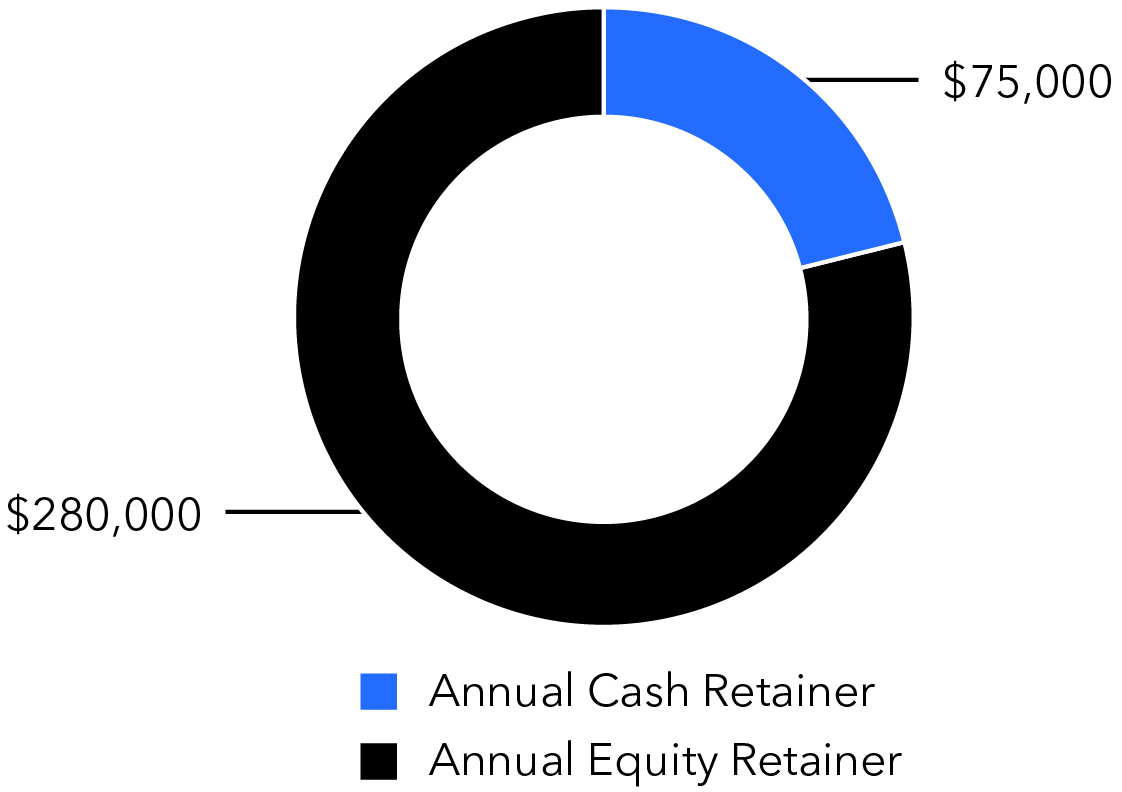
|
Cash Retainers for Board and Committee Service |
|||||||||||||||||||||||||
Independent Directors |
$75,000 | |||||||||||||||||||||||||
Chair of the Board |
$90,000* | |||||||||||||||||||||||||
Audit and Risk Committee |
Acquisition Committee |
|||||||||||||||||||||||||
Chair |
$32,500** | Chair |
$17,500** | |||||||||||||||||||||||
Member |
$20,000 | Member |
$15,000 | |||||||||||||||||||||||
Compensation and Organizational Development Committee |
Nominating and Governance Committee |
|||||||||||||||||||||||||
Chair |
$25,000** | Chair |
$17,500** | |||||||||||||||||||||||
Member |
$15,000 | Member |
$10,000 | |||||||||||||||||||||||
Annual Equity Retainer |
||||||||||||||||||||||||||
Independent Directors |
$280,000 | |||||||||||||||||||||||||
Chair of the Board |
$90,000* | |||||||||||||||||||||||||
* The Chair of the Board of Directors also receives the Board membership retainer.
** Committee chairs also receive the committee membership retainer.
34 |
INTUIT 2025 Proxy Statement
|
Director Compensation |
Annual Retainer and Equity Compensation Program for Non-Employee Directors |
||||||||
Fiscal 2024 Annual Cash Retainers
Non-employee directors are paid annual cash retainers for Board membership, plus additional cash retainers for their committee service. The Board Chair is also paid a supplemental cash retainer for that service. These retainers are paid in quarterly installments and are prorated for any changes to committee service that occur during the year. Directors may elect to defer cash retainers into tax-deferred Intuit stock units by making an irrevocable written election before the start of each calendar year. These tax-deferred stock units, known as Conversion Grants, are granted quarterly and are fully vested at the time of grant. The shares underlying Conversion Grants are distributable on the same terms as the annual grants made to non-employee directors.
We reimburse non-employee directors for out-of-pocket expenses incurred in connection with attending Board and committee meetings. However, we do not pay meeting attendance fees.
Fiscal 2024 Director Equity Compensation Program
Grants are made to non-employee directors in the form of a fixed dollar value of RSUs that generally vest in full on the first day of the 12th month following the grant date. Because these grants are for a fixed dollar amount, the number of RSUs awarded annually to non-employee directors varies, depending on the closing market price of Intuit’s common stock on the date of grant. The annual grants are awarded each year on the day following the annual meeting of stockholders. For a director who joins the Board between annual meetings, the annual grant will be prorated based on the number of full months of expected service until the first anniversary of the most recent annual meeting. These prorated grants will vest on the same day as the other directors’ annual grants. Once RSUs vest, issuance of shares is deferred until five years from the date of grant, or an earlier separation from the Board or change in control of Intuit. Directors may elect to defer settlement of their RSUs for a longer period of time (from six to ten years following the date of grant). The short vesting schedule serves to avoid director entrenchment, while the five-year deferral ensures long-term alignment of director interests with those of our stockholders.
All of the RSUs that we grant to our directors have dividend equivalent rights. Dividend equivalents accumulate and are paid only when the shares underlying the RSUs are issued. Dividend equivalent rights on RSUs that fail to vest are forfeited.
The Amended and Restated 2005 Equity Incentive Plan (the “2005 Equity Incentive Plan”) provides that the annual aggregate grant date fair value (computed as of the date of grant in accordance with applicable financial accounting rules) of all awards granted to any non-employee director during any single calendar year (not including awards granted in lieu of cash retainers or other cash payments) may not exceed $625,000, plus an additional $250,000 for the non-employee director serving as the Chair of the Board.
Director Compensation Policies and Plans
Director Stock Ownership Requirement
We have a mandatory stock ownership program that requires non-employee directors to own Intuit stock with a value equal to at least ten times the amount of the annual Board member cash retainer. Unvested RSUs and vested deferred RSUs held by a Board member are counted as shares when determining the number of shares owned. Under our policy, directors must comply with this requirement within five years from the date they join the Board. If any director does not meet the stock ownership requirement within this time frame, then 50% of his or her annual cash retainers will be made in the form of Intuit stock until compliance is achieved. As of July 31, 2024, all of our directors were in compliance with our policy.
More information about policies that cover our non-employee director compensation program are discussed below in Our Compensation Policies and Practices.
Director Compensation Policies and Plans |
Director Compensation |
INTUIT 2025 Proxy Statement
|
35 |
||||||||
Donation Matching Program for Non-Employee Directors
Our non-employee directors may participate in the Donation Matching Program for Non-Employee Board Members. Under this program, Intuit will match donations made by non-employee directors to qualified charitable organizations, up to a maximum of $15,000 per director per fiscal year.
Director Summary Compensation Table
The following table summarizes the fiscal 2024 compensation earned by each of our directors, other than Mr. Goodarzi whose compensation is described under “Executive Compensation Tables”.
| Director Name |
Fees Earned or
Paid in Cash
($) (1)
|
Stock
Awards
($) (2) (3) (4)
|
All Other
Compensation
($)
|
Total ($) |
|||||||||||||
| Eve Burton | — | 379,010 | — | 379,010 | |||||||||||||
| Scott D. Cook | — | — | 1,267,625 | (5) |
1,267,625 | ||||||||||||
| Richard L. Dalzell | — | 383,738 | — | 383,738 | |||||||||||||
| Deborah Liu | — | 366,229 | 15,000 | (6) |
381,229 | ||||||||||||
| Tekedra Mawakana | — | 361,500 | — | 361,500 | |||||||||||||
| Suzanne Nora Johnson | 215,000 | 350,287 | 15,000 | (6) |
580,287 | ||||||||||||
Forrest Norrod (appointed July 24, 2024) |
— | 108,353 | — | 108,353 | |||||||||||||
| Vasant Prabhu (appointed May 2, 2024) | 26,250 | 173,679 | — | 199,929 | |||||||||||||
| Ryan Roslansky | 105,000 | 260,071 | — | 365,071 | |||||||||||||
| Thomas Szkutak | — | 394,155 | — | 394,155 | |||||||||||||
| Raul Vazquez | 105,000 | 260,071 | — | 365,071 | |||||||||||||
| Eric S. Yuan | 100,000 | 260,071 | — | 360,071 | |||||||||||||
(1)Non-employee directors may elect to receive RSUs in lieu of their cash retainers. These Conversion Grants are granted on a quarterly basis and are fully vested at the time of grant. For Ms. Burton, Mr. Dalzell, Ms. Liu, Ms. Mawakana, and Mr. Szkutak, the number in the “Stock Awards” column includes the value of Conversion Grants at the time of grant in addition to the value of the annual equity grant. Each of Ms. Burton, Mr. Dalzell, Ms. Liu, Ms. Mawakana, and Mr. Szkutak elected to receive all of their cash retainers due to them for service on the Board and committees during calendar years 2024 and 2023 in RSUs. See the Equity Grants to Directors During Fiscal Year 2024 table for more information.
(2)These amounts represent the aggregate grant date fair value of RSUs granted during fiscal 2024, computed in accordance with Financial Accounting Standards Board (“FASB”) Accounting Standards Codification (“ASC”) Topic 718, “Compensation – Stock Compensation” (“FASB ASC Topic 718”). See the Equity Grants to Directors During Fiscal Year 2024 and Outstanding Equity Awards for Directors at Fiscal Year-End 2024 tables for information regarding the grant date fair value of RSUs granted during the fiscal year and the number of awards outstanding for each director at the end of the fiscal year.
36 |
INTUIT 2025 Proxy Statement
|
Director Compensation |
Director Summary Compensation Table |
||||||||
(3)Equity Grants to Directors During Fiscal Year 2024
The following table shows the RSU grants made to each of our directors, other than Mr. Goodarzi, who served during fiscal 2024.
| Stock Awards | ||||||||||||||
| Director Name | Grant Date | Shares Subject to Award (#) |
Grant Date
Fair Value
($)(a)
|
|||||||||||
| Eve Burton | 10/27/2023 | 62 | (b) |
29,730 | ||||||||||
| 1/19/2024 | 418 | (c) |
260,071 | |||||||||||
| 1/19/2024 | 48 | (b) |
29,865 | |||||||||||
| 5/3/2024 | 47 | (b) |
29,576 | |||||||||||
| 7/26/2024 | 47 | (b) |
29,768 | |||||||||||
Scott D. Cook (d)
|
— | — | — | |||||||||||
| Richard L. Dalzell | 10/27/2023 | 64 | (b) |
30,689 | ||||||||||
| 1/19/2024 | 418 | (c) |
260,071 | |||||||||||
| 1/19/2024 | 50 | (b) |
31,109 | |||||||||||
| 5/3/2024 | 49 | (b) |
30,834 | |||||||||||
| 7/26/2024 | 49 | (b) |
31,035 | |||||||||||
| Deborah Liu | 10/27/2023 | 55 | (b) |
26,374 | ||||||||||
| 1/19/2024 | 418 | (c) |
260,071 | |||||||||||
| 1/19/2024 | 43 | (b) |
26,754 | |||||||||||
| 5/3/2024 | 42 | (b) |
26,429 | |||||||||||
| 7/26/2024 | 42 | (b) |
26,601 | |||||||||||
| Tekedra Mawakana | 10/27/2023 | 53 | (b) |
25,415 | ||||||||||
| 1/19/2024 | 418 | (c) |
260,071 | |||||||||||
| 1/19/2024 | 41 | (b) |
25,509 | |||||||||||
| 5/3/2024 | 40 | (b) |
25,171 | |||||||||||
| 7/26/2024 | 40 | (b) |
25,334 | |||||||||||
| Suzanne Nora Johnson | 1/19/2024 | 563 | (c) |
350,287 | ||||||||||
| Forrest Norrod | 7/25/2024 | 173 | (e) |
108,353 | ||||||||||
| Vasant Prabhu | 5/3/2024 | 276 | (e) |
173,679 | ||||||||||
| Ryan Roslansky | 1/19/2024 | 418 | (c) |
260,071 | ||||||||||
| Thomas Szkutak | 10/27/2023 | 70 | (b) |
33,567 | ||||||||||
| 1/19/2024 | 418 | (c) |
260,071 | |||||||||||
| 1/19/2024 | 54 | (b) |
33,598 | |||||||||||
| 5/3/2024 | 53 | (b) |
33,351 | |||||||||||
| 7/26/2024 | 53 | (b) |
33,568 | |||||||||||
| Raul Vazquez | 1/19/2024 | 418 | (c) |
260,071 | ||||||||||
| Eric S. Yuan | 1/19/2024 | 418 | (c) |
260,071 | ||||||||||
(a)These amounts represent the aggregate grant date fair value of these awards computed in accordance with FASB ASC Topic 718. The grant date fair value of these awards is equal to the closing market price of Intuit’s common stock on the date of grant.
(b)These amounts represent RSUs awarded pursuant to a Conversion Grant, which are granted quarterly with a grant date fair value equal to 25% of the annual retainers for Board and committee service (as described above under Annual Retainer and Equity Compensation Program for Non-Employee Directors) and calculated using the closing market price of Intuit’s common stock on the date of grant. Conversion Grants are fully vested at the time of grant because they replace cash compensation that is vested when it is paid.
(c)These amounts represent RSUs awarded pursuant to an annual non-employee director grant, which vests as to 100% of the shares on January 1, 2025, subject to the director’s continued service.
(d)Mr. Cook was not granted any equity awards from Intuit during fiscal 2024.
(e)These amounts represent RSUs awarded pursuant to a New Board Member grant that was prorated based on the number of full months of expected service until the next annual meeting and vests as to 100% of the shares on January 1, 2025, subject to the director’s continued service.
Director Summary Compensation Table |
Director Compensation |
INTUIT 2025 Proxy Statement
|
37 |
||||||||
(4)Outstanding Equity Awards for Directors at Fiscal Year-End 2024
The following table provides information on the outstanding equity awards held by our directors, other than Mr. Goodarzi, as of July 31, 2024.
| Director Name |
Aggregate
Shares Subject
to Outstanding
Stock Awards
(#)(a)
|
Portion of
Outstanding
Stock Awards
that is Vested
and Deferred
(#)(a)
|
||||||
| Eve Burton | 8,254 | 7,836 | ||||||
| Scott D. Cook | — | — | ||||||
| Richard L. Dalzell | 4,245 | 3,827 | ||||||
| Deborah Liu | 6,376 | 5,958 | ||||||
| Tekedra Mawakana | 2,797 | 2,379 | ||||||
| Suzanne Nora Johnson | 3,703 | 3,140 | ||||||
| Forrest Norrod | 173 | — | ||||||
| Vasant Prabhu | 276 | — | ||||||
| Ryan Roslansky | 825 | 407 | ||||||
| Thomas Szkutak | 4,480 | 4,062 | ||||||
| Raul Vazquez | 3,161 | 2,743 | ||||||
| Eric S. Yuan | 825 | 407 | ||||||
(a)For each non-employee director, the amounts reflected as aggregate shares subject to outstanding stock awards include vested and deferred stock awards, for which settlement is deferred in accordance with Intuit’s director equity compensation program.
(5)Mr. Cook is an employee of Intuit, so he is not compensated as a non-employee director. Mr. Cook’s cash compensation shown in the table reflects salary of $650,000, an incentive bonus of $617,500 awarded for performance in fiscal 2024, and $125 in other compensation. Mr. Cook was not granted any equity awards during fiscal 2024.
(6)Represents matching contributions to charitable organizations pursuant to the Donation Matching Program for Non-Employee Board Members.
38 |
INTUIT 2025 Proxy Statement
|
Director Compensation |
Director Summary Compensation Table |
||||||||
Proposal No. 2 – Advisory Vote to Approve Executive Compensation
In accordance with Section 14A of the Exchange Act, we are asking stockholders to vote, on an advisory basis, to approve Intuit’s executive compensation for our NEOs.
The Compensation Discussion and Analysis section of this proxy statement explains the Compensation Committee’s guiding compensation philosophy. The Compensation Committee strives to establish a compensation program that:
•compensates our executives based on both overall company performance and individual employee performance;
•supports our corporate growth strategy;
•enables Intuit to attract, retain, and motivate talented executives with proven experience;
•closely ties our NEOs’ compensation to short- and long-term performance goals and strategic objectives (including our True North Goals relating to reducing greenhouse gas emissions, increasing workforce diversity, creating jobs, and better preparing individuals for jobs); and
•makes incentive compensation a greater portion of overall pay for our NEOs than it is for most other Intuit employees, because the NEOs lead our key business units or functions and thus have the ability to directly influence overall company performance.
Intuit employs a number of practices that reflect our pay-for-performance compensation philosophy, as described under Executive Compensation Highlights in the Proxy Summary above and in the Compensation Discussion and Analysis section below.
We urge you to read the Compensation Discussion and Analysis section of this proxy statement to learn how our policies and practices reflect our compensation philosophy, and the Executive Compensation Tables section to learn about the specific compensation of our NEOs. The Compensation Committee and the Board believe that Intuit’s policies and procedures reflect our compensation philosophy and promote its goals.
While the advisory vote to approve executive compensation is non-binding, the Compensation Committee, which is responsible for designing and administering our executive compensation program, values your opinions and will consider the outcome of the “say-on-pay” vote when making future compensation decisions for NEOs.

|
The Board recommends that you vote FOR approval, on an advisory basis, of the compensation of our NEOs.
|
||||||||||
Proposal No. 2 – Advisory Vote to Approve Executive Compensation |
INTUIT 2025 Proxy Statement
|
39 |
||||||
Compensation Discussion and Analysis
Executive Summary
This Compensation Discussion and Analysis describes our executive compensation philosophy and objectives, provides context for the compensation actions approved by the Compensation Committee, and explains the compensation of our NEOs. The Compensation Committee, which is made up entirely of independent directors, oversees Intuit’s compensation plans and policies, approves the compensation of our executive officers, and administers our equity compensation plans, as well as our organizational development activities, human capital management, and DEI initiatives. For fiscal 2024, our NEOs were:
| Named Executive Officers | |||||
 |
Sasan K. Goodarzi
President and Chief Executive Officer
|
||||

|
Sandeep S. Aujla
Executive Vice President and Chief Financial Officer
|
||||

|
Laura A. Fennell
Executive Vice President and Chief People & Places Officer
|
||||

|
Mark Notarainni
Executive Vice President and General Manager, Consumer Group
|
||||
 |
Marianna Tessel
Executive Vice President and General Manager, Global Business Solutions Group (formerly Small Business & Self-Employed Group)
|
||||
40 |
INTUIT 2025 Proxy Statement
|
CD&A |
Executive Summary |
||||||||
Fiscal 2024 Compensation Overview
Focus on Pay-For-Performance and Delivering for All Stakeholders
In fiscal 2024, management and the Compensation Committee continued to approach our executive compensation program with enduring pay-for-performance principles and set rigorous goals to drive growth and long-term shareholder value. The committee did not adjust any components of our executive compensation program, including our performance measures or goals. Our program is designed to balance rewards for both short-term operating results and long-term growth, and the committee evaluated each NEO’s performance against key financial measures, strategic objectives like our True North Goals, and stockholder return. We delivered approximately 97% of total direct compensation for our CEO, and approximately 95% of total direct compensation for our other NEOs, through awards linked to Intuit’s performance. The only fixed component of pay was base salary.
CEO Total Direct Compensation(1)

Other NEOs Total Direct Compensation(1)

(1)Total direct compensation reflects base salary, actual bonus payout, and equity awards granted during fiscal 2024. Consistent with disclosure in the Fiscal Year 2024 Summary Compensation Table, equity awards are reported at their grant date fair value (which, for the PSUs, is based on the probable outcome of achievement of the performance goals using a widely accepted probability model), and salary and incentive cash are reported based on the actual amounts earned with respect to fiscal 2024.
Equity-based compensation is aligned with the long-term interests of Intuit’s stockholders because it focuses our executive officers’ attention on increasing stockholder value over time, including both absolute and relative TSR.
Annual cash incentive awards for the NEOs were equal to the overall funding level of our bonus pool for the broader employee base to promote consistent Intuit-wide outcomes. These annual cash incentives were based on achievement of specific revenue and non-GAAP operating income goals for the fiscal year, as well as Intuit’s performance against goals to deliver results for our key True North stakeholders, including certain ESG goals. Our True North stakeholders include employees, customers, stockholders and the communities that we serve. In assessing True North performance, the Compensation Committee considered factors such as our progress on workforce diversity, job creation and readiness, and climate goals, and opportunities for continued improvement in delivering for all True North stakeholders.
Executive Summary |
CD&A |
INTUIT 2025 Proxy Statement
|
41 |
||||||||
Our Fiscal 2024 Performance
Intuit’s financial performance for fiscal 2024 was strong, demonstrating the strength of our platform. We made meaningful progress with our AI-driven expert platform strategy and Big Bets that position the company for durable growth in the future.
|
Total
revenue
|
Combined platform revenue |
GAAP operating income |
GAAP diluted EPS |
||||||||||||||||||||||||||||||||
|
$16.3 billion
up 13% from FY23
Global Business Solutions Group up 19% from FY23
with Online Ecosystem up 20% from FY23
Consumer Group up 7% from FY23
Credit Karma up 5% from FY23
|
$12.5 billion
up 14% from FY23 includes Global Business Solutions Group Online Ecosystem, TurboTax Online and Credit Karma
|
$3.6 billion up 16% from FY23
|
$10.43
up 24% from $8.42 in FY23
|
||||||||||||||||||||||||||||||||
|
Repurchased
$2.0 billion of shares and increased dividend 15% to $3.60 per share
|
Non-GAAP operating income
$6.4 billion
up 16% from FY23
|
Non-GAAP diluted EPS
$16.94 up 18% from $14.40 in FY23
|
|||||||||||||||||||||||||||||||||
See Appendix A of this proxy statement for information regarding non-GAAP financial measures, including a reconciliation of non-GAAP financial measures to the most directly comparable GAAP financial measures.
Fiscal 2024 Total Shareholder Return
We generated:
•TSR of 27.3% in fiscal 2024
•Annualized three-year TSR of 7.6%
•Annualized five-year TSR of 19.3% (top quartile of S&P 500 constituents)
For comparison, the S&P 500 index had annualized returns of 9.6% over the three-year period and 15.0% over the five-year period.
Fiscal 2024 True North Goals for Communities and Employees
At Intuit, a way that we hold ourselves accountable to our mission to power prosperity around the world is to set measurable True North Goals. During fiscal 2024, we delivered strong positive impact, including in the following areas:
•Supported approximately 18,200 seasonal and year-round jobs created in underserved communities, falling somewhat short of our fiscal 2024 goal of 18,900 jobs
•On a cumulative basis, better prepared over 4.7 million students for jobs, exceeding our fiscal 2024 cumulative goal of 3.6 million
•Reduced greenhouse gas emissions in communities, many of which are underserved, by 611,000 metric tonnes (since fiscal 2020), exceeding our fiscal 2024 Climate Positive cumulative goal of 600,000 metric tonnes
•Increased the representation of our U.S. employees from underrepresented racial groups (“URGs”) to 16.5%, falling short of our fiscal 2024 goal of 18.0%*
•Maintained the representation of women in our technology roles globally to 34.1%, falling short of our fiscal 2024 goal of 37.0%*
•Earned employee engagement scores that continued to reflect best-in-class levels, including being chosen as one of Fortune magazine’s “100 Best Companies to Work For” for the 23rd consecutive year
* Does not include Credit Karma, which maintains separate record-keeping systems. Our representation goals focus on attracting and developing the best diverse talent to ensure individuals from all backgrounds have an equal opportunity to be employed and succeed at Intuit.
42 |
INTUIT 2025 Proxy Statement
|
CD&A |
Executive Summary |
||||||||
How We Compensated Our CEO in Fiscal 2024
The Compensation Committee’s decisions for Mr. Goodarzi in fiscal 2024 reflect Intuit’s objectively strong performance, including revenue and operating income growth, and progress on our five Big Bet strategic priorities during continuing uncertainty in the economic environment. The Compensation Committee also sought to reward Mr. Goodarzi’s leadership and progress on our True North Goals. The committee further recognized his leadership and development of a high-performing management team and building a great environment for the best talent, as well as Intuit’s progress on its strategy to be the global AI-driven expert platform powering prosperity for consumers and small and mid-market businesses, and acceleration of the use and deployment of AI to solve the most important problems of our customers.
Our CEO’s compensation is aligned with stockholders’ interests. Approximately 97% of total direct compensation for Mr. Goodarzi in fiscal 2024 was performance-based and strongly linked to Intuit’s results. Only his base salary was fixed (approximately 3% of his total direct compensation for fiscal 2024). Mr. Goodarzi’s fiscal 2024 bonus was funded at 95% of target, which matched the aggregate funding for the broader employee base. This payout percentage was lower than the baseline funding percentage generated by the pre-established formula based on achievement of revenue and non-GAAP operating income because we fell short on achieving some of our True North Goals.
In addition, service-based restricted stock units and performance-based relative TSR restricted stock units (“PSUs”) granted to the CEO are subject to a mandatory one-year holding period after vesting to increase his long-term alignment with stockholders.
NEO Compensation Highlights
In fiscal 2024, we paid cash bonuses to the NEOs at 95% of target. This bonus payout as a percentage of target was lower than the 107% of target generated under the bonus plan’s funding formula for achieving revenue and non-GAAP operating income against pre-established goals, and matched the aggregate bonus pool funding level approved by the Compensation Committee for the broader employee base. The payout percentage was adjusted downward to recognize that, while we achieved some of our True North Goals, we fell short on others.
ESG goals that are measurable and linked to our True North strategic goals were considered by the Compensation Committee in determining executive compensation, including for workforce diversity, greenhouse gas emissions, community job creation, and better preparing individuals for jobs.
On average, 96% of the fiscal 2024 total direct compensation paid to the NEOs was performance-based through a combination of goal-driven annual cash incentives and equity awards.
2024 “Say-On-Pay” Advisory Vote on Executive Compensation
Intuit provides stockholders with an advisory vote on executive compensation. At our 2024 Annual Meeting of Stockholders, approximately 92.5% of the votes cast in the “say-on-pay” advisory vote were “FOR” approval of our executive compensation. We value the opinions of our stockholders and also seek their input as part of our regular stockholder outreach efforts. The feedback we received from stockholders regarding our executive compensation program was generally positive and affirmed our current compensation strategy and its alignment with performance.
The Compensation Committee evaluated the results of the 2024 advisory “say-on-pay” vote, additional stockholder feedback gained through our robust engagement program, input from its independent compensation consultant, and the other factors and data discussed in this Compensation Discussion and Analysis in determining executive compensation policies and decisions. Based on this evaluation, the Compensation Committee determined that our executive compensation programs are aligned with our pay-for-performance compensation philosophy and company strategy and decided not to make any material changes to the structure or principles of the programs.
The Compensation Committee will continue to consider stockholder feedback, input from its independent compensation consultant, and the outcomes of future say-on-pay votes when assessing our executive compensation programs and policies and making compensation decisions for our NEOs.
Executive Summary |
CD&A |
INTUIT 2025 Proxy Statement
|
43 |
||||||||
Compensation Practices
We employ a number of practices that reflect our pay-for-performance compensation philosophy and related approach to executive compensation.
| WHAT WE DO | WHAT WE DON’T DO | |||||||||||||||||||||||||
 A significant portion of our senior executive officer compensation is in the form of incentives tied to achievement of predetermined performance measures. A significant portion of our senior executive officer compensation is in the form of incentives tied to achievement of predetermined performance measures.
 We have “clawback” provisions for performance-based equity awards and for cash bonus payments made to our award recipients, including all of our senior executive officers. We have “clawback” provisions for performance-based equity awards and for cash bonus payments made to our award recipients, including all of our senior executive officers.
 We have robust stock ownership requirements for senior executive officers and non-employee directors, including 10x salary for the CEO and 10x annual cash retainer for non-employee directors. We have robust stock ownership requirements for senior executive officers and non-employee directors, including 10x salary for the CEO and 10x annual cash retainer for non-employee directors.
 RSUs and PSUs granted to the CEO include an additional mandatory one-year holding period after vesting. RSUs and PSUs granted to the CEO include an additional mandatory one-year holding period after vesting.
 Half the value of equity grants to executive officers is in the form of PSUs that require above-median TSR (60th percentile) to earn a target award. Half the value of equity grants to executive officers is in the form of PSUs that require above-median TSR (60th percentile) to earn a target award.
 We use a mix of relative and absolute performance metrics in our incentive awards. We use a mix of relative and absolute performance metrics in our incentive awards.
|
 We do not allow directors or employees (including executive officers) to pledge Intuit stock or engage in hedging transactions involving Intuit stock. We do not allow directors or employees (including executive officers) to pledge Intuit stock or engage in hedging transactions involving Intuit stock.
 We do not provide supplemental company-paid retirement benefits designed for executive officers. We do not provide supplemental company-paid retirement benefits designed for executive officers.
 We do not provide any excise tax “gross-up” payments. We do not provide any excise tax “gross-up” payments.
 We do not reprice stock options. We do not reprice stock options.
 We do not provide NEOs with multi-year guaranteed cash incentive awards. We do not provide NEOs with multi-year guaranteed cash incentive awards.
 Our equity plan does not permit “evergreen” replenishment of the shares without stockholder approval. Our equity plan does not permit “evergreen” replenishment of the shares without stockholder approval.
 We do not provide excessive perquisites, severance or personal benefits. We do not provide excessive perquisites, severance or personal benefits.
|
|||||||||||||||||||||||||
Compensation Philosophy and Objectives
Our Guiding Philosophy
In setting policies and practices regarding compensation, the guiding philosophy of the Compensation Committee is that our compensation programs should:
Help achieve our corporate growth and business strategy |
Compensate our executives based on both company and individual performance |
Enable Intuit to hire, retain and motivate talented executives with proven experience in an increasingly competitive market |
Make short-term cash and long-term equity incentive compensation a greater portion of the NEOs’ pay opportunity than it is for other Intuit employees because our NEOs, as leaders of key business units or functions, have the ability to directly influence overall company performance |
||||||||||||||||||||||||||
Our Strategies
We use a mix of cash and equity incentives. The Compensation Committee believes that both cash and equity incentives are important for an effective compensation structure. Annual cash incentives reward executives for short-term operating results, as well as our progress toward True North stakeholder goals, which include certain ESG goals, while equity incentives motivate executives to deliver on our long-term strategic plan in order to increase stockholder value.
We consider a diverse set of factors in determining compensation opportunities and incentive awards. The Compensation Committee considers each executive officer’s total compensation to assess the program’s overall value for motivation and retention, among other factors, to determine the amount of cash and equity incentives our officers are awarded. The committee also considers other relevant factors, such as market data, internal parity, succession planning, exceptional capability, and stockholder perspectives.
44 |
INTUIT 2025 Proxy Statement
|
CD&A |
Compensation Philosophy and Objectives | ||||||||
We manage our equity compensation programs to provide competitive rewards that are commensurate with results delivered. The Compensation Committee considers measures related to dilution, burn rate and the cost of the equity incentive program compared to peer companies, while recognizing the need to offer equity to attract and retain top executive and technology talent in an increasingly competitive labor market. This is especially important in areas that help accelerate our strategy of being a global AI-driven expert platform to solve our customers’ biggest problems, such as full-stack and data engineering, AI, data science, customer success and sales.
Components of Compensation
Overview
The components of Intuit’s executive compensation program for fiscal 2024 are as follows:
| Component | Primary Purpose | ||||||||||||||||
| Base Salary | Provide the security of a competitive fixed cash payment for services rendered. | ||||||||||||||||

|
Annual Cash Bonuses | Reward achievement of annual company operating goals, including revenue and non-GAAP operating income targets, as well as achievement of our True North Goals focused on employees, customers, communities and stockholders, including our progress toward certain ESG goals. |
|||||||||||||||
| Long-Term Incentives | Motivate and reward executives based on Intuit’s absolute performance, performance relative to peers and the value delivered to Intuit stockholders through stock price appreciation and dividends. |
||||||||||||||||

|
PSUs retain executives and align their interest with those of stockholders for the three-year vesting period, and offer upside for superior stockholder returns relative to similar alternative investments over 12-, 24- and 36-month periods.
|
||||||||||||||||

|
RSUs provide alignment with stockholders’ interests during the four-year vesting term and support retention.
|
||||||||||||||||

|
Stock Options motivate executives to build stockholder value over the seven-year life of the options, since options deliver value only if Intuit’s stock price appreciates after they are granted.
|
||||||||||||||||
The Compensation Committee conducts its annual review process near the end of each fiscal year to determine each NEO’s cash bonus and equity awards and any adjustments to base salary and target cash bonus opportunities for the following year. This timing allows the committee to consider the company’s TSR performance and financial results for the fiscal year.
Base Salary
Each July, the Compensation Committee reviews the base salaries of our NEOs in the context of the compensation information provided by the committee’s independent compensation consultant. The goal of this review is to determine whether the base salaries of our NEOs are competitive with our compensation peer group and to ensure that base salaries reflect each executive’s role, responsibilities, experience, and performance. Fiscal 2025 base salary decisions for each of our NEOs are described under Fiscal 2024 Compensation Actions below.
Components of Compensation |
CD&A |
INTUIT 2025 Proxy Statement
|
45 |
||||||||
Annual Cash Bonuses
Intuit uses cash bonuses to reward achievement of annual company financial performance and strategic objectives, including certain ESG goals, and individual strategic and operational objectives, all of which align with the goal of increasing stockholder value. These bonuses are determined by a multi-step process. Cash bonuses for our senior executives, including our NEOs, were awarded under the Intuit Inc. Performance Incentive Plan (“IPI”), which is the same bonus program in which our broader employee base participates.
| At the beginning of and during the fiscal year | |||||
Bonus targets are established. Each NEO has an annual bonus target that is a stated percent of base salary. The Compensation Committee set fiscal 2024 bonus targets in July 2023 for all NEOs based on the scope and significance of each executive’s leadership role at Intuit, as well as a review of market data.
IPI bonus pool baseline funding formula is determined. Baseline funding of the IPI is determined by company-wide financial performance. The Compensation Committee set two rigorous, equally weighted performance goals - one based on Intuit’s revenue and the other based on non-GAAP operating income. The committee believes these objective measurements serve as clear goals for management to drive both innovation and responsible cost-management.
True North Goals are established. As part of our financial planning process, management established goals to deliver results for each of our four key True North stakeholders: employees, customers, communities, and stockholders. These metrics are designed to advance our progress toward our bold goals and include measurable company-wide ESG goals. Based on performance against these goals, the Compensation Committee has discretion to make upward or downward adjustments of up to 30% of target to the company-wide funding percentage generated by the baseline funding formula, which company-wide is then allocated to NEOs in a manner that may not exceed 180% of their target bonus.
| At the end of the fiscal year | |||||
Fiscal 2024 baseline funding is determined. The following table shows the formulaic output of a range of performance levels against the two financial goals approved by the Compensation Committee at the beginning of the fiscal year. Based on our actual performance under these measures, the formula yielded a baseline funding for the IPI of 107% of target.
| Revenue ($ Billions) 50% |
+
|
Non-GAAP Operating Income
($ Billions)
50%
|
=
|
Total 100% |
||||||||||||||||||||||||||||
| Measure Weighting |
FY24
Revenue
|
Bonus Pool
Funding as a
Percent of Target(1)
|
FY24
Non-GAAP
Operating
Income
|
Bonus Pool
Funding as a
Percent of
Target(1)
|
Baseline Company
Performance as a
Percent of Target(2)
|
|||||||||||||||||||||||||||
| Maximum | $17.55 | 150 | % | $6.92 | 150 | % | 150 | % | ||||||||||||||||||||||||
| Target | $16.21 | 100 | % | $6.30 | 100 | % | 100 | % | ||||||||||||||||||||||||
| Threshold | $14.59 | — | % | $5.67 | — | % | — | % | ||||||||||||||||||||||||
Actual fiscal 2024 performance and funding percentages |
$16.29 | 103.2 | % | $6.40 | 110.8 | % | 107.0 | % | ||||||||||||||||||||||||
(1)Interpolated between defined points. Fiscal 2024 revenue and non-GAAP operating income dollar figures above are rounded to the nearest ten million. The Bonus Pool Funding as a Percent of Target is calculated using dollars in millions. Thus, actual results may vary slightly from the figures presented above.
(2)This reflects a baseline for the funding of the IPI. The Compensation Committee has discretion to determine the actual IPI payment levels for each participant in an amount not to exceed the lesser of 180% of target or $5 million.
True North Goals are assessed. The Compensation Committee then considered our progress against the fiscal 2024 True North Goals.
46 |
INTUIT 2025 Proxy Statement
|
CD&A |
Components of Compensation |
||||||||
True North Fiscal 2024 Strategic Goals and Progress
True North Stakeholders |
Fiscal 2024 Goals |
Results | ||||||||||||
Employees |
•Inspire and empower highly engaged employees, as measured by employee surveys*
•Create a diverse and inclusive environment, as measured by percentage of women in our technology roles globally and percentage of U.S. employees from URGs*
•Grow highly capable people managers, as measured by employee surveys*
•Retain world’s top talent*
|
•Maintained engagement scores in the top 10% of industry benchmarks, as measured by internal surveys administered by an independent employee engagement analytics firm
•Maintained employee retention at better rates than industry benchmark
•Increased the representation of our U.S. employees from URGs to 16.5%, falling short of our fiscal 2024 goal of 18.0%**
•Maintained the representation of women in our technology roles globally at 34.1%, falling short of our fiscal 2024 goal of 37.0%**
•Ranked #23 in Fortune magazine’s list of “100 Best Companies to Work For”
|
||||||||||||
Customers |
•Increase the number of active customers
•Improve customer retention
•Delight customers more than alternatives, as measured by net promoter scores and product recommendation scores
|
•Continued opportunity to accelerate growth in number of customers
•Opportunity to improve customer satisfaction, as measured by net promoter scores and product recommendation scores
|
||||||||||||
Communities |
•Create jobs through Prosperity Hubs*
•Better prepare people for jobs*
•Make a positive impact on climate, as measured by reduction of carbon dioxide equivalent emissions in the communities we serve*
|
•Supported approximately 18,200 seasonal and year-round jobs in underserved communities, falling short of our fiscal 2024 goal to support 18,900 jobs
•On a cumulative basis since fiscal 2020, better prepared over 4.7 million students for jobs, exceeding our fiscal 2024 cumulative goal of 3.6 million
•Reduced greenhouse gas emissions in communities, many of which are underserved, by 611,000 metric tonnes (since fiscal 2020), exceeding our fiscal 2024 Climate Positive cumulative goal of 600,000 metric tonnes
|
||||||||||||
Stockholders |
•Grow revenue by double digits
•Increase average revenue per customer (“ARPC”)
•Generate operating income growth
|
•Grew overall revenue by 13% to $16.3 billion
•Grew revenue by 19% in the Global Business Solutions Group, 7% in the Consumer Group, 7% in the ProTax Group, and 5% in Credit Karma
•Grew combined platform revenue, which includes Global Business Solutions Group Online Ecosystem, TurboTax Online and Credit Karma, by 14% to $12.5 billion
•Grew Online Ecosystem ARPC by 11%
•Grew GAAP operating income 16% to $3.6 billion and non-GAAP operating income 16% to $6.4 billion
|
||||||||||||
* ESG goals
** Does not include Credit Karma, which maintains separate record-keeping systems. Our representation goals focus on attracting and developing the best diverse talent to ensure individuals from all backgrounds have an equal opportunity to be employed and succeed at Intuit.
Components of Compensation |
CD&A |
INTUIT 2025 Proxy Statement
|
47 |
||||||||
Actual Named Executive Officer bonus awards are determined. Based on the above, including our performance against the True North Goals, in some areas of which we remain constructively dissatisfied, the Compensation Committee exercised negative discretion and set funding for the IPI at 95% of target, which is below the baseline formulaic funding level of 107%. This funding level established for the NEOs was equal to the aggregate funding percentage applicable to Intuit employees generally. The committee believes that funding short-term incentives paid to the NEOs at the same level as those paid to the rest of our employees helps to promote consistent Intuit-wide outcomes.
The fiscal 2024 bonus payouts for each of our NEOs were as follows:
| Name | Annual Base Salary ($) |
Target Bonus as a Percent of Salary (%) |
Target Bonus ($) |
Actual Bonus as a Percent of Target Bonus (%) |
Actual Bonus ($) |
||||||||||||
| Sasan K. Goodarzi | 1,200,000 | 200 | % | 2,400,000 | 95 | % | 2,280,000 | ||||||||||
| Sandeep S. Aujla | 770,000 | 120 | % | 924,000 | 95 | % | 877,800 | ||||||||||
| Laura A. Fennell | 770,000 | 120 | % | 924,000 | 95 | % | 877,800 | ||||||||||
| Mark Notarainni | 725,000 | 100 | % | 725,000 | 95 | % | 688,750 | ||||||||||
| Marianna Tessel | 770,000 | 120 | % | 924,000 | 95 | % | 877,800 | ||||||||||
Long-Term Incentives
For the fiscal 2024 annual equity awards, which were granted in July 2024, our NEOs received half of their grant value in PSUs, and the other half was split evenly between RSUs and stock options. The value of equity grants is measured based on grant date fair value.
PSUs
Our PSUs align the interests of award recipients and our stockholders by rewarding superior stockholder returns compared to the returns of a pre-established peer group of other large technology companies (the “TSR Peers”). Specifically, the target number of shares is earned only if Intuit achieves a relative TSR ranking at the 60th percentile for each of the three performance periods described below. These performance-based awards ensure that a significant share of our executives’ equity compensation is contingent upon future outperformance compared to the TSR Peers.
Vesting. PSUs cliff vest after a three-year period and are earned based on Intuit’s TSR compared to the TSR Peers over three discrete performance periods covering 12, 24, and 36 months. Shares earned based on the 12- and 24-month relative TSR performance periods have an additional service-based vesting requirement; these shares do not vest until the end of the 36-month period. The three-year vesting schedule serves as a retention incentive and requires consistent, longer-term stock price performance, which supports long-term alignment with the interests of our stockholders.
Awards of PSUs to the CEO include an additional mandatory one-year holding period after vesting, in the form of an automatic deferral of the release of the shares that he earns under the PSU awards. This is to ensure longer-term alignment with stockholder interests and accountability for strategic decision-making. Except in certain limited circumstances (death, disability or a change in control), the deferral period applies to vested shares even if the CEO terminates service with the company or continues to serve Intuit but in a different role.
Performance goals. The target TSR is the 60th percentile of the TSR Peer group, which ensures that Intuit must perform better than the clear majority of the relative TSR Peers before executives earn the target number of shares. The use of discrete measurement periods of 12, 24, and 36 months aims to minimize the potential impact of short-term share price volatility over the duration of the three-year performance period. However, no portion of a PSU award is earned or distributed until the conclusion of the full three-year performance period to ensure retention and long-term alignment with stockholder interests. The Compensation Committee believes that this approach focuses the NEOs on long-term stockholder return.
TSR Peers. The TSR Peers were chosen so that the PSUs will reward the NEOs based on objective measurement of Intuit’s one-, two- and three-year returns compared to similar companies in which an Intuit stockholder might reasonably invest. The TSR Peers were identified using objective selection criteria recommended by the Compensation Committee’s independent compensation consultant. In order to further promote industry relevance of the TSR Peers, the Compensation Committee, at the recommendation of its independent compensation consultant, reviewed several approaches to identifying the TSR Peers based on objective criteria. For fiscal 2024, the Compensation Committee identified the TSR Peers by using the following criteria:
•Companies in the peer group used to benchmark our executive compensation program (the “Compensation Benchmark Peers”); and
•Public companies within Intuit’s General Industry Classification Standard (“GICS”) code and five other similar GICS codes (as they were defined in July 2024) with market capitalization and revenues greater than or equal to 0.15x Intuit’s.
48 |
INTUIT 2025 Proxy Statement
|
CD&A |
Components of Compensation |
||||||||
For fiscal 2024, there were 40 TSR Peers, which the Compensation Committee believes will ensure a robust sample for purposes of comparing TSR, even in the event of mergers or acquisitions during the three-year PSU performance period.
| Fiscal 2024 TSR Peer Group | ||||||||
| Adobe Inc. | Electronic Arts Inc. | PayPal Holdings, Inc. | ||||||
Airbnb, Inc. |
Fidelity National Financial, Inc. |
QUALCOMM Incorporated |
||||||
Alphabet Inc. |
Fiserv, Inc. |
Roper Technologies Inc. |
||||||
Apple Inc. |
Fortinet, Inc. |
Salesforce, Inc. |
||||||
Atlassian Corporation |
Global Payments Inc. |
SAP SE |
||||||
Autodesk, Inc. |
HP Inc. |
Sea Limited |
||||||
Baidu, Inc. |
Mastercard Incorporated |
ServiceNow, Inc. |
||||||
Block, Inc. |
Meta Platforms, Inc. |
Super Micro Computer, Inc. |
||||||
Broadcom Inc. |
Microsoft Corporation |
Synopsys, Inc. |
||||||
Cadence Design Systems, Inc. |
NetEase, Inc. |
Take-Two Interactive Software, Inc. |
||||||
Cisco Systems, Inc. |
Netflix, Inc. |
Uber Technologies, Inc. |
||||||
CrowdStrike Holdings, Inc. |
Oracle Corporation |
Visa Inc. |
||||||
Dell Technologies Inc. |
Palo Alto Networks, Inc. |
Workday, Inc. |
||||||
eBay Inc. |
||||||||
How PSU payouts link to performance. A payout equal to 100% of the target number of shares is earned when Intuit’s relative TSR is at the 60th percentile of the TSR Peers for the applicable performance period. Payouts can range from as low as 0% (if performance is below the 25th percentile of the TSR Peers for the performance period) to 200% of target (if Intuit’s TSR reaches the 100th percentile of the TSR Peers for the performance period). In order to avoid particularly large awards for outperforming peers in a declining market when Intuit’s stockholders do not earn a positive return, payouts for each performance period are generally capped at 100% of target if absolute TSR for that performance period is negative. However, in order to further emphasize the long-term nature of these awards, recipients may still earn the full value of any capped award if, for the 36-month performance period, Intuit achieves absolute TSR that is not negative or a relative TSR ranking at the 75th percentile or above.
The table below summarizes the relationship between relative TSR performance and the percent of target that may be earned under these awards.
TSR Performance Relationship
| Threshold | Target | Maximum |
|||||||||
Intuit’s TSR Percentile Rank(1)
|

|
||||||||||
Shares Earned as a Percent of Target(2)
|

|
||||||||||
(1)Linear interpolation between defined points. The stockholder return of both Intuit and the TSR Peers is measured using a thirty trading-day average at the start and the end of each performance period, which reduces the effect of daily stock market volatility on these measurements.
(2)Payouts for each performance period are capped at 100% of target if absolute TSR is negative for that performance period unless Intuit achieves, for the 36-month performance period, absolute TSR that is not negative or a relative TSR ranking that is at or above the 75th percentile.
Dividends. Recipients of PSUs, including the NEOs, are provided associated dividend-equivalent rights, but the dividends are not paid unless and until the underlying shares are earned, vest and are issued. Dividend-equivalent rights on PSUs that fail to vest are forfeited.
Components of Compensation |
CD&A |
INTUIT 2025 Proxy Statement
|
49 |
||||||||
RSUs
In fiscal 2024, 25% of the total value of the executive officers’ annual equity awards was made in the form of RSUs. These RSUs provide a link to stockholders’ interests because their value tracks with changes in Intuit’s stock price. They also serve as a long-term incentive for officers to remain with Intuit, since RSUs are forfeited if the recipient does not stay with Intuit through the vesting period.
RSUs generally vest over four years, with 25% of the shares vesting in July of the year following the grant date, and the remainder vesting in equal quarterly installments over the next three years, so long as the executive officer continues to be employed by Intuit. The CEO’s RSU awards also include a mandatory one-year holding period after vesting, in the form of an automatic deferral of the release of the shares that vest under the RSU awards, to support longer-term alignment with stockholder interests. The deferral period generally applies to vested shares even if the CEO terminates service with Intuit or continues to serve Intuit but in a different role, except in certain limited circumstances (death, disability, retirement or a change of control).
Intuit employees (including the NEOs) are provided dividend-equivalent rights in conjunction with RSU awards, but the dividends are not paid until the shares vest and are issued. Dividend-equivalent rights on RSUs that fail to vest are forfeited.
Stock Options
In fiscal 2024, 25% of the total value of the executive officers’ annual equity awards was provided in the form of non-qualified stock options. Stock options become valuable only if the price of Intuit stock appreciates after the grant date, so they align option holders with the goal of increasing stockholder value over the seven-year term of the options. These stock options vest over four years of continued service, with 25% of the options vesting after one year and the remainder vesting in equal monthly installments over the next three years, so long as the executive officer continues to be employed by Intuit.
Forfeiture
Intuit employees (including the NEOs) forfeit their unvested equity awards if they terminate their service with Intuit before the end of the applicable vesting period. Intuit employees who are at least 55 years old and have worked for Intuit for at least 10 full years are considered “retirement eligible” under the terms of these awards. Upon retirement, a retirement eligible employee is entitled to pro rata vesting of their RSUs, PSUs, and stock options based on the number of full months of service over the award term.
How Equity Grant Values Were Determined
The Compensation Committee considers multiple factors in determining the size of an executive’s equity awards, including annual performance ratings, succession planning, internal equity with other officers, retention value of current equity holdings, and equity award values for executives with similar roles at peer companies. In fiscal 2024, only executives with a performance rating of “achieved expectations,” “exceeded expectations” or “trajectory-changing performance” were eligible for equity awards; a rating of “trajectory-changing performance,” for any given role, generally resulted in a larger equity grant than any other rating. The committee exercises its judgment and discretion, and also considers the recommendations of the CEO, in setting specific awards for our NEOs. All annual equity granted to our NEOs reflects the mix of 50% PSUs, 25% RSUs, and 25% stock options discussed above.
The value of the equity granted to Mr. Goodarzi was determined based on a review by the Compensation Committee of data provided by the committee’s independent compensation consultant related to the market, decisions made for other Intuit officers, Mr. Goodarzi’s equity holdings, and his prior compensation, in addition to the committee’s own assessment that Mr. Goodarzi delivered outstanding results for all stakeholders during the fiscal year and demonstrated trajectory-changing performance for the company and its stakeholders.
To determine the size of the equity awards for the other NEOs, the Compensation Committee reviewed data provided by its independent compensation consultant, which estimated the range of grant values provided to executives in comparable positions at companies within Intuit’s compensation peer group. The committee then considered the CEO’s recommendations based on performance, leadership, and expected future contribution in order to determine where within the applicable range each executive’s equity grant value should fall. The committee gives considerable weight to the CEO’s recommendations because he has direct knowledge of the other NEO’s individual performance and contributions.
The realization of an executive’s grant date equity values is subject to a significant amount of performance risk, and the amount actually earned could be significantly lower if Intuit’s absolute and relative TSR (compared to the TSR Peers) are not strong. The challenging nature of Intuit’s performance-based equity goals is illustrated by the 60th percentile relative TSR target.
The fiscal 2024 equity decisions for each of our NEOs are described on the following pages.
50 |
INTUIT 2025 Proxy Statement
|
CD&A |
Components of Compensation |
||||||||
Fiscal 2024 Compensation Actions
Compensation Snapshot for Each Named Executive Officer
 |
Sasan K. Goodarzi
President and Chief Executive Officer
|
||||
Summary
As discussed in the description of its performance assessment of Mr. Goodarzi below, the Compensation Committee’s decisions relating to Mr. Goodarzi’s fiscal 2024 compensation reflect its assessment that Mr. Goodarzi drove strong financial results in fiscal 2024 and demonstrated excellent leadership in continuing to build a high-performing organization and a great environment for the best talent, delivering awesome customer experiences that create delight and increase share, and continuing to build Intuit’s reputation by developing a robust culture of trust, compliance, and security. The Compensation Committee believes this compensation package also rewarded Mr. Goodarzi for his performance in executing the long-term strategic plan to accelerate the company’s growth rate and multi-year strategy to build leadership and capability.
July 2024 Compensation Decisions
After assessing Mr. Goodarzi’s performance, as described below, the Compensation Committee consulted with the Board, without Mr. Goodarzi present, and made the decisions described below with respect to his compensation.
| Actual | Compensation Decision |
|||||||
Fiscal 2024 Target Equity Grant Value |
$34,600,000 | An increase of $9,100,000, or 36%, divided among PSUs (50% of grant value), RSUs (25%) and stock options (25%). Mr. Goodarzi’s RSUs and PSUs are subject to an additional mandatory one-year holding period after vesting to ensure longer-term alignment with stockholder interests. |
||||||
Fiscal 2024 Bonus Award |
$2,280,000 | 95% of target, which is less than the 107% generated under the bonus plan’s funding formula and matches the bonus pool funding percentage the Compensation Committee approved for the broader employee base, which helps to promote consistent Intuit-wide outcomes |
||||||
Fiscal 2025 Base Salary |
$1,300,000 | An increase of $100,000, or 8% |
||||||
Fiscal 2025 Bonus Target |
200% | No change |
||||||
Performance Assessment
The Compensation Committee determined that Mr. Goodarzi delivered strong results for all stakeholders due to his impact on the one-year performance of the company and our primary business units, as well as on Intuit’s longer-term goals and strategic plans.
Short-Term Goals
The Compensation Committee determined that Mr. Goodarzi delivered strong results with respect to the annual goals established by the committee early in fiscal 2024 relating to revenue growth, operating income growth, and leadership.
Revenue and operating income growth. Fiscal 2024 revenue was $16.3 billion, reflecting 13% annual growth, fueled by 19% growth in the Global Business Solutions Group, 7% growth in the Consumer Group, and 5% growth in Credit Karma revenue. GAAP operating income was $3.6 billion, up 16% from fiscal 2023, and non-GAAP operating income was $6.4 billion, up 16% from fiscal 2023.
Leadership Results. The Compensation Committee observed that Mr. Goodarzi delivered strong results in achieving his goals, including:
•Continuing to build a high-performing organization and a great environment for the best talent, as measured by strong employee engagement scores, attracting and retaining talent that is critical to the company’s strategic success, internal talent mobility, a workforce that reflects the diversity of the company’s customers, and a continued high ranking in Fortune magazine’s list of the “100 Best Companies to Work For”;
Fiscal 2024 Compensation Actions |
CD&A |
INTUIT 2025 Proxy Statement
|
51 |
||||||||
•Delivering awesome customer experiences that create delight and increase share, as measured by new customer growth, broader adoption of services across our platform, increase in number of customers using multiple offerings, customer retention, customer product recommendation scores and net promoter scores, increasing developer velocity, and acceleration of our mission to power prosperity around the world with the reallocation of resources to focus on key growth areas and corporate development initiatives; and
•Continuing to build Intuit’s reputation by developing a robust culture of trust, compliance, and security, as demonstrated through the tone set at the top around accountability, continued focus at CEO staff level on cybersecurity and fraud measures and responsible deployment of AI, and enhancements to overall employee compliance training.
Long-Term Goals
The Compensation Committee determined that Mr. Goodarzi delivered meaningful progress toward the longer-term goals it established earlier in fiscal 2024, including implementation of a long-term plan to accelerate Intuit’s growth rate and execution of a multi-year leadership and capability strategy.
•Long-term strategic plan to accelerate the company’s growth rate. The committee recognized Mr. Goodarzi’s leadership and clarity in executing Intuit’s mission and strategy to be a global AI-driven expert platform and ensuring that leaders and employees understand the connection between their work and Intuit’s goals. The committee recognized the evolution of and progress toward the company’s Big Bets, including refreshment of the goals, strategies and priorities of the company’s reporting segments and technology and customer success ecosystems. The committee also recognized Mr. Goodarzi’s strength in creating a culture of accountability with an operating system that provides rigor for measuring progress. The committee also noted the company’s progress on its long-term revenue and operating income growth plans, as well as Mr. Goodarzi’s clarity of leadership and deployment of resources to focus the company on key areas to drive future long-term growth.
•Multi-year leadership and capability strategy. The committee assessed Mr. Goodarzi’s progress against his multi-year leadership and capability strategy. In particular, the committee recognized Mr. Goodarzi’s performance in leading teams to reimagine customer experiences with an AI-first mindset to accelerate customer growth and broader adoption of services and galvanizing the company to move with velocity to create “done-for-you” experiences with a gateway to human expertise. The Compensation Committee noted that Mr. Goodarzi evolved and refreshed the executive leadership team, including deeper bench strength in areas that are critical to the company’s declared growth priorities and more robust succession plans. The committee also recognized Mr. Goodarzi’s leadership in raising the bar on talent and performance outcomes across the company to more closely align with Intuit’s strategic priorities.
Other Named Executive Officers
The Compensation Committee determined the compensation for Intuit’s other NEOs based on each executive’s leadership in achieving the company’s one-year operating plan and making significant progress toward longer-term strategic plans. In evaluating the other executives and determining each of their overall performance ratings, the committee considered:
•the performance evaluation and pay recommendations made by the CEO, which took into account the performance of each executive’s business unit or functional group, the executive’s leadership capability, and the importance of retaining the executive; and
•the scope, degree of difficulty, and importance of the executive’s responsibilities.
The committee gave considerable weight to the evaluation provided by the CEO because of his direct detailed knowledge of each NEO’s performance and contributions. However, the committee has the sole responsibility for determining NEO compensation.
Like the CEO, each of the other NEOs was paid a bonus of 95% of his or her target bonus, which is less than the percentage generated under the bonus plan’s funding formula and matches the funding level the Compensation Committee approved for the bonus pool for the broader employee base.
52 |
INTUIT 2025 Proxy Statement
|
CD&A |
Fiscal 2024 Compensation Actions |
||||||||
 |
Sandeep S. Aujla
Executive Vice President and Chief Financial Officer
|
||||
Performance Assessment
The Compensation Committee recognized Mr. Aujla for exceeding expectations by consistently delivering strong results with significant business impact in his first fiscal year as Chief Financial Officer. Under his leadership, the company evolved its capital strategy to support its strategic priorities. He developed his finance team to build stronger partnerships with the company’s business units and external stakeholders to achieve excellent results. The committee recognized Mr. Aujla for leading his team’s robust financial planning process, as well as his contributions to the growth in long-term stockholder return. In addition, the committee recognized Mr. Aujla as a data-driven and innovative leader with a high bar for accountability from his teams, for his deep understanding of the drivers of the business, and as strong champion of the company’s culture.
July 2024 Compensation Decisions
| Actual | Compensation Decision |
|||||||
Fiscal 2024 Target Equity Grant Value |
$14,000,000 | An increase of $3,000,000, or 27% |
||||||
Fiscal 2024 Bonus Award |
$877,800 | 95% of target |
||||||
Fiscal 2025 Base Salary |
$800,000 | An increase of $30,000, or 4% |
||||||
Fiscal 2025 Bonus Target |
120% | No change |
||||||

|
Laura A. Fennell
Executive Vice President and Chief People & Places Officer
|
||||
Performance Assessment
The Compensation Committee recognized Ms. Fennell’s trajectory-changing impact in her role as Chief People & Places Officer. The committee assessed Ms. Fennell’s courageous, decisive, and compassionate leadership as the company evolved its workforce to focus on its key growth areas. She exhibited execution excellence in managing Intuit’s human resources functions. She also demonstrated strong leadership in driving employee engagement, acquisition, and retention of talent in highly competitive areas, as well as workforce development initiatives to further Intuit’s strategic goals and reputation. The committee also recognized Ms. Fennell as a transformational leader with strong business acumen, operational rigor, and ability to inspire her team to develop organizational capability.
July 2024 Compensation Decisions
| Actual | Compensation Decision |
|||||||
Fiscal 2024 Target Equity Grant Value |
$14,000,000 | An increase of $2,500,000, or 22% |
||||||
Fiscal 2024 Bonus Award |
$877,800 | 95% of target |
||||||
Fiscal 2025 Base Salary |
$770,000 | No change |
||||||
Fiscal 2025 Bonus Target |
120% | No change |
||||||
Fiscal 2024 Compensation Actions |
CD&A |
INTUIT 2025 Proxy Statement
|
53 |
||||||||

|
Mark Notarainni
Executive Vice President and General Manager, Consumer Group
|
||||
Performance Assessment
The Compensation Committee recognized Mr. Notarainni for performance that exceeded expectations in his role as leader of the Consumer Group. Under his leadership, Consumer Group fiscal 2024 revenue grew 7% and average revenue per tax return grew 9%. In addition to delivering solid results, the committee recognized Mr. Notarainni’s execution of the Consumer Group’s strategic priorities to transform the assisted tax preparation category and drive greater benefits to consumers by bringing together TurboTax and Credit Karma. The committee also recognized Mr. Notarainni as a growth-oriented leader who inspires and galvanizes teams with a clear vision of success.
July 2024 Compensation Decisions
| Actual | Compensation Decision |
|||||||
Fiscal 2024 Target Equity Grant Value |
$13,500,000 | An increase of $3,500,000, or 35% |
||||||
Fiscal 2024 Bonus Award |
$688,750 | 95% of target |
||||||
Fiscal 2025 Base Salary |
$770,000 | An increase of $45,000, or 6% |
||||||
Fiscal 2025 Bonus Target |
120% | An increase of 20% |
||||||

|
Marianna Tessel
Executive Vice President and General Manager, Global Business Solutions Group
|
||||
Performance Assessment
The Compensation Committee determined that Ms. Tessel exceeded expectations in her role as leader of the Global Business Solutions Group. Under her leadership, Global Business Solutions Group revenue grew 19% and Online Ecosystem revenue grew 20% in fiscal 2024. The committee further recognized Ms. Tessel’s contributions to deliver on the company’s platform strategy, including by driving strong Online Services revenue growth. In addition, the committee recognized Ms. Tessel’s development of a refreshed leadership team and strategy, deep customer and data orientation, and her strength in developing culture.
July 2024 Compensation Decisions
| Actual | Compensation Decision |
|||||||
Fiscal 2024 Target Equity Grant Value |
$16,500,000 | An increase of $2,000,000, or 14% |
||||||
Fiscal 2024 Bonus Award |
$877,800 | 95% of target |
||||||
Fiscal 2025 Base Salary |
$800,000 | An increase of $30,000, or 4% |
||||||
Fiscal 2025 Bonus Target |
120% | No change |
||||||
54 |
INTUIT 2025 Proxy Statement
|
CD&A |
Fiscal 2024 Compensation Actions |
||||||||
Fiscal 2024 Equity Grants
The following table shows the intended target total annual equity grant value awarded to each NEO at the end of fiscal 2024, and the number of PSUs, RSUs, and stock options granted based on the fiscal 2024 performance and compensation review process.
The intended values shown in the table may or may not be achieved, depending on whether performance criteria are met and how Intuit’s stock price performs over the vesting period.
| Name |
Total Intended
Value of Equity
Grant(1)
|
PSUs (target #) (50% of value) |
RSUs (target #) (25% of value) |
Stock Options (#) (25% of value) |
|||||||||||||
| Sasan K. Goodarzi | $ | 34,600,000 | 26,903 | 13,811 | 45,879 | ||||||||||||
| Sandeep S. Aujla | $ | 14,000,000 | 10,886 | 5,589 | 18,564 | ||||||||||||
| Laura A. Fennell | $ | 14,000,000 | 10,886 | 5,589 | 18,564 | ||||||||||||
Mark Notarainni |
$ | 13,500,000 | 10,497 | 5,389 | 17,901 | ||||||||||||
| Marianna Tessel | $ | 16,500,000 | 12,830 | 6,587 | 21,879 | ||||||||||||
(1)These values were estimated using data available to the Compensation Committee on July 24, 2024. They do not match exactly the grant date fair values presented in the Fiscal Year 2024 Summary Compensation Table, which were calculated in accordance with FASB ASC Topic 718 and take into account the price of Intuit’s common stock on the July 25, 2024 grant date.
Payout of PSUs Granted in 2021
In July 2021, the Compensation Committee approved the grant to Intuit executives of PSUs that were tied to relative TSR over 12-, 24- and 36-month performance periods. In each case, earning and vesting of these 2021 PSUs was based on Intuit’s TSR percentile ranking compared to companies in the TSR peer group established for fiscal 2021. TSR for Intuit and the peer group was calculated using the 30-day average closing market price at the beginning and the end of each performance period. The Compensation Committee did not make any adjustments to the amounts earned under the formula.
The graphic below describes the percent of target that could be earned under these awards based on relative TSR, as well as the actual relative TSR performance for each performance period, as certified by the Compensation Committee under the earnout formula.
2021 PSU Grants: Actual Outcomes
| Threshold | Target | Maximum | |||||||||
Intuit’s TSR Percentile Rank(1)
|

|
||||||||||
Shares Earned as a Percent of Target(2)
|

|
||||||||||
(1)Linear interpolation between defined points.
(2)Payouts for each performance period are capped at 100% of target if absolute TSR is negative for that performance period.
For all of the NEOs, the table below sets forth the number of 2021 PSUs that vested on September 1, 2024, based solely on the formula established for the awards.
| Name | 2021 PSUs Vested (#) |
|||||||
| Sasan K. Goodarzi | 20,049 | (1) |
||||||
| Sandeep S. Aujla | 2,615 | |||||||
| Laura A. Fennell | 7,409 | (2) |
||||||
Mark Notarainni |
5,230 | |||||||
| Marianna Tessel | 9,589 | |||||||
(1)Includes 692 PSUs that previously vested in order to cover required employment taxes (and income taxes related to such vesting) because the executive is retirement eligible.
(2)Includes 266 PSUs that previously vested in order to cover required employment taxes (and income taxes related to such vesting) because the executive is retirement eligible.
Fiscal 2024 Compensation Actions |
CD&A |
INTUIT 2025 Proxy Statement
|
55 |
||||||||
Other Benefits
To help encourage our executives to own Intuit stock, Intuit maintains the Management Stock Purchase Program (the “MSPP”). Under the MSPP, employees with a title of director or above (including the NEOs) may elect to defer up to 15% of their annual incentive bonus, which is then converted into deferred stock units based on the fair market value of Intuit’s stock on the date bonuses are awarded. These deferred stock units are fully vested on the purchase date, but are not issued in the form of shares until the earlier of the third anniversary of the purchase date or the date the executive terminates employment with Intuit. Intuit also grants employees who defer a portion of their annual bonuses an additional RSU for every deferred stock unit purchased through the MSPP, up to a maximum number, as shown below for the NEOs.
| Executive Level | Maximum Number of Matching RSUs |
||||
Executive Vice President |
1,500 | ||||
Chief Executive Officer |
3,000 | ||||
These matching RSUs cliff vest three years after the grant date, or on the recipient’s earlier death or disability. This three-year vesting period is intended to assist Intuit in retaining key talent. The RSUs granted pursuant to the MSPP are issued under the 2005 Equity Incentive Plan.
Deferred stock units purchased by employees under the MSPP, as well as any matching RSUs, have dividend-equivalent rights. Dividends on the purchased deferred stock units are paid on the later of the date the shares are issued or the date dividends are paid to Intuit’s common stockholders. Dividends on matching RSUs are paid upon vesting.
We maintain a Non-Qualified Deferred Compensation Plan (the “NQDCP”), which provides that executives who meet minimum compensation requirements are eligible to defer up to 75% of their salaries and up to 75% of their bonuses. We have agreed to credit the participants’ contributions with earnings that reflect the performance of certain independent investment funds. We do not guarantee above-market interest on account balances. We may make discretionary employer contributions to participant accounts in certain circumstances; the timing, amounts and vesting schedules of any such contributions are at the sole discretion of the Compensation Committee or its delegate. There were no discretionary employer contributions for fiscal 2024.
Benefits under the NQDCP are unsecured and are general assets of Intuit. Participants are generally eligible to receive payment of their vested benefit at the end of their elected deferral period or after termination of their employment with Intuit for any reason, or at a later date if necessary to comply with Section 409A of the Internal Revenue Code. Participants may elect to receive their payments in a lump sum or installments. Deferrals authorized by an executive and the related earnings are always 100% vested. Discretionary company contributions, if any, and the related earnings vest as determined by Intuit at the time a particular contribution is made, and in any event vest completely upon the participant’s disability or death or a change in control of Intuit.
Given the growing profile of the company and the increasing visibility of our executives, the Compensation Committee has authorized us to pay for residential security measures for certain NEOs when deemed necessary for their safety. Because certain components of this security program may be viewed as conveying a personal benefit to an NEO, we include the costs in the “All Other Compensation” column of the Fiscal Year 2024 Summary Compensation Table.
All employees (including the NEOs) are eligible to participate in a number of programs that make up Intuit’s total compensation package, including health and welfare benefits, our 401(k) Plan with a company-sponsored match component, and our Employee Stock Purchase Plan. NEOs participate in these programs on the same terms as all other employees. Intuit does not offer a defined benefit pension plan.
As discussed below under Potential Payments Upon Termination of Employment or Change in Control, the company has agreed to provide a severance payment to Mr. Goodarzi, and pro rata vesting of equity awards to all of our NEOs, if their employment is terminated under specific circumstances. Intuit agreed to provide these benefits as consideration for each executive’s agreement to provide services as an employee. Intuit does not provide excise tax “gross-up” protection if a change-in-control payment is considered an “excess parachute payment” under U.S. tax laws.
56 |
INTUIT 2025 Proxy Statement
|
CD&A |
Other Benefits |
||||||||
Role of Compensation Consultants, Executive Officers, and the Board in Compensation Decisions
The Compensation Consultant
The Compensation Committee has the authority to retain independent consultants and other experts to assist it in fulfilling its responsibilities. The committee has engaged the services of Frederic W. Cook & Co. (“FW Cook”), a national executive compensation consulting firm, to review and provide recommendations concerning Intuit’s executive compensation program. FW Cook performs services solely on behalf of the Compensation Committee and interacts with the company and management only in the course of performing those services. As described below under Fiscal 2024 Compensation Peer Group, FW Cook assists the committee in defining our peer group, which is used in our evaluation of our relative executive compensation levels and practices and provides context for making compensation decisions. FW Cook also assists the committee in comparing our non-employee director compensation program and practices to those of peer companies.
FW Cook attended all meetings of the Compensation Committee as its independent advisor, responded to committee members’ inquiries and refined their analyses based on the committee’s questions. The Compensation Committee has assessed the independence of FW Cook pursuant to Nasdaq and SEC rules, and concluded that FW Cook is independent and that no conflict of interest exists that would prevent FW Cook from independently advising the Compensation Committee.
Officers and the Board
The Compensation Committee received support from Intuit’s human resources leaders in analyzing and establishing Intuit’s compensation programs for fiscal 2024. Members of Intuit’s management and staff, including the Chief People & Places Officer, members of her staff and internal legal counsel, attended a portion of each meeting of the Compensation Committee.
Mr. Goodarzi, our President and CEO, provided recommendations to the committee regarding the cash and equity compensation of his executive staff (including those who are NEOs), succession planning, organizational development, and the use of incentive compensation to drive Intuit’s growth and support the ecosystem business model. In determining compensation for other NEOs, the committee considered Mr. Goodarzi’s recommendations.
To aid the Compensation Committee in its evaluation of his performance, Mr. Goodarzi provided a self-review and the Board Chair obtained feedback from Mr. Goodarzi’s executive staff and members of the Board. The Compensation Committee determined the compensation for Mr. Goodarzi after obtaining market data and other information and input from FW Cook, and conferring with independent members of the Board without Mr. Goodarzi present.
In all cases, although the Compensation Committee received advice and recommendations, the committee is solely responsible for making the final decisions on compensation for the NEOs.
Fiscal 2024 Compensation Peer Group
Peer Group Composition
Each year the Compensation Committee works with its independent compensation consultant to determine appropriate peer companies for benchmarking our executive compensation program. In choosing the peer group, the committee has two primary objectives:
First, to confirm that our peer group is relevant and includes companies:
•that compete with us for executive and technical talent;
•of similar scope and complexity; and
•of similar size, measured by revenue and market capitalization.
Role of Compensation Consultants, Executive Officers, and the Board in Compensation Decisions |
CD&A |
INTUIT 2025 Proxy Statement
|
57 |
||||||||
Second, to create a sufficiently robust set of peers to promote continuity year-over-year.
Using these objectives, the independent compensation consultant recommended a fiscal 2024 peer group of 17 companies with the following characteristics:
Criteria for Fiscal 2024 Compensation Peer Group |
Characteristics | ||||
| Technology companies with headquarters in California | All are publicly-traded California technology innovators that compete with Intuit for executive and technical talent. | ||||
| Size | Peer companies generally fall within a range of between 0.25x and 4.0x Intuit’s revenue and between 0.25x and 4.0x of Intuit’s market capitalization. | ||||
| Year-over-year continuity | In fiscal 2024, Broadcom Inc., Cisco Systems, Inc. and Palo Alto Networks, Inc. were added to the peer group because they met the criteria, and Activision Blizzard, Inc. and VMware, Inc. were removed from the peer group because they were acquired. |
||||
The independent compensation consultant reviewed these criteria with the Compensation Committee in January 2024, and the committee determined that the following companies would make up the compensation peer group for fiscal 2024 year-end decisions.
Fiscal 2024 Compensation Peer Group |
||||||||
Adobe Inc. |
eBay Inc. | Salesforce, Inc. |
||||||
| Airbnb, Inc. | Electronic Arts Inc. |
ServiceNow, Inc. | ||||||
| Autodesk, Inc. | Netflix, Inc. | Uber Technologies, Inc. | ||||||
| Block, Inc. | Palo Alto Networks, Inc. |
Visa Inc. | ||||||
Broadcom Inc. |
PayPal Holdings, Inc. | Workday, Inc. | ||||||
Cisco Systems, Inc. |
QUALCOMM Incorporated | |||||||
All compensation decisions made in July 2024 utilized this peer group for context. Any discussion about components of executive officers’ compensation that occurred prior to July 2024 (including, for example, their fiscal 2024 salaries) utilized the peer data from the peer group approved by the Compensation Committee in January 2023.
How Peer Group Data Were Used
The Compensation Committee used the publicly reported information regarding NEO compensation from the peer companies as a reference point in assessing compensation levels for Intuit’s NEOs. The committee then considered each individual NEO’s role and scope of responsibilities relative to comparable positions at Intuit’s peers. Based on this information, the committee reviewed Intuit’s executive compensation programs and practices, and analyzed each NEO’s base pay, cash bonus, and equity awards. There is no targeted benchmark level of compensation.
Our Compensation Policies and Practices
Intuit employs a number of practices that reflect our pay-for-performance compensation philosophy and reduce risk in our compensation programs.
Compensation Risk Assessment
Intuit conducted a review of its key compensation programs, policies, and practices in conjunction with FW Cook, the Compensation Committee’s independent compensation consultant, which prepared a report on our company-wide compensation programs.
This analysis was reviewed with the Compensation Committee at its October 30, 2024 meeting. The review and analysis did not identify any compensation programs, policies, or practices that create incentives to take risks that are reasonably likely to have a material adverse effect on Intuit.
58 |
INTUIT 2025 Proxy Statement
|
CD&A |
Our Compensation Policies and Practices |
||||||||
The factors summarized below support this conclusion:
•Overall compensation levels are in a competitive market range for a company of Intuit’s size and scope.
•Our programs use a mix of short-term and long-term incentives, with different performance periods and a broad mix of metrics, including both revenue-driven and profit-driven performance measures, in an effort to deter undue focus on a single goal.
•Our compensation programs are designed to create a balance of different incentives by using: (1) a mix of cash and equity, (2) annual incentives that are based in part on company-wide performance metrics that align with our business plans and in part on strategic objectives, and (3) long-term incentives in three different forms of equity with varied time horizons and vesting conditions.
•Annual cash incentives for our senior executives (including our NEOs) are capped at 180% of target overall and 150% of target based on the achievement of objective performance goals (i.e., before possible adjustments based on personal performance), but in any event no more than $5,000,000 per executive. All other eligible employees participate in a common company-funded cash incentive pool with a fixed dollar ceiling.
•We have established robust stock ownership requirements for the CEO (10x base salary), CFO, Chief Technology Officer and General Managers of our principal business units (5x base salary), other Executive Vice Presidents (3x base salary), Senior Vice Presidents (1.5x base salary) and non-employee directors (10x annual cash retainer).
•The CEO’s PSUs and RSUs have a mandatory one-year holding requirement after they vest.
•Severance is limited for a company of Intuit’s size and scope.
•Our insider trading policy prohibits officers and all other employees from pledging shares, trading put or call options, and engaging in short sales or hedging transactions involving Intuit’s securities.
•We have established “clawback” provisions for performance-based equity awards and for cash bonus payments under the annual cash incentive plan in which our executive officers participate.
•We have a robust executive succession planning process, including both long-term succession and regular review of emergency short-term plans.
•The Compensation Committee provides close oversight of our compensation programs, including a significant level of engagement, self-assessment, and executive session discussions.
Stock Ownership Requirements
Intuit has a mandatory stock ownership program that applies to employees at the senior vice president level and above (including the NEOs), and as discussed under Director Compensation, to non-employee members of the Board. To ensure continued alignment of interests among Intuit’s management, directors, and stockholders, the ownership requirements are as follows:
| Role | Minimum Value of Stock Ownership | ||||
Chief Executive Officer |
10x base salary | ||||
| Chief Financial Officer, Chief Technology Officer and General Managers of the company’s two principal business units | 5x base salary | ||||
Other Executive Vice Presidents |
3x base salary | ||||
Senior Vice Presidents |
1.5x base salary | ||||
Non-employee Board Members |
10x standard annual cash Board retainer ($750,000) |
||||
Individuals must comply within five years after becoming subject to the requirements. Existing senior officers who are promoted to positions with a higher ownership requirement have three years to reach that higher level. Senior officers must retain 50% of the shares remaining at the time of vesting of RSUs or PSUs, or exercise of options, after payment of any applicable tax withholding and exercise price (“net shares”), until they reach the applicable ownership requirement. Any senior officer who has not achieved the applicable ownership requirement by the applicable compliance date must retain 100% of his or her net shares until compliance is achieved. If a Board member has not met the stock ownership requirement by the required date, then 50% of that Board Member’s annual cash retainer will be paid in the form of Intuit stock until the required ownership level is reached. Shares that count toward this requirement include shares owned by the individual, unvested shares or stock units where vesting is solely contingent on future service, shares held in retirement accounts, shares held in trust, and shares or stock units that have vested but receipt of which has been deferred. As of July 31, 2024, all NEOs were in compliance with the requirements. As noted above in Director Compensation, all of our directors were also in compliance with these requirements as of July 31, 2024.
In addition to these ownership requirements, RSUs and PSUs granted to Mr. Goodarzi after he became the CEO are subject to a mandatory one-year holding period after vesting in the form of an automatic one-year deferral of the release of the underlying shares, to increase his long-term alignment with stockholder interests.
Our Compensation Policies and Practices |
CD&A |
INTUIT 2025 Proxy Statement
|
59 |
||||||||
Intuit’s Equity Granting Policy for Senior Executives
Equity grants made to the CEO, Executive Vice Presidents, or other Section 16 officers must be approved by the Compensation Committee.
Timing of grants. During fiscal 2024, equity awards to employees generally were granted on regularly scheduled predetermined dates . As part of Intuit’s annual performance and compensation review process, the Compensation Committee approves stock option, RSU and PSU awards to our NEOs within a few weeks before Intuit’s July 31 fiscal year-end. The Compensation Committee does not grant equity awards in anticipation of the release of material nonpublic information and we do not time the release of material nonpublic information based on equity award grant dates.
Option exercise price. The exercise price of a newly granted option (i.e., not an option assumed or substituted in connection with an acquisition) is the closing price of Intuit’s common stock on the Nasdaq stock market on the date of grant.
As required by Item 402(x) of Regulation S-K under the Exchange Act, we are providing the following information about the stock options granted to our NEOs on July 25, 2024, the same business day that we filed a Form 8-K disclosing Mr. Norrod’s appointment to the Board.
| Name | Grant date | Number of Securities Underlying the Award |
Exercise Price of the Award ($/Sh) |
Grant Date Fair Value of the Award |
Percentage Change in
the Closing Market Price of
the Securities Underlying the
Award Between the Trading
Day Ending Immediately Prior
to the Disclosure of Material
Nonpublic Information and the
Trading Day Beginning Immediately
Following Disclosure of Material
Nonpublic Information
|
||||||||||||
| 7/25/2024 | % | ||||||||||||||||
| 7/25/2024 | % | ||||||||||||||||
| 7/25/2024 | % | ||||||||||||||||
| 7/25/2024 | % | ||||||||||||||||
| 7/25/2024 | % | ||||||||||||||||
Clawbacks
We have adopted a clawback policy that complies with Nasdaq’s listing standards and applies to our executive officers (as defined in applicable SEC rules). This policy applies to all incentive-based compensation (as defined in applicable SEC rules), which includes performance-based awards granted under our 2005 Equity Incentive Plan and the cash bonus payments under the annual cash incentive plan in which our executive officers participate. In the event that we are required to restate our financial statements because of material non-compliance with financial reporting requirements under federal securities laws, this policy requires us to seek recovery of excess incentive-based compensation received by executives over the three fiscal years preceding the restatement.
In addition, our 2005 Equity Incentive Plan, which is the only plan through which we may grant equity awards to our employees, contains a clawback provision that applies to all participants. This provision provides that, in the event we issue a restatement of our financial results for any period in the previous three fiscal years, the Compensation Committee, in its discretion, may require a participant to repay or forfeit a portion of both time- and performance-based awards that the committee determines was in excess of the amount that would have been granted, earned, or vested during such period based on the restated results. This provision in combination with our clawback policy permits the Compensation Committee to recoup both time- and performance-based equity awards in the event of a restatement of our financial results.
Accounting and Tax Implications of Our Compensation Policies
In designing our compensation programs, the Compensation Committee considers the financial, accounting, and tax consequences to Intuit as well as the tax consequences to our employees. In determining the aggregate number and mix of equity grants in any fiscal year, the Compensation Committee and management consider the size and share-based compensation expense of the outstanding and new equity awards relative to our one- and three-year operating plans (including revenue) and market capitalization.
60 |
INTUIT 2025 Proxy Statement
|
CD&A |
Our Compensation Policies and Practices |
||||||||
Compensation and Organizational Development Committee Report
Set out above is the Compensation Discussion and Analysis, which discusses Intuit’s executive compensation programs and policies and explains how we and management view and use them. We strive to see that Intuit’s compensation programs are fiscally responsible, market-responsive, and performance-based. Guided by these principles, we regularly review and monitor senior management’s compensation, as well as their potential for larger leadership roles, in an effort to produce the greatest value for Intuit’s four True North stakeholders: employees, customers, communities, and stockholders. To this end, the Compensation Committee has reviewed the components of compensation paid to each of Intuit’s officers for fiscal 2024, including annual base salary, incentive bonus, and equity compensation.
Given our role in providing guidance on program design, administering these programs and policies, and making specific compensation decisions for senior executives, the Compensation Committee participated in the preparation of the Compensation Discussion and Analysis and reviewed and discussed its contents with management. Based on the review and discussions, we recommended to the Board that the Compensation Discussion and Analysis be included in this proxy statement.
Compensation and Organizational Development Committee Members
Suzanne Nora Johnson (Chair)
Deborah Liu
Tekedra Mawakana
Ryan Roslansky
Compensation and Organizational Development Committee Report |
INTUIT 2025 Proxy Statement
|
61 |
|||||||||
Executive Compensation Tables
Fiscal Year 2024 Summary Compensation Table
The following table shows compensation earned by or granted to our NEOs during the last three fiscal years, as calculated under SEC rules.
| Name and Principal Position |
Fiscal
Year
|
Salary ($) |
Stock
Awards
($)(1)
|
Option
Awards
($)(2)
|
Non-Equity
Incentive Plan
Compensation
($)(3)
|
All Other Compensation ($) |
Total ($) |
|||||||||||||||||||||||||
|
Sasan K. Goodarzi
President and Chief Executive Officer
|
2024 | 1,200,000 | (4) |
24,247,389 | 8,650,027 | 2,280,000 | (4) |
194,944 | (5) |
36,572,360 | ||||||||||||||||||||||
| 2023 | 1,100,000 | 17,840,333 | 6,375,096 | 1,980,000 | 10,000 | 27,305,429 | ||||||||||||||||||||||||||
| 2022 | 1,100,000 | 17,489,821 | 6,375,036 | 2,200,000 | 10,000 | 27,174,857 | ||||||||||||||||||||||||||
|
Sandeep S. Aujla
Executive Vice President and Chief Financial Officer
|
2024 | 770,000 | 10,560,586 | 3,500,057 | 877,800 | (6) |
11,300 | (7) |
15,719,743 | |||||||||||||||||||||||
|
Laura A. Fennell
Executive Vice President and Chief People & Places Officer
|
2024 | 770,000 | 10,625,794 | 3,500,057 | 877,800 | (6) |
10,000 | (8) |
15,783,651 | |||||||||||||||||||||||
| 2023 | 770,000 | 8,730,728 | 2,875,127 | 831,600 | 10,000 | 13,217,455 | ||||||||||||||||||||||||||
| 2022 | 700,000 | 9,506,960 | 3,125,020 | 700,000 | 10,000 | 14,041,980 | ||||||||||||||||||||||||||
|
Mark Notarainni
Executive Vice President and General Manager, Consumer Group
|
2024 | 725,000 | 10,125,439 | 3,375,055 | 688,750 | 11,300 | (7) |
14,925,544 | ||||||||||||||||||||||||
|
Marianna Tessel
Executive Vice President and General Manager, Global Business Solutions Group
|
2024 | 770,000 | 12,500,970 | 4,125,067 | 877,800 | (6) |
12,600 | (7) |
18,286,437 | |||||||||||||||||||||||
| 2023 | 770,000 | 10,980,607 | 3,625,026 | 831,600 | 10,992 | 16,218,225 | ||||||||||||||||||||||||||
| 2022 | 700,000 | 9,375,560 | 3,125,020 | 700,000 | 13,150 | 13,913,730 | ||||||||||||||||||||||||||
(1)The amount, timing, and grant date fair value of these awards are described in more detail in the Compensation Discussion and Analysis and are included in the Grants of Plan-Based Awards During Fiscal Year 2024 table below. In addition to annual stock awards, the amounts above include the fair value of RSUs that Intuit granted in August of each fiscal year to match RSUs that certain NEOs purchased under the MSPP with amounts deferred from their bonuses earned in the prior fiscal year. Amounts presented in the table above represent the aggregate grant date fair value of awards granted during the applicable fiscal year, computed in accordance with FASB ASC Topic 718. The grant date fair value of each RSU award was calculated using the closing price of Intuit’s common stock on the date of grant. The total grant date fair value of the PSUs that may be earned depending on Intuit’s relative TSR remains the same whether the maximum, target, or below target performance is earned. Refer to Note 12 to the consolidated financial statements in our Annual Report on Form 10-K for the fiscal year ended July 31, 2024.
(2)The amount, timing, and grant date fair value of these awards are described in more detail in the Compensation Discussion and Analysis and are included in the Grants of Plan-Based Awards During Fiscal Year 2024 table below. Amounts presented in the table above represent the aggregate grant date fair value of options granted during the applicable fiscal year, computed in accordance with FASB ASC Topic 718. For information on the valuation assumptions with respect to stock option grants and a complete description of the valuation of share-based compensation, see Note 12 to the consolidated financial statements in our Annual Report on Form 10-K for the fiscal year ended July 31, 2024.
(3)These amounts represent the amounts earned for performance under the IPI during fiscal 2024 and paid in August 2024. The cash incentive program is described in more detail in the Compensation Discussion and Analysis.
(4)The amount shown also includes a deferral at the recipient’s election under the Non-Qualified Deferred Compensation Plan. See Other Benefits for more information.
(5)This amount represents $10,000 in matching contributions by Intuit into Mr. Goodarzi’s 401(k) plan and $184,944 representing the aggregate incremental cost of residential security costs paid by the company. The Compensation Committee approved these costs and the company has determined that they are a necessary and appropriate business expense. Because certain components of these security measures may be viewed as conveying a personal benefit to Mr. Goodarzi, we have included those costs in this amount.
62 |
INTUIT 2025 Proxy Statement
|
Executive Compensation Tables |
Fiscal Year 2024 Summary Compensation Table |
||||||||
(6)The amount includes a deferral of the amount set forth in the table below made at the recipient’s election under the MSPP. Under the terms of the MSPP, a participant may elect to use a stated portion of his or her annual IPI award to purchase deferred stock units under Intuit’s 2005 Equity Incentive Plan. Intuit then matches these purchased units with another grant of RSUs that vest three years from the date of grant. The MSPP is described in greater detail in the Compensation Discussion and Analysis section of this proxy statement.
| Name | Executive MSPP Contribution ($) |
Deferred Stock Units Reserved for Executive Contribution (#) |
|||||||||
| Sandeep S. Aujla | 131,712 | 209 | |||||||||
| Laura A. Fennell | 131,712 | 209 | |||||||||
| Marianna Tessel | 131,712 | 209 | |||||||||
(7)This amount includes $10,000 in matching contributions by Intuit into Mr. Aujla’s, Mr. Notarainni’s, and Ms. Tessel’s 401(k) plans and a wellness incentive award under Intuit’s broadly available program of $1,300, $1,300, and $2,600, respectively.
(8)This amount represents $10,000 in matching contributions by Intuit into Ms. Fennell’s 401(k) plan.
Fiscal Year 2024 Summary Compensation Table |
Executive Compensation Tables |
INTUIT 2025 Proxy Statement
|
63 |
||||||||
Grants of Plan-Based Awards During Fiscal Year 2024
The following table provides information about PSUs and RSUs granted to the NEOs under our 2005 Equity Incentive Plan during fiscal 2024, and cash awards for which the NEOs were eligible in fiscal 2024 under the IPI.
| Board Approval Date |
Estimated Possible
Payouts Under
Non–Equity Incentive
Plan Awards(1)
|
Estimated Future Payouts
Under Equity Incentive
Plan Awards(2)
|
All Other
Stock
Awards(2)
|
Grant Date Fair
Value of
Stock Awards(3)
|
|||||||||||||||||||||||||||||||||||||||||||||||||
| Name | Grant Date |
Target ($) |
Maximum ($) |
Threshold
(#)
|
Target (#) |
Maximum (#) |
Shares (#) |
($) |
|||||||||||||||||||||||||||||||||||||||||||||
| Sasan K. Goodarzi | 7/25/2024 | 7/25/2024 | 10,761 | 26,903 | 53,806 | — | 15,597,283 | (4) |
|||||||||||||||||||||||||||||||||||||||||||||
| 7/25/2024 | 7/25/2024 | — | — | — | 13,811 | 8,650,106 | (5) |
||||||||||||||||||||||||||||||||||||||||||||||
| 2,400,000 | 3,600,000 | — | — | — | — | — | |||||||||||||||||||||||||||||||||||||||||||||||
| 24,247,389 | |||||||||||||||||||||||||||||||||||||||||||||||||||||
| Sandeep S. Aujla | 8/11/2023 | 8/11/2023 | — | — | — | 120 | 59,732 | (6) |
|||||||||||||||||||||||||||||||||||||||||||||
| 7/25/2024 | 7/24/2024 | 4,354 | 10,886 | 21,772 | — | 7,000,351 | (4) |
||||||||||||||||||||||||||||||||||||||||||||||
| 7/25/2024 | 7/24/2024 | — | — | 5,589 | 3,500,503 | (7) |
|||||||||||||||||||||||||||||||||||||||||||||||
| 924,000 | 1,386,000 | — | — | — | — | — | |||||||||||||||||||||||||||||||||||||||||||||||
| 10,560,586 | |||||||||||||||||||||||||||||||||||||||||||||||||||||
| Laura A. Fennell | 8/11/2023 | 8/11/2023 | — | — | — | 251 | 124,940 | (6) |
|||||||||||||||||||||||||||||||||||||||||||||
| 7/25/2024 | 7/24/2024 | 4,354 | 10,886 | 21,772 | — | 7,000,351 | (4) |
||||||||||||||||||||||||||||||||||||||||||||||
| 7/25/2024 | 7/24/2024 | — | — | — | 5,589 | 3,500,503 | (5) |
||||||||||||||||||||||||||||||||||||||||||||||
| 924,000 | 1,386,000 | — | — | — | — | — | |||||||||||||||||||||||||||||||||||||||||||||||
| 10,625,794 | |||||||||||||||||||||||||||||||||||||||||||||||||||||
Mark Notarainni |
7/25/2024 | 7/24/2024 | 4,199 | 10,497 | 20,994 | — | 6,750,201 | (4) |
|||||||||||||||||||||||||||||||||||||||||||||
| 7/25/2024 | 7/24/2024 | — | — | — | 5,389 | 3,375,238 | (7) |
||||||||||||||||||||||||||||||||||||||||||||||
| 725,000 | 1,087,500 | — | — | — | — | — | |||||||||||||||||||||||||||||||||||||||||||||||
| 10,125,439 | |||||||||||||||||||||||||||||||||||||||||||||||||||||
| Marianna Tessel | 8/11/2023 | 8/11/2023 | — | — | — | 251 | 124,940 | (6) |
|||||||||||||||||||||||||||||||||||||||||||||
| 7/25/2024 | 7/24/2024 | 5,132 | 12,830 | 25,660 | — | 8,250,460 | (4) |
||||||||||||||||||||||||||||||||||||||||||||||
| 7/25/2024 | 7/24/2024 | — | — | — | 6,587 | 4,125,570 | (7) |
||||||||||||||||||||||||||||||||||||||||||||||
| 924,000 | 1,386,000 | — | — | — | — | — | |||||||||||||||||||||||||||||||||||||||||||||||
| 12,500,970 | |||||||||||||||||||||||||||||||||||||||||||||||||||||
(1)Represents awards that could have been earned under the IPI based on performance in fiscal 2024. These columns show the awards that were possible at the Target and Maximum levels of performance. The maximum award that could have been earned by each NEO was the lesser of 150% of the Target or $5 million.
(2)Awards made pursuant to Intuit’s 2005 Equity Incentive Plan. With respect to the PSUs described in footnote (4) that may be earned depending on Intuit’s relative TSR, the “Threshold” column reflects the number of PSUs that will be earned if the lowest TSR performance goals are achieved, the “Target” column reflects the number of PSUs that will be earned if the TSR performance goals are achieved at target levels, and the “Maximum” column reflects the maximum number of PSUs that could be earned if the highest level of performance is achieved. The RSUs described in footnotes (5) and (7) are subject to service-based vesting and will vest upon the completion of the specified service period or, otherwise, be forfeited.
(3)These amounts represent the aggregate grant date fair value of these awards computed in accordance with FASB ASC Topic 718. Under FASB ASC Topic 718, the total grant date fair value of the PSUs described in footnote (4), which may be earned depending on Intuit’s relative TSR, remains the same whether the maximum, target, or below target number of PSUs is earned. The grant date fair values of the RSUs described in footnotes (5) and (7) and the MSPP matching RSUs described in footnote (6) were calculated using the closing price of Intuit’s common stock on the date of grant.
(4)Depending on Intuit’s relative TSR for the 12-, 24- and 36-month periods ending July 31, 2025, July 31, 2026, and July 31, 2027, compared to TSR for a pre-established peer group, and so long as the executive remains employed by Intuit following each such date, the earned portion of these PSUs will vest on September 1, 2027. Shares in respect of Mr. Goodarzi’s earned PSUs will be issued one year after the vesting date.
(5)These RSUs will vest as to 12.5% of the shares on December 31, 2024, and thereafter 6.25% of the shares quarterly through July 1, 2028. Shares in respect of Mr. Goodarzi’s RSUs will be issued one year after the applicable vesting dates.
(6)Represents Intuit matching grants of RSUs under the MSPP with respect to deferrals of fiscal 2023 bonuses. The bonuses were paid and deferred in early fiscal 2024, and the matching grants vest on the third anniversary of the grant date.
(7)These RSUs will vest as to 25% of the shares on July 1, 2025, and thereafter 6.25% of the shares quarterly through July 1, 2028.
64 |
INTUIT 2025 Proxy Statement
|
Executive Compensation Tables |
Grants of Plan-Based Awards During Fiscal Year 2024 |
||||||||
The following table provides information about stock options granted to the NEOs under our 2005 Equity Incentive Plan during fiscal 2024.
| Name | Grant Date |
Board Approval Date |
All Other
Option
Awards:
Number of
Securities
Underlying
Options (#)(1)
|
Exercise or Base Price of Options ($/share) |
Grant Date
Fair Value of
Option
Awards ($)(2)
|
||||||||||||
| Sasan K. Goodarzi | 7/25/2024 | 7/25/2024 | 45,879 | 626.32 | 8,650,027 | ||||||||||||
| Sandeep S. Aujla | 7/25/2024 | 7/24/2024 | 18,564 | 626.32 | 3,500,057 | ||||||||||||
| Laura A. Fennell | 7/25/2024 | 7/24/2024 | 18,564 | 626.32 | 3,500,057 | ||||||||||||
| Mark Notarainni | 7/25/2024 | 7/24/2024 | 17,901 | 626.32 | 3,375,055 | ||||||||||||
| Marianna Tessel | 7/25/2024 | 7/24/2024 | 21,879 | 626.32 | 4,125,067 | ||||||||||||
(1)These awards vest as to 25% of the options on July 25, 2025, and 2.083% of the options each month thereafter over the next three years.
(2)These amounts represent the aggregate grant date fair value of these awards computed in accordance with FASB ASC Topic 718.
Grants of Plan-Based Awards During Fiscal Year 2024 |
Executive Compensation Tables |
INTUIT 2025 Proxy Statement
|
65 |
||||||||
Outstanding Equity Awards at Fiscal 2024 Year-End
The following table provides information with respect to outstanding stock options held by the NEOs as of July 31, 2024.
Outstanding Option Awards |
||||||||||||||||||||
| Name | Number of Securities Underlying Unexercised Options Exercisable (#) |
Number of Securities Underlying Unexercised Options Unexercisable (#) |
Option Exercise Price ($) |
Option Grant Date |
Option Expiration Date |
|||||||||||||||
| Sasan K. Goodarzi | 54,162 | — | 216.64 | 07/26/18 | 07/25/25 | |||||||||||||||
| 61,028 | — | 281.60 | 07/25/19 | 07/24/26 | ||||||||||||||||
| 63,458 | — | 303.94 | 07/30/20 | 07/29/27 | ||||||||||||||||
| 35,302 | 11,768 | (1) |
525.51 | 07/29/21 | 07/28/28 | |||||||||||||||
| 23,308 | 23,308 | (2) |
448.59 | 07/28/22 | 07/27/29 | |||||||||||||||
| 10,858 | 32,575 | (3) |
496.53 | 07/27/23 | 07/26/30 | |||||||||||||||
| — | 45,879 | (4) |
626.32 | 07/25/24 | 07/24/31 | |||||||||||||||
| Sandeep S. Aujla | 1,670 | — | 303.94 | 07/30/20 | 07/29/27 | |||||||||||||||
| 4,605 | 1,535 | (1) |
525.51 | 07/29/21 | 07/28/28 | |||||||||||||||
| 4,684 | 14,052 | (3) |
496.53 | 07/27/23 | 07/26/30 | |||||||||||||||
| — | 18,564 | (4) |
626.32 | 07/25/24 | 07/24/31 | |||||||||||||||
| Laura A. Fennell | 26,700 | — | 281.60 | 07/25/19 | 07/24/26 | |||||||||||||||
| 25,049 | — | 303.94 | 07/30/20 | 07/29/27 | ||||||||||||||||
| 13,047 | 4,349 | (1) |
525.51 | 07/29/21 | 07/28/28 | |||||||||||||||
| 11,425 | 11,426 | (2) |
448.59 | 07/28/22 | 07/27/29 | |||||||||||||||
| 4,897 | 14,691 | (3) |
496.53 | 07/27/23 | 07/26/30 | |||||||||||||||
| — | 18,564 | (4) |
626.32 | 07/25/24 | 07/24/31 | |||||||||||||||
| Mark Notarainni | 9,810 | — | 303.94 | 07/30/20 | 07/29/27 | |||||||||||||||
| 9,210 | 3,070 | (1) |
525.51 | 07/29/21 | 07/28/28 | |||||||||||||||
| 5,941 | 5,942 | (2) |
448.59 | 07/28/22 | 07/27/29 | |||||||||||||||
| 4,258 | 12,775 | (3) |
496.53 | 07/27/23 | 07/26/30 | |||||||||||||||
| — | 17,901 | (4) |
626.32 | 07/25/24 | 07/24/31 | |||||||||||||||
| Marianna Tessel | 7,385 | — | 216.64 | 07/26/18 | 07/25/25 | |||||||||||||||
| 34,329 | — | 281.60 | 07/25/19 | 07/24/26 | ||||||||||||||||
| 31,729 | — | 303.94 | 07/30/20 | 07/29/27 | ||||||||||||||||
| 16,884 | 5,628 | (1) |
525.51 | 07/29/21 | 07/28/28 | |||||||||||||||
| 11,425 | 11,426 | (2) |
448.59 | 07/28/22 | 07/27/29 | |||||||||||||||
| 6,174 | 18,523 | (3) |
496.53 | 07/27/23 | 07/26/30 | |||||||||||||||
| — | 21,879 | (4) |
626.32 | 07/25/24 | 07/24/31 | |||||||||||||||
(1)This award vested as to 25% of the options on July 29, 2022 and 2.083% of the options each month thereafter.
(2)This award vested as to 25% of the options on July 28, 2023 and 2.083% of the options each month thereafter.
(3)This award vested as to 25% of the options on July 27, 2024 and 2.083% of the options each month thereafter.
(4)This award will vest as to 25% of the options on July 25, 2025 and 2.083% of the options each month thereafter.
66 |
INTUIT 2025 Proxy Statement
|
Executive Compensation Tables |
Outstanding Equity Awards at Fiscal 2024 Year-End |
||||||||
The following table provides information with respect to outstanding RSUs held by the NEOs as of July 31, 2024, excluding deferred stock units purchased by the NEOs under the MSPP. The MSPP is described in greater detail in the Compensation Discussion and Analysis section of this proxy statement. The market value of the awards is determined by multiplying the number of unvested shares or units by $647.35, the closing price of Intuit’s common stock on Nasdaq on July 31, 2024, the last trading day of fiscal 2024. For those awards that are subject to performance-based conditions as described in the footnotes below, the number of shares reflects performance assuming achievement at target unless otherwise noted.
| Outstanding Stock Awards | |||||||||||||||||||||||
| Name | Grant Date |
Number of
Shares
or Units
of Stock
That Have
Not
Vested (#)
|
Market Value of Shares or Units of Stock That Have Not Vested ($) |
Equity Incentive
Plan Awards:
Number of
Unearned
Shares, Units
or Other
Rights That
Have Not
Vested (#)
|
Equity Incentive Plan Awards: Market or Payout Value of Unearned Shares, Units or Other Rights That Have Not Vested ($) |
||||||||||||||||||
| Sasan K. Goodarzi | 07/29/21 | 2,736 | (1) |
1,771,150 | |||||||||||||||||||
| 07/29/21 | 19,357 | (2) |
12,530,754 | ||||||||||||||||||||
| 07/28/22 | 7,106 | (3) |
4,600,069 | ||||||||||||||||||||
| 07/28/22 | 26,528 | (4) |
17,172,901 | ||||||||||||||||||||
| 07/27/23 | 9,630 | (5) |
6,233,981 | ||||||||||||||||||||
| 07/27/23 | 25,315 | (6) |
16,387,665 | ||||||||||||||||||||
| 07/25/24 | 13,811 | (7) |
8,940,551 | ||||||||||||||||||||
| 07/25/24 | 26,903 | (8) |
17,415,657 | ||||||||||||||||||||
| Sandeep S. Aujla | 07/29/21 | 357 | (9) |
231,104 | |||||||||||||||||||
| 07/29/21 | 2,615 | (10) |
1,692,820 | ||||||||||||||||||||
| 08/13/21 | 129 | (11) |
83,508 | ||||||||||||||||||||
| 04/18/22 | 18,655 | (12) |
12,076,314 | ||||||||||||||||||||
| 08/12/22 | 105 | (11) |
67,972 | ||||||||||||||||||||
| 07/27/23 | 4,154 | (13) |
2,689,092 | ||||||||||||||||||||
| 07/27/23 | 10,989 | (14) |
7,113,729 | ||||||||||||||||||||
| 08/11/23 | 120 | (11) |
77,682 | ||||||||||||||||||||
| 07/25/24 | 5,589 | (15) |
3,618,039 | ||||||||||||||||||||
| 07/25/24 | 10,886 | (16) |
7,047,052 | ||||||||||||||||||||
| Laura A. Fennell | 07/29/21 | 1,011 | (17) |
654,471 | |||||||||||||||||||
| 07/29/21 | 7,143 | (10) (18) |
4,624,021 | ||||||||||||||||||||
| 08/13/21 | 233 | (11) (19) |
150,833 | ||||||||||||||||||||
| 07/28/22 | 3,484 | (20) |
2,255,367 | ||||||||||||||||||||
| 07/28/22 | 12,997 | (21) (22) |
8,413,608 | ||||||||||||||||||||
| 08/12/22 | 210 | (11) (23) |
135,944 | ||||||||||||||||||||
| 07/27/23 | 4,344 | (24) |
2,812,088 | ||||||||||||||||||||
| 07/27/23 | 11,416 | (14) (25) |
7,390,148 | ||||||||||||||||||||
| 08/11/23 | 249 | (11) (26) |
161,190 | ||||||||||||||||||||
| 07/25/24 | 5,589 | (27) |
3,618,039 | ||||||||||||||||||||
| 07/25/24 | 10,886 | (16) |
7,047,052 | ||||||||||||||||||||
Outstanding Equity Awards at Fiscal 2024 Year-End |
Executive Compensation Tables |
INTUIT 2025 Proxy Statement
|
67 |
||||||||
| Outstanding Stock Awards | |||||||||||||||||||||||
| Name | Grant Date |
Number of
Shares
or Units
of Stock
That Have
Not
Vested (#)
|
Market Value of Shares or Units of Stock That Have Not Vested ($) |
Equity Incentive
Plan Awards:
Number of
Unearned
Shares, Units
or Other
Rights That
Have Not
Vested (#)
|
Equity Incentive Plan Awards: Market or Payout Value of Unearned Shares, Units or Other Rights That Have Not Vested ($) |
||||||||||||||||||
| Mark Notarainni | 07/29/21 | 714 | (9) |
462,208 | |||||||||||||||||||
| 07/29/21 | 5,230 | (10) |
3,385,641 | ||||||||||||||||||||
| 07/28/22 | 1,812 | (28) |
1,172,998 | ||||||||||||||||||||
| 07/28/22 | 6,896 | (21) |
4,464,126 | ||||||||||||||||||||
| 07/27/23 | 3,776 | (13) |
2,444,394 | ||||||||||||||||||||
| 07/27/23 | 9,990 | (14) |
6,467,027 | ||||||||||||||||||||
| 07/25/24 | 5,389 | (15) |
3,488,569 | ||||||||||||||||||||
| 07/25/24 | 10,497 | (16) |
6,795,233 | ||||||||||||||||||||
| Marianna Tessel | 07/29/21 | 1,309 | (9) |
847,381 | |||||||||||||||||||
| 07/29/21 | 9,589 | (10) |
6,207,439 | ||||||||||||||||||||
| 07/28/22 | 3,484 | (28) |
2,255,367 | ||||||||||||||||||||
| 07/28/22 | 13,261 | (21) |
8,584,508 | ||||||||||||||||||||
| 08/12/22 | 216 | (11) |
139,828 | ||||||||||||||||||||
| 07/27/23 | 5,475 | (13) |
3,544,241 | ||||||||||||||||||||
| 07/27/23 | 14,485 | (14) |
9,376,865 | ||||||||||||||||||||
| 08/11/23 | 251 | (11) |
162,485 | ||||||||||||||||||||
| 07/25/24 | 6,587 | (15) |
4,264,094 | ||||||||||||||||||||
| 07/25/24 | 12,830 | (16) |
8,305,501 | ||||||||||||||||||||
(1)These RSUs vested as to 25% of the shares on July 1, 2022, and have vested and will vest as to 6.25% of the shares each quarter thereafter. Shares underlying the RSUs will be issued on the date that is one year following each vesting date.
(2)Based on the performance goals achieved as of July 31, 2024, these PSUs vested on September 1, 2024 and will be issued on September 1, 2025. Because the recipient is retirement eligible for purposes of this award, 692 additional shares vested in December 2023 in order to cover required employment taxes (and income taxes related to such vesting).
(3)These RSUs vested as to 25% of the shares on July 1, 2023, and have vested and will vest as to 6.25% of the shares each quarter thereafter. Shares underlying the RSUs will be issued on the date that is one year following each vesting date.
(4)Depending upon Intuit’s TSR for the three-year period ending July 31, 2025, compared to TSR of a pre-established peer group, the earned portion of these PSUs will vest on September 1, 2025, and will be issued on September 1, 2026. Because the recipient is retirement eligible for purposes of this award, 524 additional shares vested in December 2023 in order to cover required employment taxes (and income taxes related to such vesting).
(5)These RSUs vested as to 12.5% of the shares on December 31, 2023, and have vested and will vest as to 6.25% of the shares each quarter thereafter. Shares underlying the RSUs will be issued on the date that is one year following each vesting date.
(6)Depending upon Intuit’s TSR for the three-year period ending July 31, 2026, compared to TSR for a pre-established peer group, the earned portion of these PSUs will vest on September 1, 2026, and will be issued on September 1, 2027. Because the recipient is retirement eligible for purposes of this award, 158 additional shares vested in December 2023 in order to cover required employment taxes (and income taxes related to such vesting).
(7)These RSUs will vest as to 12.5% of the shares on December 31, 2024, and as to 6.25% each quarter thereafter. Shares underlying the RSUs will be issued on the date that is one year following each vesting date.
(8)Depending upon Intuit’s TSR for the three-year period ending July 31, 2027, compared to TSR for a pre-established peer group, the earned portion of these PSUs will vest on September 1, 2027, and will be issued on September 1, 2028.
(9)These RSUs vested as to 25% of the shares on July 1, 2022, and have vested and will vest as to 6.25% of the shares each quarter thereafter.
(10)Based on the performance goals achieved as of July 31, 2024, these PSUs vested on September 1, 2024.
(11)Represents Intuit matching grants of RSUs under the MSPP, which vest on the third anniversary of the grant date.
(12)These RSUs vested as to 25% of the shares on April 1, 2023, and have vested and will vest as to 6.25% of the shares each quarter thereafter.
(13)These RSUs vested as to 25% of the shares on July 1, 2024, and will vest as to 6.25% of the shares each quarter thereafter.
(14)Depending upon Intuit’s TSR for the three-year period ending July 31, 2026 compared to TSR for a pre-established peer group, the earned portion of these PSUs will vest on September 1, 2026.
68 |
INTUIT 2025 Proxy Statement
|
Executive Compensation Tables |
Outstanding Equity Awards at Fiscal 2024 Year-End |
||||||||
(15)These RSUs will vest as to 25% of the shares on July 1, 2025, and as to 6.25% of the shares each quarter thereafter.
(16)Depending upon Intuit’s TSR for the three-year period ending July 31, 2027, compared to TSR for a pre-established peer group, the earned portion of these PSUs will vest on September 1, 2027.
(17)These RSUs vested as to 12.5% of the shares on December 31, 2021, and have vested and will vest as to 6.25% of the shares each quarter thereafter.
(18)Because the recipient is retirement eligible for purposes of this award, 50, 110, and 106 additional shares vested in December 2021, 2022, and 2023, respectively, in order to cover required employment taxes (and income taxes related to such vesting).
(19)Because the recipient is retirement eligible for purposes of this award, 2, 4, and 4 additional shares vested in December 2021, 2022, and 2023, respectively, in order to cover required employment taxes (and income taxes related to such vesting).
(20)These RSUs vested as to 12.5% of the shares on December 31, 2022, and have vested and will vest as to 6.25% of the shares each quarter thereafter.
(21)Depending upon Intuit’s TSR for the three-year period ending July 31, 2025, compared to TSR for a pre-established peer group, the earned portion of these PSUs will vest on September 1, 2025.
(22)Because the recipient is retirement eligible for purposes of this award, 82 and 182 additional shares vested in December 2022 and 2023, respectively, in order to cover required employment taxes (and income taxes related to such vesting).
(23)Because the recipient is retirement eligible for purposes of this award, 2 and 4 additional shares vested in December 2022 and 2023, respectively, in order to cover required employment taxes (and income taxes related to such vesting).
(24)These RSUs vested as to 12.5% of the shares on December 31, 2023, and have vested and will vest as to 6.25% of the shares each quarter thereafter.
(25)Because the recipient is retirement eligible for purposes of this award, 72 additional shares vested in December 2023 in order to cover required employment taxes (and income taxes related to such vesting).
(26)Because the recipient is retirement eligible for purposes of this award, 2 additional shares vested in December 2023 in order to cover required employment taxes (and income taxes related to such vesting).
(27)These RSUs will vest as to 12.5% of the shares on December 31, 2024, and as to 6.25% of the shares each quarter thereafter.
(28)These RSUs vested as to 25% of the shares on July 1, 2023, and have vested and will vest as to 6.25% of the shares each quarter thereafter.
Option Exercises and Stock Vested During Fiscal Year 2024
The following table shows information about stock option exercises and vesting of RSUs for each of the NEOs during fiscal 2024, including the value realized upon exercise or vesting. The table excludes deferred stock units purchased by the NEOs under the MSPP, which is described in greater detail in the Compensation Discussion and Analysis section of this proxy statement.
| Option Awards | Stock Awards | ||||||||||||||||||||||
| Name | Number of Shares Acquired on Exercise (#) |
Value Realized on Exercise ($) |
Number of
Shares
Acquired on
Vesting (#)
|
Value Realized on Vesting ($) |
|||||||||||||||||||
| Sasan K. Goodarzi | 78,170 | 33,899,968 | 60,483 | (1) |
34,131,203 | ||||||||||||||||||
| Sandeep S. Aujla | 10,732 | 2,564,749 | 18,246 | 10,831,115 | |||||||||||||||||||
| Laura A. Fennell | 29,543 | 11,149,994 | 23,849 | 13,470,506 | |||||||||||||||||||
| Mark Notarainni | 6,876 | 1,639,588 | 18,545 | 10,482,499 | |||||||||||||||||||
| Marianna Tessel | 6,978 | 2,729,340 | 30,025 | 16,956,901 | |||||||||||||||||||
(1)Includes 56,469 of shares vested as of July 31, 2024 that are not released. Mr. Goodarzi’s awards are generally released one year after vesting, with the exception of 4,014 shares released to cover certain taxes.
Option Exercises and Stock Vested During Fiscal Year 2024 |
Executive Compensation Tables |
INTUIT 2025 Proxy Statement
|
69 |
||||||||
Non-Qualified Deferred Compensation for Fiscal Year 2024
The following table shows the non-qualified deferred compensation activity for each of the NEOs during fiscal 2024. The NQDCP and MSPP are described in the Compensation Discussion and Analysis section of this proxy statement.
| Name | Plan |
Aggregate
Balance at
July 31, 2023
($)
|
Executive
Contributions
in Fiscal 2024
($)(1)
|
Aggregate
Earnings/(Losses)
in Fiscal 2024
($)(2)
|
Aggregate
Withdrawals/
Distributions
in Fiscal 2024
($)
|
Aggregate
Balance at
July 31, 2024
($)
|
||||||||||||||||||||||||||||||||||||||||||||
| Sasan K. Goodarzi | NQDCP | 11,400,690 | 1,151,885 | 1,240,092 | — | 13,792,667 | (3) |
|||||||||||||||||||||||||||||||||||||||||||
| MSPP | — | — | — | — | — | |||||||||||||||||||||||||||||||||||||||||||||
| Total | 11,400,690 | 1,151,885 | 1,240,092 | — | 13,792,667 | |||||||||||||||||||||||||||||||||||||||||||||
| Sandeep S. Aujla | NQDCP | — | — | — | — | — | ||||||||||||||||||||||||||||||||||||||||||||
| MSPP | 223,101 | 59,733 | 48,500 | (102,172) | 229,162 | |||||||||||||||||||||||||||||||||||||||||||||
| Total | 223,101 | 59,733 | 48,500 | (102,172) | 229,162 | |||||||||||||||||||||||||||||||||||||||||||||
| Laura A. Fennell | NQDCP | — | — | — | — | — | ||||||||||||||||||||||||||||||||||||||||||||
| MSPP | 410,895 | 124,941 | 97,778 | (173,995) | 459,619 | |||||||||||||||||||||||||||||||||||||||||||||
| Total | 410,895 | 124,941 | 97,778 | (173,995) | 459,619 | |||||||||||||||||||||||||||||||||||||||||||||
| Mark Notarainni | NQDCP | — | — | — | — | — | ||||||||||||||||||||||||||||||||||||||||||||
| MSPP | — | — | — | — | — | |||||||||||||||||||||||||||||||||||||||||||||
| Total | — | — | — | — | — | |||||||||||||||||||||||||||||||||||||||||||||
| Marianna Tessel | NQDCP | — | — | — | — | — | ||||||||||||||||||||||||||||||||||||||||||||
| MSPP | 286,553 | 124,939 | 64,815 | (173,995) | 302,312 | |||||||||||||||||||||||||||||||||||||||||||||
| Total | 286,553 | 124,939 | 64,815 | (173,995) | 302,312 | |||||||||||||||||||||||||||||||||||||||||||||
(1)Amounts shown in this column for the NQDCP are included in the “Salary” or “Stock Awards” columns of the Fiscal Year 2024 Summary Compensation Table. Amounts shown in this column for the MSPP were contributed from amounts earned for fiscal 2023 under the cash bonus plan, which were paid in August 2023.
(2)None of the amounts shown in this column are included in the Fiscal Year 2024 Summary Compensation Table because they are not preferential or above-market.
(3)Mr. Goodarzi has contributed an additional $7,880,519 to the NQDCP that was previously reported in the Fiscal Year 2024 Summary Compensation Table for fiscal years prior to fiscal 2024. The information in this footnote is provided to clarify the extent to which amounts payable as deferred compensation represent compensation reported in our prior proxy statements, rather than additional currently earned compensation.
Potential Payments Upon Termination of Employment or Change in Control
Described below are the individual arrangements Intuit has entered into with each of our NEOs and the estimated payments and benefits that would be provided under these arrangements, assuming hypothetically that the executive’s employment terminated under certain circumstances as of July 31, 2024, and using the closing price of our common stock on July 31, 2024, the last trading day of fiscal 2024 ($647.35 per share).
Certain benefits shown in the tables below are provided to all recipients of Intuit equity awards, not solely to NEOs. For example:
•stock options, PSUs and RSUs (including matching RSUs under the MSPP) generally provide for 100% acceleration of vesting upon termination due to death or disability, with the number of PSUs vesting based on actual performance for any completed performance period and target performance for any incomplete performance period;
•stock options and RSUs (including matching RSUs under the MSPP) generally provide for pro rata vesting upon a recipient’s involuntary termination within one year following a change in control;
70 |
INTUIT 2025 Proxy Statement
|
Executive Compensation Tables |
Non-Qualified Deferred Compensation for Fiscal Year 2024 |
||||||||
•stock options, PSUs, and RSUs (including matching RSUs under the MSPP) generally provide for pro rata vesting upon a recipient’s retirement;
•PSUs generally provide for pro rata vesting upon a recipient’s involuntary termination or retirement based on actual performance for any completed performance period and target performance for any incomplete performance period; and
•PSUs generally provide for accelerated vesting based on actual performance in the event of a change in control.
Mr. Goodarzi and Ms. Fennell would have been the only NEOs eligible for retirement, for purposes of such stock option, PSU, and RSU vesting, had their employment been terminated as of July 31, 2024.
Intuit does not generally provide for any special severance payments or acceleration of equity upon an NEO’s termination for cause or resignation without good reason. Under the NQDCP, participants will be eligible to receive their vested benefits under the plan upon termination of employment for any reason, and they will be eligible to receive discretionary company contributions and the related earnings upon their termination due to disability or death or following a change in control of Intuit, as described above under Other Benefits.
Sasan K. Goodarzi
On November 15, 2018, Intuit entered into an employment agreement with Mr. Goodarzi, which provided that he would become the President and CEO of Intuit, effective January 1, 2019. Under the agreement, Mr. Goodarzi’s employment is at-will and can be terminated at any time by Intuit or by Mr. Goodarzi. If Intuit terminates Mr. Goodarzi other than for “Cause” (which includes gross negligence, willful misconduct, fraud, and certain criminal convictions) or if Mr. Goodarzi terminates his employment for “Good Reason” (which includes relocation or a reduction in duties, title, or compensation without his consent), he will be entitled to a single lump sum severance payment equal to 12 months of his then-current salary and 100% of his then-current target bonus, subject to his execution of a valid and binding release agreement.
The estimated payments or benefits that would have been paid to Mr. Goodarzi in a hypothetical termination of employment on July 31, 2024, are as follows:
| Incremental Amounts Payable Upon Termination Event |
Termination by Intuit Without Cause or by Mr. Goodarzi for Good Reason ($) |
Termination Without Cause After CIC ($) |
CIC (Continued Employment) ($) |
Death or Disability ($) |
Retirement ($) |
||||||||||||||||||||||||
| Total Cash Severance | 3,600,000 | 3,600,000 | — | — | — | ||||||||||||||||||||||||
| Total Benefits and Perquisites | — | — | — | — | — | ||||||||||||||||||||||||
| Total Severance | 3,600,000 | 3,600,000 | — | — | — | ||||||||||||||||||||||||
Gain on Accelerated Stock Options |
— | — | — | 11,944,308 | — | ||||||||||||||||||||||||
Value of Accelerated Restricted Stock Units |
28,565,555 | 46,499,308 | 46,499,308 | 84,357,373 | 28,565,555 | ||||||||||||||||||||||||
Total Value of Accelerated Long-Term Incentives |
28,565,555 | 46,499,308 | 46,499,308 | 96,301,681 | 28,565,555 | ||||||||||||||||||||||||
Total Severance, Benefits & Accelerated Equity |
32,165,555 | 50,099,308 | 46,499,308 | 96,301,681 | 28,565,555 | ||||||||||||||||||||||||
Potential Payments Upon Termination of Employment or Change in Control |
Executive Compensation Tables |
INTUIT 2025 Proxy Statement
|
71 |
||||||||
Sandeep S. Aujla
On February 17, 2023, Intuit entered into an employment agreement with Mr. Aujla, effective on August 1, 2023. The estimated payments or benefits that would have been paid to Mr. Aujla in a hypothetical termination on July 31, 2024, are as follows:
|
Incremental Amounts Payable
Upon Termination Event
|
Termination by Intuit Without Cause or by Mr. Aujla for Good Reason ($) |
Termination Without Cause After CIC ($) |
CIC (Continued Employment) ($) |
Death or Disability ($) |
||||||||||
| Total Cash Severance | — | — | — | — | ||||||||||
| Total Benefits and Perquisites | — | — | — | — | ||||||||||
| Total Severance | — | — | — | — | ||||||||||
| Gain on Accelerated Stock Options | — | — | — | 2,696,748 | ||||||||||
Value of Accelerated Restricted Stock Units |
4,060,275 | 9,554,635 | 8,723,030 | 34,795,303 | ||||||||||
Total Value of Accelerated Long-Term Incentives |
4,060,275 | 9,554,635 | 8,723,030 | 37,492,051 | ||||||||||
Total Severance, Benefits & Accelerated Equity |
4,060,275 | 9,554,635 | 8,723,030 | 37,492,051 | ||||||||||
Laura A. Fennell
The estimated payments or benefits that would have been paid to Ms. Fennell in a hypothetical termination of employment on July 31, 2024, are as follows:
|
Incremental Amounts Payable
Upon Termination Event
|
Termination by Intuit
Without Cause or by
Ms. Fennell for
Good Reason
($)
|
Termination
Without Cause
After CIC
($)
|
CIC (Continued
Employment)
($)
|
Death or
Disability
($)
|
Retirement
($)
|
||||||||||||
| Total Cash Severance | — | — | — | — | — | ||||||||||||
| Total Benefits and Perquisites | — | — | — | — | — | ||||||||||||
| Total Severance | — | — | — | — | — | ||||||||||||
| Gain on Accelerated Stock Options | — | — | — | 5,407,011 | — | ||||||||||||
| Value of Accelerated Restricted Stock Units | 12,259,262 | 20,897,518 | 20,614,575 | 36,919,136 | 12,542,204 | ||||||||||||
Total Value of Accelerated Long-Term Incentives |
12,259,262 | 20,897,518 | 20,614,575 | 42,326,147 | 12,542,204 | ||||||||||||
| Total Severance, Benefits & Accelerated Equity | 12,259,262 | 20,897,518 | 20,614,575 | 42,326,147 | 12,542,204 | ||||||||||||
72 |
INTUIT 2025 Proxy Statement
|
Executive Compensation Tables |
Potential Payments Upon Termination of Employment or Change in Control |
||||||||
Mark Notarainni
The estimated payments or benefits that would have been paid to Mr. Notarainni in a hypothetical termination of employment on July 31, 2024, are as follows:
|
Incremental Amounts Payable
Upon Termination Event
|
Termination by Intuit
Without Cause or by
Mr. Notarainni for
Good Reason
($)
|
Termination
Without Cause
After CIC
($)
|
CIC (Continued
Employment)
($)
|
Death or
Disability
($)
|
||||||||||
| Total Cash Severance | — | — | — | — | ||||||||||
| Total Benefits and Perquisites | — | — | — | — | ||||||||||
| Total Severance | — | — | — | — | ||||||||||
| Gain on Accelerated Stock Options | — | — | — | 3,858,264 | ||||||||||
Value of Accelerated Restricted Stock Units |
8,406,857 | 14,389,594 | 14,389,594 | 28,483,880 | ||||||||||
Total Value of Accelerated Long-Term Incentives |
8,406,857 | 14,389,594 | 14,389,594 | 32,342,144 | ||||||||||
Total Severance, Benefits & Accelerated Equity |
8,406,857 | 14,389,594 | 14,389,594 | 32,342,144 | ||||||||||
Marianna Tessel
On November 7, 2018, Intuit entered into an employment agreement with Ms. Tessel. The estimated payments or benefits that would have been paid to Ms. Tessel in a hypothetical termination of employment on July 31, 2024, are as follows:
|
Incremental Amounts Payable
Upon Termination Event
|
Termination by Intuit
Without Cause or by
Ms. Tessel for
Good Reason
($)
|
Termination
Without Cause
After CIC
($)
|
CIC (Continued
Employment)
($)
|
Death or
Disability
($)
|
||||||||||
| Total Cash Severance | — | — | — | — | ||||||||||
| Total Benefits and Perquisites | — | — | — | — | ||||||||||
| Total Severance | — | — | — | — | ||||||||||
| Gain on Accelerated Stock Options | — | — | — | 6,210,502 | ||||||||||
| Value of Accelerated Restricted Stock Units | 14,852,783 | 24,491,550 | 24,351,816 | 43,339,087 | ||||||||||
| Total Value of Accelerated Long-Term Incentives | 14,852,783 | 24,491,550 | 24,351,816 | 49,549,589 | ||||||||||
| Total Severance, Benefits & Accelerated Equity | 14,852,783 | 24,491,550 | 24,351,816 | 49,549,589 | ||||||||||
Potential Payments Upon Termination of Employment or Change in Control |
Executive Compensation Tables |
INTUIT 2025 Proxy Statement
|
73 |
||||||||
Equity Compensation Plan Information
The following table contains information about securities authorized for issuance under all of Intuit’s equity compensation plans as of July 31, 2024.
| Plan Category |
Number of Securities
to be Issued Upon
Exercise of
Outstanding
Options,
Warrants and
Rights
(#) (a)
|
Weighted-
Average
Exercise Price of
Outstanding
Options,
Warrants and
Rights
($) (b)(1)
|
Number of Securities
Remaining Available
for Future Issuance
Under Equity
Compensation
Plans (Excluding
Securities
Reflected in Column
(a) (#) (c)
|
||||||||||||||
| Equity compensation plans approved by security holders | 12,420,200 | (2) |
448.68 | 29,280,460 | (3) |
||||||||||||
| Equity compensation plans not approved by security holders | 275,416 | (4) |
525.51 | — | |||||||||||||
| Total | 12,695,616 | (5) |
449.66 | 29,280,460 | |||||||||||||
(1)RSUs and PSUs have been excluded for purposes of computing weighted average exercise prices.
(2)Represents 1.749 million shares issuable upon exercise of options and 10.671 million shares issuable upon vesting of RSU and PSU awards, which are settled for shares of Intuit common stock on a one-for-one basis.
(3)Represents 27.317 million shares available for issuance under our 2005 Equity Incentive Plan and 1.964 million shares available for issuance under our Employee Stock Purchase Plan. For a description of the material terms of the 2005 Equity Incentive Plan and the Employee Stock Purchase Plan, see footnote 12 to the financial statements filed with our Form 10-K for fiscal 2024.
(4)Represents 0.023 million shares issuable upon exercise of options and 0.253 million shares issuable upon vesting of RSU awards that were assumed or granted in connection with corporate acquisitions.
(5)Represents 1.772 million shares issuable upon exercise of options and 10.924 million shares issuable upon vesting of RSU and PSU awards.
74 |
INTUIT 2025 Proxy Statement
|
Executive Compensation Tables |
Equity Compensation Plan Information |
||||||||
CEO Pay Ratio
Mr. Goodarzi’s annual total compensation for fiscal 2024 was $36,572,360, as reported in the Fiscal Year 2024 Summary Compensation Table of this proxy statement. The fiscal 2024 annual total compensation for our median employee was $200,562 as determined under Item 402(u) of Regulation S-K. The ratio of our CEO’s annualized total compensation to our median employee’s annual total compensation for fiscal 2024 was 182 to 1.
In fiscal 2023, we identified our median employee from all full-time, part-time, and seasonal workers (other than the CEO) in the U.S., Canada, India, and the United Kingdom who were included as employees on our payroll records as of June 30, 2023, based on gross wages paid during the 12 months ending on that date. For permanent employees hired during those 12 months, compensation was annualized to reflect a full year of wages. Compensation for international employees was converted to U.S. dollar equivalents using exchange rates as of the determination date. As permitted by SEC rules, we excluded approximately 168 employees located in Australia, 34 employees located in Singapore, 22 employees located in France, 1 employee located in Brazil, and 1 employee located in Ireland who in the aggregate represented approximately 1.3% of our 17,335 employees, resulting in an employee population of 17,109 for purposes of this computation. In fiscal 2024, we used the same median employee as we did for fiscal 2023 in our pay ratio calculation because there were no changes in our employee population or employee compensation arrangement in fiscal 2024 that we reasonably believe would result in a significant change to our pay ratio disclosures.
The ratio presented above is a reasonable estimate calculated in a manner consistent with Item 402(u) of Regulations S-K. The SEC’s rules for identifying the median employee and calculating the pay ratio based on that employee’s annual total compensation allow companies to adopt a variety of methodologies, to apply certain exclusions, and to make reasonable estimates and assumptions that reflect their employee populations and compensation practices. As a result, the pay ratio reported by other companies may not be comparable to the pay ratio reported above, as other companies have different employee populations and compensation practices and may utilize different methodologies, exclusions, estimates, and assumptions in calculating their own ratios.
Pay Versus Performance
As required by Section 953(a) of the Dodd-Frank Wall Street Reform and Consumer Protection Act, and Item 402(v) of Regulation S-K under the Exchange Act, we are providing the following information about the relationship between the ‘‘Compensation Actually Paid” (as computed in accordance with SEC rules) to our CEO and non-CEO NEOs (as a group) and certain financial performance measures. The amounts of “Compensation Actually Paid” reflect the Summary Compensation Table total with certain adjustments as described in the following table and footnotes. We discuss our pay-for-performance philosophy and how we align executive compensation with our performance in the Compensation Discussion and Analysis section above.
Fiscal Year |
Summary
Compensation
Table Total
for CEO
($)(1)
|
Compensation
Actually Paid
to CEO
($)(1)
|
Average
Summary
Compensation
Table Total
For Non-CEO
NEO
($)(1)
|
Average
Compensation
Actually Paid
to Non-CEO
NEO
($)(1)
|
Value of Initial Fixed
$100 Investment
Based on:
|
Net Income
($ in millions)
|
Company
Selected
Performance
Measure:
Revenue(4)
($ in millions)
|
|||||||||||||||||||
|
Total
Shareholder
Return
($)(2)
|
Peer
Group
Total
Shareholder
Return
($)(3)
|
|||||||||||||||||||||||||
| 2024 | ||||||||||||||||||||||||||
| 2023 | ||||||||||||||||||||||||||
| 2022 | ||||||||||||||||||||||||||
| 2021 | ||||||||||||||||||||||||||
(1)The named executives included in the above table were:
Fiscal Year |
CEO | Non-CEO NEOs | ||||||
| 2024 | Sandeep S. Aujla, Laura A. Fennell, Mark Notarainni, and Marianna Tessel |
|||||||
| 2023 | Michelle M. Clatterbuck, J. Alexander Chriss, Laura A. Fennell, and Marianna Tessel | |||||||
| 2022 | Michelle M. Clatterbuck, J. Alexander Chriss, Laura A. Fennell, and Marianna Tessel | |||||||
| 2021 | Michelle M. Clatterbuck, J. Alexander Chriss, Gregory N. Johnson, and Marianna Tessel | |||||||
(2)TSR for each of fiscal 2024, 2023, 2022, and 2021 is cumulative, reflecting the value of a fixed $100 investment beginning with the market close on July 31, 2020, the last trading day before fiscal 2021, through and including the end of the respective listed fiscal years, and that all dividends were reinvested.
CEO Pay Ratio |
Executive Compensation Tables |
INTUIT 2025 Proxy Statement
|
75 |
||||||||
(3)The peer group for this purpose is the Morgan Stanley Technology Index, which is the industry peer group we use for purposes of Item 201(e) of Regulation S-K.
(4)Our company selected financial measure, as required by Item 402(v) of Regulation S-K, is revenue , which, in our assessment, represents the most important financial performance measure linking fiscal 2024 NEO Compensation Actually Paid to company performance.
To calculate Compensation Actually Paid (“CAP”), the following amounts were deducted from and added to Summary Compensation Table (“SCT”) total compensation:
| Fiscal 2024 | ||||||||
| CEO $ |
Average for
Non-CEO
NEOs
$
|
|||||||
| SCT Total | ||||||||
| Adjustments | ||||||||
Deduction: Amounts reported under “Stock Awards” and “Option Awards” column in the SCT (1)
|
( |
( |
||||||
Addition: Year-end fair value of equity awards granted in the fiscal year (2)
|
||||||||
Addition: Fair value of awards on the vesting date for awards granted and vested during the fiscal year (2)
|
||||||||
Addition: Change in fair value from prior year-end to current year-end of awards granted in prior years that were outstanding and unvested as of fiscal year-end (2)
|
||||||||
Addition: Change in fair value from prior year-end to vesting date of awards granted in prior fiscal years that vested during the fiscal year (2)
|
||||||||
| Compensation Actually Paid |
|
|
||||||
(1)Represents the grant date fair value of the equity-based awards computed in accordance with FASB ASC Topic 718 and disclosed in the SCT.
(2)Reflects the adjustments made based on the value of equity awards calculated in accordance with the SEC methodology for determining CAP. The valuation assumptions used to calculate the fair values did not materially differ from those disclosed at the time of grant.
Financial Performance Measures
As discussed in the Compensation Discussion and Analysis section, our executive compensation program reflects a pay-for-performance philosophy. The metrics that we use to determine the compensation of executives are designed to incentivize our executives to drive growth and long-term shareholder value. Below is an unranked list of the most important financial performance measures that we use to link Compensation Actually Paid to the NEOs, for the most recently completed fiscal year, to the Company’s performance:
•Revenue
•Non-GAAP operating income
•Relative TSR
76 |
INTUIT 2025 Proxy Statement
|
Executive Compensation Tables |
Pay Versus Performance |
||||||||
Analysis of the Information Presented in the Pay Versus Performance Table
As described in more detail in the Compensation Discussion and Analysis, our executive compensation program reflects a pay-for-performance philosophy. While we use several performance measures to align executive compensation with our performance, as contemplated by SEC rules, not all of these measures are presented in the Pay Versus Performance table. Moreover, the Compensation Committee generally seeks to incentivize long-term performance and therefore does not seek to specifically align the performance measures with Compensation Actually Paid for a particular fiscal year. However, in accordance with Item 402(v) of Regulation S-K of the Exchange Act, we are providing the following descriptions of the relationships between information presented in the Pay Versus Performance table.
The graphs below show the relationship of the CAP of our CEO and the average CAP of our non-CEO NEOs in fiscal 2021, 2022, 2023, and 2024 to (1) our TSR and the Peer Group TSR, (2) net income, and (3) revenue.
Compensation Actually Paid versus TSR
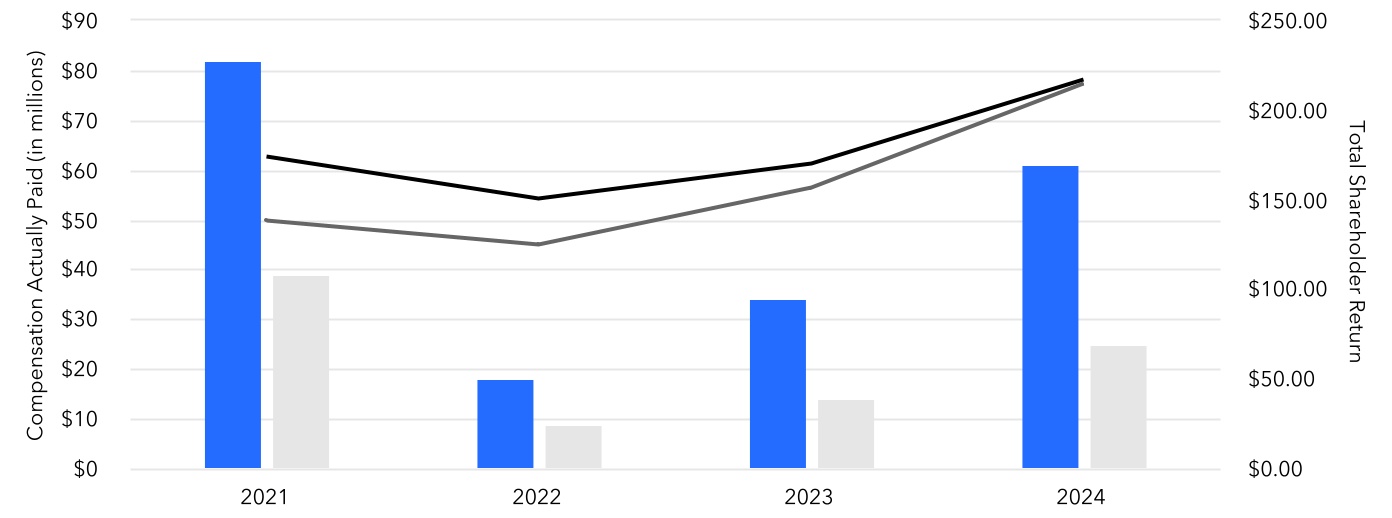

|
CEO Compensation
Actually Paid
|

|
Non-CEO NEO Average Compensation Actually Paid |
 |
TSR |
 |
Peer Group TSR |
||||||||||||||||
Compensation Actually Paid versus Net Income
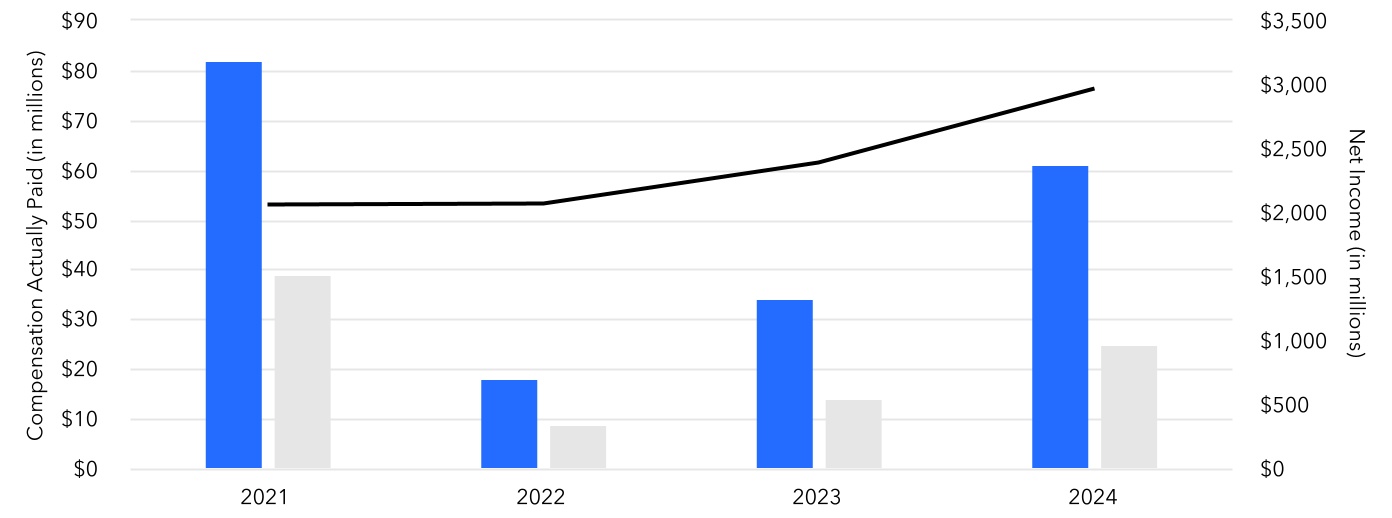

|
CEO Compensation
Actually Paid
|

|
Non-CEO NEO Average Compensation Actually Paid |
 |
Net Income |
||||||||||||
Pay Versus Performance |
Executive Compensation Tables |
INTUIT 2025 Proxy Statement
|
77 |
||||||||
Compensation Actually Paid versus Revenue
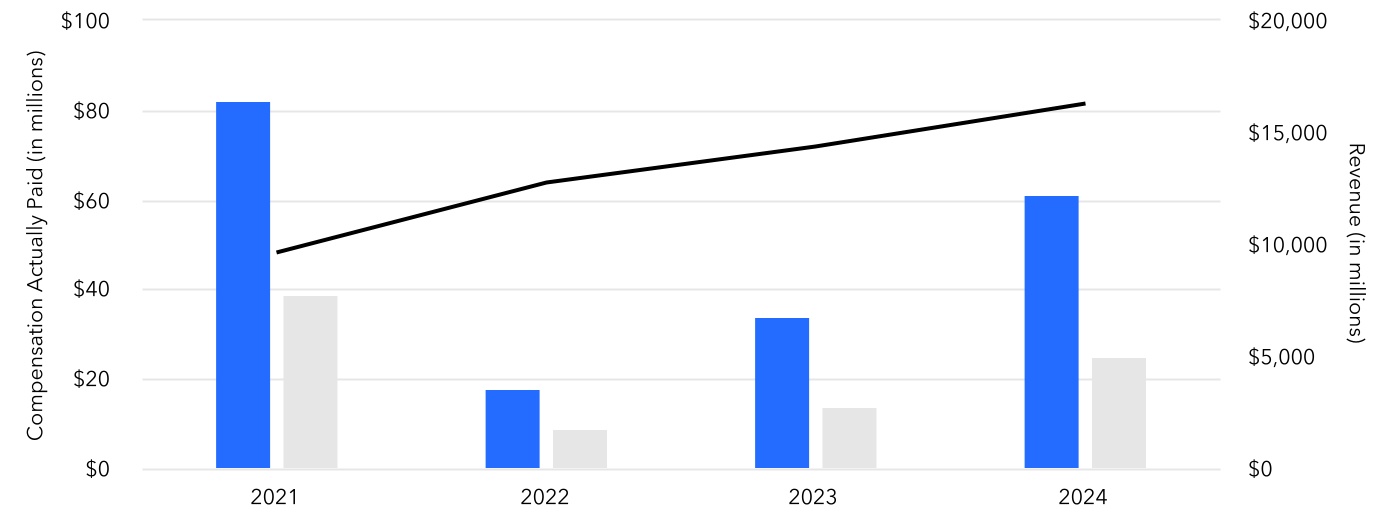

|
CEO Compensation
Actually Paid
|

|
Non-CEO NEO Average Compensation Actually Paid |
 |
Revenue |
||||||||||||
78 |
INTUIT 2025 Proxy Statement
|
Executive Compensation Tables |
Pay Versus Performance |
||||||||
Proposal No. 3 – Ratification of Selection of Independent Registered Public Accounting Firm
Intuit’s Audit and Risk Committee has selected Ernst & Young LLP as the independent registered public accounting firm to perform the audit of Intuit’s consolidated financial statements and the effectiveness of our internal control over financial reporting for the fiscal year ending July 31, 2025. As a matter of good corporate governance, we are asking stockholders to ratify this selection. If the selection of Ernst & Young is not ratified, the Audit and Risk Committee will consider whether it should select another independent registered public accounting firm.
Tenure and Rotation
Ernst & Young has been the company’s independent registered public accounting firm since 1990. In order to support continuing auditor independence, the Audit and Risk Committee periodically considers whether there should be a regular rotation of the independent registered public accounting firm. Additionally, the Audit and Risk Committee is engaged in the selection and mandated rotation of the lead engagement partner from Ernst & Young. The current lead engagement partner was selected during fiscal 2022. The Audit and Risk Committee believes that there are significant benefits to having an independent registered public accounting firm with extensive history with the company. These include the following.
•Higher quality audit work and accounting advice resulting from Ernst & Young’s institutional knowledge of our business and operations, accounting policies and processes, financial systems, and internal control framework
•Operational efficiencies and competitive fees because of Ernst & Young’s history and familiarity with our business
•Continuity and savings of resources and attention required to onboard a new accounting firm
Independence and Performance
The Audit and Risk Committee recognizes the importance of having an outside auditor that is independent both in fact and appearance and, at least annually, evaluates the firm’s independence. In addition, the Audit and Risk Committee takes a number of measures to maintain independence, as described in the Audit and Risk Committee Report.
As provided in its charter, the Audit and Risk Committee performed its annual assessment of Ernst & Young’s performance as our independent auditor during fiscal 2024, the lead audit engagement partner, and the audit team. The Audit and Risk Committee reviewed a number of factors, including the following.
•The quality and candor of Ernst & Young’s communications with the Audit and Risk Committee and management
•How effectively Ernst & Young maintained its independence and employed its independent judgment, objectivity, and professional skepticism
•The level of engagement and value provided by the Ernst & Young national office
•The depth and industry expertise of the Ernst & Young audit team
•The quality of insight demonstrated in Ernst & Young’s review of the company’s assessment of internal control over financial reporting
•Available external data about quality and performance, including Public Company Accounting Oversight Board (“PCAOB”) inspection reports on Ernst & Young, and Ernst & Young’s response to those report
•The appropriateness of Ernst & Young’s fees, taking into account the size and complexity of the company and the resources necessary to perform the audit
•Ernst & Young’s knowledge of our global operations, accounting policies and processes, and internal control over financial reporting
•Ernst & Young’s tenure as the company’s independent auditor and safeguards in place to maintain its independence
Proposal No. 3 – Ratification of Selection of Independent Registered Public Accounting Firm |
INTUIT 2025 Proxy Statement
|
79 |
|||||||||
Accountability to Stockholders
Representatives of Ernst & Young are expected to attend the Meeting virtually. They will have the opportunity to make a statement if they wish, and are expected to be available to respond to appropriate questions from stockholders.
Policy on Pre-Approval of Services
It is the policy of the Audit and Risk Committee to pre-approve, near the beginning of each fiscal year, all audit and permissible non-audit services to be provided by the independent registered public accounting firm during that fiscal year. The Audit and Risk Committee authorizes specific projects within categories of services, subject to a budget for each project. The Audit and Risk Committee also may pre-approve particular services during the fiscal year on a case-by-case basis.
Fees Paid to Ernst & Young
The following table shows fees that we paid (or accrued) for professional services rendered by Ernst & Young for fiscal 2024 and fiscal 2023:
| Fee Category | Fiscal 2024 |
Fiscal 2023 |
||||||||||||
| Audit Fees | $ | 11,544,000 | $ | 9,092,000 | ||||||||||
| Audit-Related Fees | — | 732,000 | ||||||||||||
| Tax Fees | — | 606,000 | ||||||||||||
| All Other Fees | — | — | ||||||||||||
| Total Fees | $ | 11,544,000 | $ | 10,430,000 | ||||||||||
Audit Fees
These fees consist of amounts for professional services rendered in connection with the integrated audit of our financial statements and internal control over financial reporting, review of the interim financial statements included in quarterly reports, and statutory and regulatory filings or engagements.
Audit-Related Fees
Audit-related fees consist of fees for assurance and related services that are reasonably related to the performance of the audit or review of our financial statements, including agreed-upon audit procedures that focus on a specific business process. Intuit paid no audit-related fees to Ernst & Young for fiscal 2024. For fiscal 2023, audit-related fees consisted of fees for due diligence in connection with a business combination, services related to service organization control reports, and services related to ISO 27001 certification.
Tax Fees
Tax fees consist of fees for tax compliance, tax planning, and tax advice. Intuit paid no tax fees to Ernst & Young for fiscal 2024. For fiscal 2023, tax fees consisted of tax services related to various acquisitions and international tax advisory services.
All Other Fees
Intuit paid no other fees to Ernst & Young for fiscal 2024 or fiscal 2023.
For more information about Ernst & Young, see the Audit and Risk Committee Report.

|
The Board recommends that you vote FOR the ratification of the selection of Ernst & Young LLP as our independent registered public accounting firm for the fiscal year ending July 31, 2025.
|
||||||||||
80 |
INTUIT 2025 Proxy Statement
|
Proposal No. 3 - Ratification of Selection of Independent Registered Public Accounting Firm |
||||||
Audit and Risk Committee Report
We, the members of the Audit and Risk Committee, assist the Board in fulfilling its responsibilities by overseeing Intuit’s accounting and financial reporting processes; the qualifications, independence and performance of Intuit’s independent registered public accounting firm; the performance of Intuit’s internal audit department; and Intuit’s internal controls. We also are responsible for selecting, evaluating and setting the compensation of Intuit’s independent registered public accounting firm. Intuit’s management is responsible for the preparation, presentation and integrity of Intuit’s financial statements, including setting accounting and financial reporting principles and designing Intuit’s system of internal control over financial reporting.
The Audit and Risk Committee has selected Ernst & Young as Intuit’s independent registered public accounting firm, with responsibility for performing an independent audit of Intuit’s consolidated financial statements and for expressing opinions on the conformity of Intuit’s audited financial statements with generally accepted accounting principles and the effectiveness of Intuit’s internal control over financial reporting. The Audit and Risk Committee oversees these processes, although members of the Audit and Risk Committee are not engaged in the practice of auditing or accounting.
During the fiscal year ended July 31, 2024, the Audit and Risk Committee carried out the duties and responsibilities as outlined in its charter, including the following specific actions:
•Reviewed and discussed with management and the independent registered public accounting firm Intuit’s quarterly earnings announcements, consolidated financial statements, and related periodic reports filed with the SEC;
•Reviewed with management its assessment of the effectiveness of Intuit’s internal control over financial reporting;
•Reviewed with the independent registered public accounting firm and management the audit scope and plan;
•Reviewed the internal audit plan with the internal auditor; and
•Met in periodic executive sessions with each of the independent registered public accounting firm, representatives of management, and the Chief Audit Executive, who leads internal audit at Intuit.
We reviewed and discussed with management and representatives of Ernst & Young the audited financial statements for the fiscal year ended July 31, 2024, and Ernst & Young’s opinion on the audited financial statements and the effectiveness of Intuit’s internal control over financial reporting. Ernst & Young represented that its presentations included the matters required to be discussed with the Audit and Risk Committee by applicable requirements of the Public Company Accounting Oversight Board (“PCAOB”) and the SEC.
The Audit and Risk Committee recognizes the importance of maintaining the independence of Intuit’s independent registered public accounting firm, both in fact and appearance. Consistent with its charter, the Audit and Risk Committee has made an evaluation and concluded that Ernst & Young is qualified and independent. In addition, the Audit and Risk Committee has received the written disclosures and the letter from Ernst & Young required by applicable requirements of the PCAOB regarding Ernst & Young’s communications with the committee concerning independence and has discussed with Ernst & Young the firm’s independence.
Based on the reports, discussions and review described in this report, and subject to the limitations on our role and responsibilities referred to in this report and in the committee’s charter, we recommended to the Board that the audited financial statements be included in Intuit’s Annual Report on Form 10-K for fiscal 2024 for filing with the SEC.
Audit and Risk Committee Members
Thomas Szkutak (Chair)
Eve Burton
Richard L. Dalzell
Forrest Norrod
Vasant Prabhu
Raul Vazquez
Eric S. Yuan
Audit and Risk Committee Report |
INTUIT 2025 Proxy Statement
|
81 |
||||||
Proposal No. 4 – Approval of an Amendment to Our Certificate of Incorporation to Limit the Liability of Certain Officers in Accordance with Recent Delaware Law Amendments
After careful consideration, our Board has unanimously adopted, declared advisable, and recommends to the company’s stockholders that they approve an amendment to our Restated Certificate of Incorporation (our “Charter”) to provide for the elimination of monetary liability of certain of our officers in certain circumstances (the “Proposed Charter Amendment”).
Consistent with Delaware law, our Charter already eliminates the monetary liability of directors for breaches of the fiduciary duty of care, to the fullest extent permitted by law. In August 2022, the State of Delaware enacted legislation that allows Delaware corporations to amend their certificates of incorporation to eliminate the monetary liability of certain officers for breach of the duty of care, in a manner similar to but more limited than the protection already permitted for directors. This type of protection is commonly referred to as “officer exculpation.” The officers who would be exculpated are: (i) anyone serving as our President, Chief Executive Officer, Chief Operating Officer, Chief Financial Officer, Chief Legal Officer, Chief Accounting Officer, Controller, or Treasurer, (ii) any other named executive officer, and (iii) any other officer who has consented to service of process in Delaware by written agreement.
The Proposed Charter Amendment would exculpate officers only in connection with direct claims brought by stockholders for breaches of the duty of care, but, like the provision limiting monetary liability of directors, would not eliminate or limit liability of officers with respect to any of the following:
•any claims involving breaches of the duty of loyalty to Intuit or our stockholders;
•any claims involving acts or omissions not in good faith or that involve intentional misconduct or a knowing violation of law; or
•any transaction in which the officer derived an improper personal benefit.
Additionally, Delaware law does not permit exculpation of officers in connection with any action brought in the right of Intuit, such as stockholder derivative claims for breaches of the fiduciary duty of care, whereas the company can and does exculpate its directors for these types of claims.
The Board believes it is important to provide protection to officers to the fullest extent permitted by Delaware law to better position Intuit to attract and retain qualified and experienced officers. Extending exculpation protection to officers could prevent or deter protracted or otherwise meritless litigation that distracts from their primary objectives of solving our customers’ most important financial problems and creating stockholder value over the long term. The nature of the role of officers requires them to make decisions on crucial matters, often in response to time-sensitive opportunities and challenges, which can create substantial risk of lawsuits seeking to impose liability with the benefit of hindsight and regardless of merit. The Board believes that aligning the protections available to our officers with those that have long been afforded to our directors would empower the officers to exercise their business judgment in furtherance of stockholder interests without the potential for distraction posed by the risk of personal liability.
In the absence of such protection, such individuals might be deterred from serving as officers due to exposure to personal liability and the risk of incurring substantial expense in defending lawsuits, regardless of merit. Also, other public companies have updated their governing documents to align with this update to Delaware law, and we expect this practice to continue. Therefore, our ability to attract and retain highly qualified officer candidates may be adversely impacted if we do not make similar updates to our Charter.
Taking into account the narrow class and type of claims for which officers would be exculpated, and the benefits our Board believes would accrue to the company and our stockholders, our Board has determined that the Proposed Charter Amendment is in the best interests of the company and its stockholders and unanimously approved the Proposed Charter Amendment, subject to approval by stockholders.
82 |
INTUIT 2025 Proxy Statement
|
Proposal No. 4 – Approval of an Amendment to Our Certificate of Incorporation |
|||||||||
If this proposal is approved by stockholders, Article V of our Charter will be amended to read in its entirety as set forth below (with additions shown as underlined):
To the fullest extent permitted by law, no director or officer of the Company shall be personally liable for monetary damages for breach of fiduciary duty as a director or officer (as applicable). Without limiting the effect of the preceding sentence, if the Delaware General Corporation Law is hereafter amended to authorize the further elimination or limitation of the liability of a director or officer, then the liability of a director or officer of the Company shall be eliminated or limited to the fullest extent permitted by the Delaware General Corporation Law, as so amended.
Neither any amendment nor repeal of this Article V, nor the adoption of any provision of this Certificate of Incorporation inconsistent with this Article V, shall eliminate, reduce or otherwise adversely affect any limitation on the personal liability of a director or officer of the Company existing at the time of such amendment, repeal or adoption of such inconsistent provision.
Approval of this Proposal No. 4 requires the affirmative vote of the majority of the shares of common stock outstanding as of the Record Date entitled to vote on this proposal. Abstentions and broker non-votes will have the same effect as a vote “Against” this proposal.
If this Proposal No. 4 is approved, we intend to file an Amended and Restated Certificate of Incorporation with the Delaware Secretary of State as soon as practicable following the Meeting. Effective upon the filing of such Amended and Restated Certificate of Incorporation with the Delaware Secretary of State, certain of our officers will receive the protections from liability provided by the Proposed Charter Amendment. Our Board reserves the right to elect to abandon the Proposed Charter Amendment at any time before it becomes effective even if it is approved by the stockholders. If this Proposal No. 4 is not approved by the stockholders, then an Amended and Restated Certificate of Incorporation will not be filed with the Delaware Secretary of State, Article V of our Charter will remain unchanged, and certain of our officers will not be entitled to exculpation under Delaware law.

|
The Board recommends that you vote FOR the amendment to our Restated Certificate of Incorporation to provide for the exculpation of officers.
|
||||||||||
Proposal No. 4 – Approval of an Amendment to Our Certificate of Incorporation |
INTUIT 2025 Proxy Statement
|
83 |
||||||
Stock Ownership Information
Security Ownership Table
Unless otherwise indicated below, the following table shows shares of Intuit common stock that we believe are owned as of October 31, 2024 by:
•Each NEO;
•Each director and nominee;
•All current directors and executive officers as a group; and
•Each stockholder beneficially owning more than 5% of our common stock.
Unless indicated in the notes, each stockholder has sole voting and investment power for all shares shown, subject to community property laws that may apply to create shared voting and investment power. Except where a different address appears in the footnotes, the address of each beneficial owner is c/o Intuit Inc., P.O. Box 7850, Mountain View, California 94039-7850.
We calculated the “Percent of Class” based on 280,120,546 shares of common stock outstanding on October 31, 2024. In accordance with SEC regulations, we also include (1) shares subject to options that are currently exercisable or will become exercisable within 60 days of October 31, 2024, and (2) shares issuable upon settlement of RSUs that are vested but unreleased, or will become vested and settled within 60 days of October 31, 2024. Those shares are deemed to be outstanding and beneficially owned by the person holding such option or RSU for the purpose of computing the percentage ownership of that person, but they are not treated as outstanding for the purpose of computing the percentage ownership of any other person.
| Name of Beneficial Owner |
Amount and Nature of
Beneficial Ownership (#)
|
Percent of
Class (%)
|
||||||
| Directors, Director Nominees and Named Executive Officers: | ||||||||
Scott D. Cook(1)
|
6,615,502 | 2.36 | % | |||||
Sasan K. Goodarzi(2)
|
391,338 | * | ||||||
Sandeep S. Aujla(3)
|
14,435 | * | ||||||
Laura A. Fennell(4)
|
114,637 | * | ||||||
Mark Notarainni(5)
|
37,177 | * | ||||||
Marianna Tessel(6)
|
155,474 | * | ||||||
Eve Burton(7)
|
7,844 | * | ||||||
Richard L. Dalzell(8)
|
19,278 | * | ||||||
Deborah Liu(9)
|
8,614 | * | ||||||
Tekedra Mawakana(10)
|
2,379 | * | ||||||
Suzanne Nora Johnson(11)
|
41,733 | * | ||||||
| Forrest Norrod | — | * | ||||||
| Vasant Prabhu | — | * | ||||||
Ryan Roslansky(12)
|
407 | * | ||||||
Thomas Szkutak(13)
|
7,570 | * | ||||||
Raul Vazquez(14)
|
3,958 | * | ||||||
Eric S. Yuan(15)
|
407 | * | ||||||
All current directors and executive officers as a group (20 people)(16)
|
7,531,082 | 2.68 | % | |||||
| 5% Stockholders: | ||||||||
The Vanguard Group(17)
|
25,773,948 | 9.20 | % | |||||
BlackRock, Inc.(18)
|
23,374,934 | 8.34 | % | |||||
84 |
INTUIT 2025 Proxy Statement
|
Stock Ownership Information |
Security Ownership Table |
||||||||
* Indicates ownership of 1% or less.
(1)Represents 6,453,105 shares held by trusts of which Mr. Cook is a trustee or beneficiary and 162,397 shares held by a trust of which an immediate family member of Mr. Cook is a beneficiary.
(2)Includes 294,189 shares issuable upon exercise of options and upon settlement of vested restricted stock units held by Mr. Goodarzi and 97,148 shares held by a trust of which Mr. Goodarzi is a trustee.
(3)Includes 13,983 shares issuable upon exercise of options and upon settlement of vested restricted stock units held by Mr. Aujla.
(4)Includes 61,326 shares issuable upon exercise of options and upon settlement of vested restricted stock units held by Ms. Fennell and 11,695 shares held by a trust of which Ms. Fennell is a trustee.
(5)Includes 33,509 shares issuable upon exercise of options and upon settlement of vested restricted stock units held by Mr. Notarainni.
(6)Includes 115,899 shares issuable upon exercise of options and upon settlement of vested restricted stock units held by Ms. Tessel.
(7)Includes 7,836 shares issuable upon settlement of vested restricted stock units held by Ms. Burton.
(8)Includes 3,708 shares issuable upon settlement of vested restricted stock units held by Mr. Dalzell.
(9)Represents 5,958 shares issuable upon settlement of vested restricted stock units held by Ms. Liu and 2,656 shares held by a trust of which Ms. Liu is a trustee.
(10)Represents 2,379 shares issuable upon settlement of vested restricted stock units by Ms. Mawakana.
(11)Includes 3,140 shares issuable upon settlement of vested restricted stock units held by Ms. Nora Johnson and 24,552 shares held by a trust of which Ms. Nora Johnson is a trustee.
(12)Represents 407 shares issuable upon settlement of vested restricted stock units held by Mr. Roslansky.
(13)Includes 3,964 shares issuable upon settlement of vested restricted stock units held by Mr. Szkutak.
(14)Includes 2,743 shares issuable upon settlement of vested restricted stock units held by Mr. Vazquez.
(15)Represents 407 shares issuable upon settlement of vested restricted stock units held by Mr. Yuan.
(16)Includes 631,008 shares issuable upon exercise of options and upon settlement of vested restricted stock units. Represents shares and options held by the 17 individuals in the table, plus an additional 28,769 outstanding shares and 81,560 shares issuable upon exercise of options and upon settlement of vested restricted stock units held by other executive officers.
(17)Ownership information for The Vanguard Group (“Vanguard”) is based on a Schedule 13G/A filed with the SEC on February 13, 2024 by Vanguard, reporting ownership as of December 29, 2023. Vanguard reported sole voting power as to no shares, shared voting power as to 371,210 shares, sole dispositive power as to 24,576,709 shares, and shared dispositive power as to 1,197,239 shares. The address of Vanguard is 100 Vanguard Blvd., Malvern, Pennsylvania 19355.
(18)Ownership information for BlackRock, Inc. (“BlackRock”) is based on a Schedule 13G/A filed with the SEC on January 24, 2024 by BlackRock, reporting ownership as of December 31, 2023. BlackRock reported sole voting power as to 21,228,896 shares, shared voting power as to no shares, sole dispositive power as to 23,374,934 shares, and shared dispositive power as to no shares. The address of BlackRock is 55 East 52nd Street, New York, New York 10055.
Delinquent Section 16(a) Reports
Section 16(a) of the Exchange Act requires Intuit’s directors, executive officers, and greater-than-10% stockholders to file forms with the SEC to report their ownership of Intuit shares and any changes in ownership. We have reviewed all forms filed electronically with the SEC. Based on that review and on written information given to us by our executive officers and directors, we believe that all of our directors and executive officers filed the required reports on a timely basis under Section 16(a) during fiscal 2024, except for (i) the inadvertent late reporting on October 3, 2024 by Mr. Aujla of the acquisition of 14.42 shares of Intuit common stock and (ii) the inadvertent late reporting on November 4, 2024 by Ms. Burton of the acquisition of 8.427 shares of Intuit common stock, in each case, that were acquired pursuant to the reinvestment of dividends.
Delinquent Section 16(a) Reports |
Stock Ownership Information |
INTUIT 2025 Proxy Statement
|
85 |
||||||||
Information About the Meeting, Voting, and Proxies
Date, Time, and Place of Meeting
We are holding the Meeting on Thursday, January 23, 2025, at 8:00 a.m. Pacific Standard Time. The Meeting will occur as a virtual meeting conducted exclusively via a live audio webcast at www.virtualshareholdermeeting.com/INTU2025. There will not be a physical location for the Meeting. We believe our virtual format offers stockholders the same opportunities to participate as an in-person meeting. The virtual format enhances the experience because we can provide consistent opportunities for engagement to all stockholders, regardless of their geographic location. To participate in the Meeting, including to vote and submit questions, stockholders of record will need to log in using the control number on their Notice of Internet Availability or proxy card. You may log into the Meeting website beginning at 7:45 a.m. Pacific Standard Time. Street-name holders who receive a Notice of Internet Availability or voting instruction form indicating that they may vote those shares through the www.proxyvote.com website may access, participate in and vote at the Meeting using the control number indicated on that Notice of Internet Availability or voting instruction form. Otherwise, street-name holders should contact their bank, broker, or other nominee (preferably at least five days before the Meeting) and obtain a “legal proxy” in order to be able to attend, participate in, or vote at the Meeting.
A recording of the webcast will be available on our investor relations website for at least 60 days following the Meeting.
If you lost your control number or are not a stockholder, you will be able to attend the Meeting by visiting www.virtualshareholdermeeting.com/INTU2025 and registering as a guest. However, in this case, you will not be able to vote or submit questions.
Asking Questions at the Meeting
If you wish to submit a question during the Meeting, you must log into www.virtualshareholdermeeting.com/INTU2025 using the control number on your Notice of Internet Availability, proxy card or voting instruction form and follow the instructions on the Meeting website. During the Meeting, we will answer questions relevant to Meeting matters that comply with the meeting rules of conduct, subject to time constraints. We reserve the right to exclude questions that are not relevant to meeting matters, are irrelevant to the business of the company, are derogatory or in bad taste, relate to pending or threatened litigation, are personal grievances or are otherwise inappropriate (as determined by the Chair of the Meeting). Questions relevant to Meeting matters that we do not have time to answer during the Meeting will be posted to our website as soon as practicable following the Meeting. If you have an individual concern that is not of general concern to all stockholders, or if a question posed was not otherwise answered, contact Intuit Investor Relations at investor_relations@intuit.com. Additional information regarding the question and answer process, including the types and number of questions permitted and how questions will be addressed and disclosed, will be available in the Meeting rules of conduct, which will be posted at the virtual Meeting website during the Meeting.
If You Have Technical Problems
We will have technicians ready to assist you with any technical difficulties. If you have trouble accessing or checking in to the virtual Meeting or otherwise during the Meeting, call the technical support number that will be posted on the virtual meeting platform log-in page.
Internet Availability of Proxy Materials
We are pleased to furnish proxy materials to our stockholders on the internet, rather than mailing individual printed copies of those materials. If you received a Notice of Internet Availability of Proxy Materials (“Notice of Internet Availability”) by mail, you will not receive a printed copy of the proxy materials unless you request one. Instead, the Notice of Internet Availability will explain how you may access and review the proxy materials and cast your vote online. We encourage stockholders to take advantage of the availability of the proxy materials on the internet to help reduce the environmental impact of the Meeting.
The Notice of Internet Availability contains instructions for requesting printed copies of our proxy materials.
86 |
INTUIT 2025 Proxy Statement
|
Information About the Meeting, Voting, and Proxies |
|||||||||
Record Date, Outstanding Shares, and Quorum
Only holders of record of Intuit common stock at the close of business on November 25, 2024 (the “Record Date”) will be entitled to vote at the Meeting. Each share of Intuit common stock is entitled to one vote for each director nominee and one vote for each of the other proposals. On the Record Date, we had approximately 279,916,784 shares of common stock outstanding and entitled to vote. In order to have a quorum, a majority of the shares of our common stock entitled to vote on the Record Date must be present at the Meeting, either in person or by proxy. Abstentions and broker non-votes will be counted as “present” in determining whether we have a quorum.
If a quorum is not present at the scheduled time of the Meeting, the Chair of the Meeting, or the holders of a majority of the shares entitled to vote who are present, in person or by proxy, at the Meeting may adjourn or recess the Meeting. The individuals named as proxies would typically exercise their authority to vote in favor of adjournment.
For 10 days prior to the Meeting date, a list of registered stockholders eligible to vote at the Meeting will be available for review. If you would like to view the stockholder list, contact Intuit Investor Relations at investor_relations@intuit.com.
How to Know if You’re a Stockholder of Record or a Beneficial Owner of Shares Held in Street Name
Stockholder of record (also known as a record holder). If your shares are registered directly in your name with Intuit’s transfer agent, Equiniti Trust Company, LLC, you are considered the stockholder of record with respect to those shares, and the Notice of Internet Availability was sent directly to you by Intuit. If you request printed copies of the proxy materials by mail, you also will receive a proxy card.
Beneficial owner of shares held in street name. If your shares are held on your behalf by a broker, bank, or other nominee, then you are the beneficial owner of shares held in “street name.” Your nominee, which is considered the stockholder of record for purposes of voting at the Meeting, may forward you the Notice of Internet Availability or send you a voting instruction form containing instructions that you must follow in order for your shares to be voted. As a beneficial owner, you have the right to instruct your nominee on how to vote the shares held in your account. If you do not provide specific voting instructions, your nominee is not permitted to vote on certain proposals and may elect not to vote on any of the proposals. Therefore, unless you provide specific voting instructions, your shares may not be represented or voted at the Meeting.
Information About the Meeting, Voting, and Proxies |
INTUIT 2025 Proxy Statement
|
87 |
|||||||||
Required Vote
The table below shows the voting options, voting requirement, and effect of abstentions and broker non-votes for each proposal to be presented at the Meeting.
| Proposal | Voting Options |
Board
Recommendation
|
Vote Required to Adopt
the Proposal
|
Effect of
Abstentions
|
Effect of
“Broker
Non-Votes”(1)
|
||||||||||||
1. Election of 13 directors |
For, against or abstain on each nominee |
FOR (all nominees) |
A nominee for director will be elected if the votes cast for such nominee exceed the votes cast against such nominee |
No effect | No effect | ||||||||||||
2. Advisory vote to approve Intuit’s executive compensation (say-on-pay) |
For, against or abstain |
FOR | The affirmative vote of a majority of the shares of common stock present or represented at the Meeting and voted for or against the proposal |
No effect | No effect | ||||||||||||
3. Ratification of selection of Ernst & Young LLP as Intuit’s independent registered public accounting firm |
For, against or abstain |
FOR | The affirmative vote of a majority of the shares of common stock present or represented at the Meeting and voted for or against the proposal |
No effect | No effect | ||||||||||||
4. Approval of an amendment to our Certificate of Incorporation to limit the liability of certain officers in accordance with recent Delaware law amendments |
For, against or abstain |
FOR | The affirmative vote of a majority of the shares of common stock outstanding as of the Record Date and entitled to vote thereon |
Against |
Against |
||||||||||||
(1)If you hold your shares in street name and do not provide voting instructions to the broker, bank, or other nominee that holds your shares, the nominee is not permitted to vote on certain proposals and may elect to not vote on any of the proposals. When a nominee is not permitted or chooses not to vote on a proposal, it will result in a “broker non-vote” for that proposal. See Voting and Revoking Proxies below.
88 |
INTUIT 2025 Proxy Statement
|
Information About the Meeting, Voting, and Proxies |
|||||||||
Voting and Revoking Proxies
The Board is soliciting proxies to vote your shares at the Meeting. Please act as soon as possible to vote your shares, even if you plan to attend the Meeting virtually. All stockholders of record have three options for submitting their vote prior to the Meeting, as described in the Notice of Internet Availability:
•online before the meeting at www.proxyvote.com;
•by phone at the telephone number shown on your proxy card; or
•by requesting, completing, and mailing in a paper proxy card.
We encourage you to vote via the internet.
If your shares are held on your behalf by a broker, bank, or other nominee, you may vote as described above in the section Date, Time and Place of Meeting. However, if your shares are held on your behalf by a broker, bank, or other nominee and you do not plan to participate in the Meeting, you must instruct your nominee how to vote the shares held in your account. Some nominees enable you to do this online or by telephone. If you do not provide voting instructions, the nominee is not permitted to vote on certain proposals and may elect not to vote on any of the proposals. When a nominee is not permitted or chooses not to vote on a proposal, it will result in a so-called “broker non-vote.” Whether the broker, bank, or other nominee that holds your shares has discretionary authority to vote on a proposal without receiving your voting instructions is subject to stock exchange rules and final determination by the stock exchange.
If you are a stockholder of record and you sign and return your proxy card but do not give any instructions on how you would like to vote your shares, your shares will be voted in favor of the election of each of the director nominees listed in Proposal 1, and in favor of Proposals 2, 3, and 4. As far as we know, no other matters will be presented at the Meeting. However, if any other matters of business are properly presented, the proxy holders named on your proxy card are authorized to vote your shares according to their judgment.
Whether you submit your proxy online, by phone or by mail, you may revoke it at any time before voting takes place at the Meeting. If you are the record holder of your shares and you wish to revoke your proxy, you must deliver instructions to: Kerry J. McLean, Corporate Secretary, at Intuit Inc., P.O. Box 7850, Mail Stop 2700, Mountain View, California 94039-7850. You also may revoke a proxy by submitting a later-dated vote, whether electronically at the virtual Meeting or before it, via the Internet, by phone, or by mail. If a broker, bank, or other nominee is the record holder of your shares and you wish to revoke your proxy, you must contact the record holder of your shares directly or participate in the Meeting and electronically vote your shares during the Meeting.
Soliciting Proxies
Intuit will pay all expenses of soliciting proxies to be voted at the Meeting. After the proxies are initially distributed, Intuit or its agents also may solicit proxies by mail, electronic mail, telephone, or in person. We have hired a proxy solicitation firm, Innisfree M&A Incorporated, to assist us in soliciting proxies. We will pay Innisfree a fee of $10,000 plus their expenses, which we estimate will be approximately $1,000. We will ask brokers, custodians, nominees, and other record holders to prepare and send a Notice of Internet Availability to people or entities for whom they hold shares and to forward copies of the proxy materials to beneficial owners who request paper copies.
Voting Results
We intend to announce the preliminary voting results at the Meeting. The final voting results will be tallied by our Inspector of Elections and published in a Current Report on Form 8-K that we expect to file within four business days of the Meeting. If final voting results are not available to us in time to file a Form 8-K within four business days after the Meeting, we intend to file a Form 8-K to disclose preliminary voting results and then, within four business days after the final results are known, file an additional Form 8-K to disclose the final voting results.
Annual Report on Form 10-K and Additional Materials
The Notice of 2025 Annual Meeting of Stockholders, this proxy statement and our Annual Report on Form 10-K for the fiscal year ended July 31, 2024, have been made available to all stockholders entitled to vote at the Meeting and who received the Notice of Internet Availability. The Annual Report on Form 10-K can be viewed at https://investors.intuit.com/sec-filings/annual-reports.
Information About the Meeting, Voting, and Proxies |
INTUIT 2025 Proxy Statement
|
89 |
|||||||||
You can obtain a paper copy of our Annual Report on Form 10-K (excluding exhibits) for the fiscal year ended July 31, 2024, without charge by writing to Investor Relations at investor_relations@intuit.com or Intuit Inc., P.O. Box 7850, Mail Stop 2700, Mountain View, California, 94039-7850. For faster delivery, we suggest that any communications be made via email.
Delivery of Voting Materials to Stockholders Sharing an Address
To reduce the expense and waste of delivering duplicate materials to stockholders sharing the same address, we have adopted a procedure approved by the SEC called “householding.” Under this procedure, certain stockholders of record who have the same address and last name and do not participate in electronic delivery of proxy materials will receive only one copy of the Notice of Internet Availability, Annual Report on Form 10-K, and proxy materials, as applicable, until such time as one or more of these stockholders notifies us that they wish to receive individual copies. Householding reduces duplicate mailings and saves printing costs and postage fees, as well as natural resources. If your shares are held in street name, your broker, bank, or other nominee similarly may deliver only one copy of the Notice of Internet Availability, Annual Report on Form 10-K, and proxy materials, as applicable, to multiple stockholders who share an address.
If you received a householded mailing this year, and you would like to have additional copies of our Notice of Internet Availability, Annual Report on Form 10-K, or proxy materials, as applicable, mailed to you, please submit your request to Investor Relations at investor_relations@intuit.com or Intuit Inc., P.O. Box 7850, Mail Stop 2700, Mountain View, California, 94039-7850, or call (650)-944-6000 to request additional copies and we will deliver these materials to you promptly. You also may contact us at this email address if you received multiple copies of the proxy materials and would prefer to receive a single copy in the future. If you would like to opt out of “householding” for future mailings, send a written request to Investor Relations or call (650)-944-6000, as described above.
Stockholder Proposals and Nominations for the 2026 Annual Meeting of Stockholders
Any stockholder who intends to present a proposal for inclusion in Intuit’s 2026 proxy statement and form of proxy pursuant to Rule 14a-8 under the Exchange Act must submit the proposal, in writing, so that the Corporate Secretary receives it at our principal executive offices by the close of business (5:00 p.m. Pacific Time) on July 30, 2025. Such proposals also must comply with Rule 14a-8 under the Exchange Act and any other applicable SEC guidance relating to stockholder proposals.
Any stockholder who wishes to put a proposal or a Board nomination (including nominations for which the stockholder intends to solicit proxies pursuant to Rule 14a-19) before the 2026 Annual Meeting of Stockholders, without including such proposal or nomination in Intuit’s 2026 proxy statement, must provide written notice of the proposal or nomination to Intuit’s Corporate Secretary, at our principal executive offices, between the close of business on October 10, 2025, and the close of business on November 9, 2025. However, in the event that the 2026 Annual Meeting of Stockholders is to be held on a date that is more than 30 days before or 60 days after January 23, 2026 (the anniversary date of the Meeting) or if the 2025 Annual Meeting does not take place, then such notice must be delivered between the close of business on the 105th day prior to the date of the 2026 Annual Meeting of Stockholders and the close of business on the later of (i) the 75th day prior to the date of the 2026 Annual Meeting of Stockholders, and (ii) the 10th day following the day on which public announcement of the date of the 2026 Annual Meeting of Stockholders is first made by us. For these purposes, “close of business” means 5:00 p.m. local time at our principal executive offices of the company on any calendar day, whether or not the day is a business day. In addition, stockholders must comply with the other procedural requirements in our bylaws (which includes information required under Rule 14a-19) and any such proposal must be a proper matter for stockholder action under applicable law.
Our bylaws provide that, under certain circumstances, stockholders may include director candidates that they have nominated in our proxy statement. These proxy access provisions permit a stockholder, or a group of up to 20 stockholders, who have owned 3% or more of Intuit’s outstanding shares continuously for at least three years to submit director nominees (for the greater of two directors or up to 20% of our Board) for inclusion in our proxy materials, as long as the stockholder(s) provide timely written notice of such nomination and the stockholder(s) and nominee(s) satisfy the requirements specified in our bylaws. Notice of director nominees must include the information required under our bylaws and must be received by our Corporate Secretary at our principal executive offices between the close of business on July 15, 2025, and the close of business on August 14, 2025, unless the date of the 2026 Annual Meeting of Stockholders has been changed by more than 30 days from January 23, 2026 or if the 2025 Annual Meeting does not take place. In that case, such notice must be delivered between the close of business on the 135th day prior to the date of the 2026 Annual Meeting of Stockholders and the close of business on the later of (i) the 105th day prior to the date of the 2026 Annual Meeting of Stockholders and (ii) the 10th day following the day on which public announcement of the date of the 2026 Annual Meeting of Stockholders is first made by us.
Our stockholders can find our bylaws on our website at http://investors.intuit.com/corporate-governance/conduct-and-guidelines/default.aspx or on file with the SEC. The Chair of the Meeting may refuse to acknowledge or introduce any stockholder proposal or nomination if notice thereof is not received within the applicable deadlines or does not comply with the bylaws. If a stockholder fails to meet these deadlines or fails to satisfy the requirements of SEC Rule 14a-4, as applicable (or, in some cases, even if the stockholder meets these deadlines and requirements), the individuals named as proxies will be allowed to use their discretionary voting authority to vote on any such proposal or nomination as they determine appropriate if and when the matter is raised at the Meeting. We reserve the right to reject, rule out of order, or take other appropriate action with respect to any director nomination or proposal that does not comply with these and other applicable requirements.
90 |
INTUIT 2025 Proxy Statement
|
Information About the Meeting, Voting, and Proxies |
|||||||||
APPENDIX A
Non-GAAP Financial Measures
The Proxy Summary and the Compensation Discussion and Analysis of the proxy statement contain two non-GAAP financial measures for the fiscal years ended July 31, 2024 and 2023 – non-GAAP operating income and non-GAAP earnings per share (“EPS”). The table on page A-3 of this proxy statement reconciles the non-GAAP financial measures in the Proxy Summary and Compensation Discussion and Analysis to the most directly comparable financial measures prepared in accordance with Generally Accepted Accounting Principles (“GAAP”).
Non-GAAP financial measures should not be considered as a substitute for, or superior to, measures of financial performance prepared in accordance with GAAP. These non-GAAP financial measures do not reflect a comprehensive system of accounting, differ from GAAP measures with the same names, and may differ from non-GAAP financial measures with the same or similar names that are used by other companies.
We compute non-GAAP financial measures using the same consistent method from quarter to quarter and year to year. We may consider whether other significant items that arise in the future should be excluded from our non-GAAP financial measures. Beginning with the fourth quarter of fiscal 2024, we exclude from our non-GAAP measures restructuring charges, as described below. There were no restructuring charges in any prior period presented.
We exclude the following items from all of our non-GAAP financial measures:
•Amortization of acquired technology
•Amortization of other acquired intangible assets
•Restructuring charges
•Share-based compensation expense
•Goodwill and intangible asset impairment charges
•Gains and losses on disposals of businesses and long-lived assets
•Professional fees and transaction costs for business combinations
We also exclude the following items from non-GAAP net income and non-GAAP diluted net income per share:
•Gains and losses on debt securities and other investments
•Income tax effects and adjustments
•Discontinued operations
We believe these non-GAAP financial measures provide meaningful supplemental information regarding Intuit’s operating results primarily because they exclude amounts that we do not consider part of ongoing operating results when planning and forecasting and when assessing the performance of the organization, our individual operating segments, or our senior management. Segment managers are not held accountable for share-based compensation expense, amortization, restructuring, or the other excluded items and, accordingly, we exclude these amounts from our measures of segment performance. We believe our non-GAAP financial measures also facilitate the comparison by management and investors of results for current periods and guidance for future periods with results for past periods.
The following are descriptions of the items we exclude from our non-GAAP financial measures.
Amortization of acquired technology and amortization of other acquired intangible assets. When we acquire a business in a business combination, we are required by GAAP to record the fair values of the intangible assets of the business and amortize them over their useful lives. Amortization of acquired technology in cost of revenue includes amortization of software and other technology assets of acquired businesses. Amortization of other acquired intangible assets in operating expenses includes amortization of assets such as customer lists and trade names.
Restructuring charges. This consists of costs incurred as a direct result of discrete strategic restructuring actions, including, but not limited to severance and other one-time termination benefits, and other costs, which are different in terms of size, strategic nature, and frequency than ongoing productivity and business improvements.
Share-based compensation expense. This consists of non-cash expenses for stock options, restricted stock units, and our Employee Stock Purchase Plan. When considering the impact of equity awards, we place greater emphasis on overall shareholder dilution rather than the accounting charges associated with those awards.
Appendix A |
INTUIT 2025 Proxy Statement
|
A-1 |
|||||||||
Goodwill and intangible asset impairment charges. We exclude from our non-GAAP financial measures non-cash charges to adjust the carrying values of goodwill and other acquired intangible assets to their estimated fair values.
Gains and losses on disposals of businesses and long-lived assets. We exclude from our non-GAAP financial measures gains and losses on disposals of businesses and long-lived assets because they are unrelated to our ongoing business operating results.
Professional fees and transaction costs for business combinations. We exclude from our non-GAAP financial measures the professional fees we incur to complete business combinations. These include investment banking, legal, and accounting fees.
Gains and losses on debt securities and other investments. We exclude from our non-GAAP financial measures credit losses on available-for-sale debt securities and gains and losses on other investments.
Income tax effects and adjustments. We use a long-term non-GAAP tax rate for evaluating operating results and for planning, forecasting, and analyzing future periods. This long-term non-GAAP tax rate excludes the income tax effects of the non-GAAP pre-tax adjustments described above, and eliminates the effects of non-recurring and period specific items which can vary in size and frequency. Based on our long-term projections, we are using a long-term non-GAAP tax rate of 24% for fiscal 2023 and fiscal 2024. This long-term non-GAAP tax rate could be subject to change for various reasons including significant acquisitions, changes in our geographic earnings mix, or fundamental tax law changes in major jurisdictions in which we operate. We will evaluate this long-term non-GAAP tax rate on an annual basis and whenever any significant events occur which may materially affect this rate.
Operating results and gains and losses on the sale of discontinued operations. From time to time, we sell or otherwise dispose of selected operations as we adjust our portfolio of businesses to meet our strategic goals. In accordance with GAAP, we segregate the operating results of discontinued operations as well as gains and losses on the sale of these discontinued operations from continuing operations on our GAAP statements of operations but continue to include them in GAAP net income or loss and net income or loss per share. We exclude these amounts from our non-GAAP financial measures.
A-2 |
INTUIT 2025 Proxy Statement
|
Appendix A |
|||||||||
INTUIT INC.
RECONCILIATION OF NON-GAAP FINANCIAL MEASURES TO MOST DIRECTLY COMPARABLE GAAP FINANCIAL MEASURES
| Fiscal Year Ended | ||||||||||||||
| (In millions, except per share amounts, unaudited) | July 31, 2024 | July 31, 2023 | ||||||||||||
| GAAP operating income | $ | 3,630 | $ | 3,141 | ||||||||||
| Amortization of acquired technology | 146 | 163 | ||||||||||||
| Amortization of other acquired intangible assets | 483 | 483 | ||||||||||||
Restructuring (1)
|
223 | — | ||||||||||||
| Professional fees for business combinations | 5 | 4 | ||||||||||||
| Share-based compensation expense | 1,915 | 1,712 | ||||||||||||
| Non-GAAP operating income | $ | 6,402 | $ | 5,503 | ||||||||||
| GAAP net income | $ | 2,963 | $ | 2,384 | ||||||||||
| Amortization of acquired technology | 146 | 163 | ||||||||||||
| Amortization of other acquired intangible assets | 483 | 483 | ||||||||||||
Restructuring (1)
|
223 | — | ||||||||||||
| Professional fees for business combinations | 5 | 4 | ||||||||||||
| Share-based compensation expense | 1,915 | 1,712 | ||||||||||||
Net loss on debt securities and other investments |
— | 9 | ||||||||||||
Loss on disposal of a business |
9 | 8 | ||||||||||||
| Income tax effects and adjustments | (933) | (683) | ||||||||||||
| Non-GAAP net income | $ | 4,811 | $ | 4,080 | ||||||||||
| GAAP diluted net income per share | $ | 10.43 | $ | 8.42 | ||||||||||
| Amortization of acquired technology | 0.51 | 0.57 | ||||||||||||
| Amortization of other acquired intangible assets | 1.70 | 1.71 | ||||||||||||
Restructuring |
0.79 | — | ||||||||||||
| Professional fees for business combinations | 0.02 | 0.01 | ||||||||||||
| Share-based compensation expense | 6.75 | 6.05 | ||||||||||||
Net loss on debt securities and other investments |
— | 0.03 | ||||||||||||
Loss on disposal of a business |
0.03 | 0.03 | ||||||||||||
| Income tax effects and adjustments | (3.29) | (2.42) | ||||||||||||
| Non-GAAP diluted net income per share | $ | 16.94 | $ | 14.40 | ||||||||||
| Shares used in diluted per share calculations | 284 | 283 | ||||||||||||
(1)Restructuring charges for the fiscal year ended July 31, 2024 includes $25 million in share-based compensation expense.
Appendix A |
INTUIT 2025 Proxy Statement
|
A-3 |
|||||||||
